
151+ Public Health Research Topics [Updated 2024]
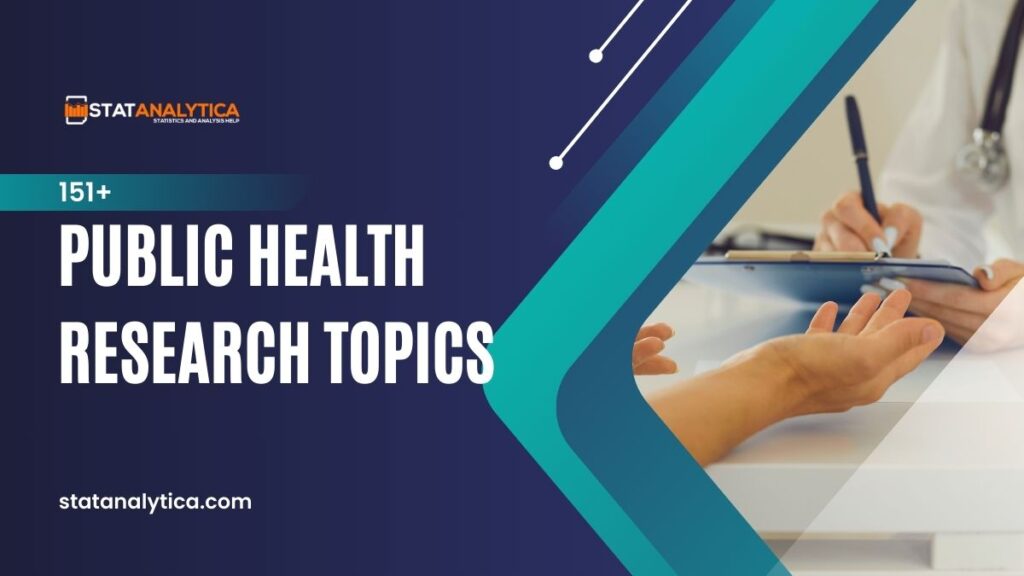
The important area of public health research is essential to forming laws, influencing medical procedures, and eventually enhancing community well-being. As we delve into the vast landscape of public health research topics, it’s essential to understand the profound impact they have on society.
This blog aims to provide a comprehensive guide to selecting and understanding the diverse array of public health research topics.
Overview of Public Health Research Topics
Table of Contents
Public health research encompasses a wide range of subjects, reflecting the interdisciplinary nature of the field. From epidemiology and health policy to environmental health and infectious diseases, researchers navigate through various dimensions to address complex health challenges.
Each category holds its own significance, contributing to the overall understanding of public health dynamics.
Key Considerations in Selecting Public Health Research Topics
- Current Relevance: Assess the timeliness of potential topics by considering recent health trends, emerging issues, and societal concerns.
- Impact on Public Health: Evaluate the potential impact of the research on improving health outcomes, addressing disparities, or influencing policy and interventions.
- Feasibility and Resources: Gauge the practicality of conducting research on a particular topic, considering available resources, data accessibility, and research infrastructure.
- Ethical Considerations: Scrutinize the ethical implications of the research, ensuring it aligns with ethical standards and guidelines, especially when dealing with vulnerable populations or sensitive topics.
Top 151+ Public Health Research Topics
Epidemiology.
- The Impact of Social Determinants on Disease Outcomes
- Patterns and Trends in Emerging Infectious Diseases
- Investigating Health Disparities among Different Ethnic Groups
- Childhood Obesity and its Long-Term Health Consequences
- Assessing the Effectiveness of Contact Tracing in Disease Control
Health Policy
- Universal Healthcare: Comparative Analysis of Global Models
- The Role of Telemedicine in Improving Healthcare Access
- Evaluating Mental Health Policies and Their Impact on Communities
- Assessing the Impact of Affordable Care Act on Public Health
- Vaccine Policies and Public Perception: A Comprehensive Study
Environmental Health
- Climate Change and Health: Adapting to the Challenges
- Air Quality and Respiratory Health in Urban Environments
- Waterborne Diseases and Strategies for Safe Water Supply
- Occupational Health Hazards: A Comprehensive Workplace Analysis
- The Impact of Green Spaces on Mental Health in Urban Areas
Infectious Diseases
- Antimicrobial Resistance: Strategies for Mitigation
- Vaccination Strategies and Herd Immunity
- Global Health Security: Preparedness for Pandemics
- The Impact of Vector-Borne Diseases on Public Health
- Emerging Trends in Antibiotic-Resistant Infections
Chronic Diseases
- Lifestyle Interventions for Preventing Cardiovascular Diseases
- Genetic Factors in the Development of Cancer: A Comprehensive Study
- Aging and Health: Addressing the Healthcare Needs of the Elderly
- Diabetes Prevention Programs: Efficacy and Implementation
- Mental Health in Chronic Disease Patients: Bridging the Gap
Maternal and Child Health
- Maternal Mortality: Understanding Causes and Prevention
- The Impact of Breastfeeding on Infant Health and Development
- Childhood Immunization: Barriers and Strategies for Improvement
- Teenage Pregnancy and Its Long-Term Health Consequences
- Mental Health Support for Postpartum Women: Current Gaps and Solutions
Health Behavior and Promotion
- Smoking Cessation Programs: Effectiveness and Challenges
- Physical Activity Promotion in Schools: Strategies for Success
- Nutrition Education and Its Impact on Healthy Eating Habits
- Mental Health Awareness Campaigns: Assessing Public Perceptions
- The Role of Social Media in Health Promotion
Global Health
- Assessing the Impact of International Aid on Global Health
- Water, Sanitation, and Hygiene (WASH) Programs in Developing Countries
- The Role of Non-Governmental Organizations in Global Health
- Communicable Disease Control in Refugee Populations
- Global Access to Essential Medicines: Challenges and Solutions
Community Health
- Community-Based Participatory Research: Best Practices and Challenges
- The Impact of Community Health Workers on Health Outcomes
- Health Literacy and its Relationship to Health Disparities
- Assessing the Effectiveness of Mobile Health (mHealth) Interventions
- Community Resilience in the Face of Public Health Crises
Healthcare Quality and Patient Safety
- Hospital-Acquired Infections: Strategies for Prevention
- Patient Safety Culture in Healthcare Organizations
- Quality Improvement Initiatives in Primary Care Settings
- Healthcare Accreditation: Impact on Patient Outcomes
- Implementing Electronic Health Records: Challenges and Benefits
Mental Health
- Stigma Reduction Programs for Mental Health Disorders
- Integrating Mental Health into Primary Care Settings
- The Impact of COVID-19 on Mental Health: Long-Term Implications
- Mental Health in the Workplace: Strategies for Employee Well-being
- Suicide Prevention Programs: Effectiveness and Outreach
Health Disparities
- Racial Disparities in Healthcare: Addressing Systemic Inequities
- LGBTQ+ Health Disparities and Inclusive Healthcare Practices
- Socioeconomic Status and Access to Healthcare Services
- Geographical Disparities in Health: Rural vs. Urban
- The Impact of Gender on Health Outcomes and Access to Care
Public Health Education
- Evaluation of Public Health Education Programs
- Innovative Approaches to Teaching Public Health Concepts
- Online Health Education Platforms: Opportunities and Challenges
- Interdisciplinary Training in Public Health: Bridging Gaps
- Continuing Education for Public Health Professionals: Current Landscape
Digital Health
- The Role of Wearable Devices in Health Monitoring
- Telehealth Adoption: Barriers and Opportunities
- Health Apps for Chronic Disease Management: User Perspectives
- Blockchain Technology in Healthcare: Privacy and Security Implications
- Artificial Intelligence in Disease Diagnosis and Prediction
Health Economics
- Cost-Effectiveness of Preventive Health Interventions
- The Impact of Healthcare Financing Models on Access to Care
- Pharmaceutical Pricing and Access to Essential Medicines
- Economic Evaluation of Health Promotion Programs
- Health Insurance Coverage and Health Outcomes: A Global Perspective
Innovations in Public Health
- 3D Printing in Healthcare: Applications and Future Prospects
- Gene Editing Technologies and their Ethical Implications
- Smart Cities and Public Health: Integrating Technology for Well-being
- Nanotechnology in Medicine: Potential for Disease Treatment
- The Role of Drones in Public Health: Surveillance and Intervention
Food Safety and Nutrition
- Foodborne Illness Outbreaks: Investigating Causes and Prevention
- Sustainable Food Systems: Implications for Public Health
- Nutritional Interventions for Malnutrition in Developing Countries
- Food Labeling and Consumer Understanding: A Critical Review
- The Impact of Fast Food Consumption on Public Health
Substance Abuse
- Opioid Epidemic: Strategies for Prevention and Treatment
- Harm Reduction Approaches in Substance Abuse Programs
- Alcohol Consumption Patterns and Public Health Outcomes
- Smoking and Mental Health: Exploring the Connection
- Novel Psychoactive Substances: Emerging Threats and Strategies
Occupational Health
- Workplace Stress and Mental Health: Intervention Strategies
- Occupational Hazards in Healthcare Professions: A Comparative Analysis
- Ergonomics in the Workplace: Improving Worker Health and Productivity
- Night Shift Work and Health Consequences: Addressing Challenges
- Occupational Health and Safety Regulations: A Global Overview
Disaster Preparedness and Response
- Pandemic Preparedness and Lessons from COVID-19
- Natural Disasters and Mental Health: Post-Traumatic Stress
- Emergency Response Systems: Improving Timeliness and Efficiency
- Communicating Health Risks During Emergencies: Public Perception
- Collaborative Approaches to Disaster Response in Global Health
Cancer Research
- Precision Medicine in Cancer Treatment: Current Advancements
- Cancer Screening Programs: Efficacy and Challenges
- Environmental Factors and Cancer Risk: Exploring Connections
- Survivorship Care Plans: Enhancing Quality of Life after Cancer
- Integrative Therapies in Cancer Care: Complementary Approaches
Sexual and Reproductive Health
- Access to Contraception in Developing Countries: Challenges and Solutions
- Comprehensive Sex Education Programs: Impact on Teen Pregnancy
- Reproductive Health Rights: Global Perspectives and Challenges
- Infertility Treatment: Ethical Considerations and Societal Impact
- Maternal and Child Health in Conflict Zones: Addressing Challenges
Cardiovascular Health
- Hypertension Prevention Programs: Strategies and Effectiveness
- Cardiovascular Disease in Women: Gender-Specific Risk Factors
- Innovations in Cardiac Rehabilitation Programs
- Artificial Heart Technology: Advancements and Ethical Implications
- Impact of Air Pollution on Cardiovascular Health: A Global Concern
Social Determinants of Health
- Educational Attainment and Health Outcomes: Exploring Links
- Income Inequality and its Impact on Population Health
- Social Support Networks and Mental Health: A Comprehensive Study
- Neighborhood Environments and Health Disparities
- Employment and Health: The Interplay of Work and Well-being
Genomics and Public Health
- Population Genomics and its Implications for Public Health
- Genetic Counseling and Education: Empowering Individuals and Families
- Ethical Issues in Genetic Research: Privacy and Informed Consent
- Pharmacogenomics: Tailoring Drug Therapies to Individual Genotypes
- Gene-Environment Interactions in Disease Risk: Unraveling Complexities
Public Health Ethics
- Informed Consent in Public Health Research: Current Practices
- Ethical Challenges in Global Health Research: Balancing Priorities
- Confidentiality in Public Health Reporting: Striking the Right Balance
- Research with Vulnerable Populations: Ethical Considerations
- Ethical Implications of Emerging Technologies in Healthcare
Health Communication
- The Role of Media in Shaping Public Health Perceptions
- Health Literacy Interventions: Improving Understanding of Health Information
- Social Media Campaigns for Public Health Promotion: Best Practices
- Tailoring Health Messages for Diverse Audiences: Cultural Competency
- Risk Communication in Public Health Emergencies: Lessons Learned
Nutrigenomics
- Personalized Nutrition Plans based on Genetic Makeup
- Impact of Nutrigenomics on Chronic Disease Prevention
- Ethical Considerations in Nutrigenomics Research
- Public Perceptions of Nutrigenomic Testing: A Qualitative Study
- Integrating Nutrigenomics into Public Health Policies
Public Health and Artificial Intelligence
- Predictive Analytics in Disease Surveillance: Harnessing AI for Early Detection
- Ethical Considerations in AI-Driven Health Decision Support Systems
- Machine Learning in Epidemiology: Predicting Disease Outbreaks
- Natural Language Processing in Public Health: Text Mining for Insights
- Bias in AI Algorithms: Implications for Health Equity
Health Disparities in Aging
- Geriatric Health Disparities: Bridging the Gap in Elderly Care
- Ageism in Healthcare: Addressing Stereotypes and Discrimination
- Social Isolation and Health Consequences in Aging Populations
- Access to Palliative Care for Older Adults: A Global Perspective
- Alzheimer’s Disease and Ethnic Disparities in Diagnosis and Treatment
- Loneliness and Mental Health in the Elderly: Interventions and Support
Research Methodologies in Public Health
Public health research employs various methodologies, including quantitative, qualitative, and mixed-methods approaches. Each method brings its own strengths to the research process, allowing researchers to gain a comprehensive understanding of the complex issues they investigate.
Community-based participatory research is another valuable approach, emphasizing collaboration with communities to address their specific health concerns.
Challenges and Opportunities in Public Health Research
While public health research is immensely rewarding, it comes with its own set of challenges. Funding constraints, ethical dilemmas, the need for interdisciplinary collaboration, and the integration of technology pose both obstacles and opportunities.
Researchers must navigate these challenges to ensure their work has a meaningful impact on public health.
In conclusion, public health research topics are diverse and dynamic, reflecting the complex nature of the field. As researchers embark on their journeys, they must carefully consider the relevance, impact, and ethical implications of their chosen topics.
The collaborative and interdisciplinary nature of public health research positions it as a powerful tool in addressing the health challenges of our time. By exploring the depths of these topics, researchers contribute to the collective effort to build healthier and more equitable communities.
As we move forward, a continued exploration of relevant public health research topics is essential for shaping the future of healthcare and improving the well-being of populations worldwide.
Related Posts

Step by Step Guide on The Best Way to Finance Car

The Best Way on How to Get Fund For Business to Grow it Efficiently
- Search Menu
- Browse content in Arts and Humanities
- Browse content in Archaeology
- Prehistoric Archaeology
- Browse content in Art
- History of Art
- Browse content in Classical Studies
- Classical History
- Classical Literature
- Classical Reception
- Greek and Roman Archaeology
- Digital Humanities
- Browse content in History
- Diplomatic History
- Environmental History
- Genocide and Ethnic Cleansing
- History by Period
- Legal and Constitutional History
- Regional and National History
- Social and Cultural History
- Theory, Methods, and Historiography
- World History
- Browse content in Language Teaching and Learning
- Language Teaching Theory and Methods
- Browse content in Linguistics
- Applied Linguistics
- Language Evolution
- Language Families
- Lexicography
- Browse content in Literature
- Bibliography
- Literary Studies (American)
- Literary Studies (20th Century onwards)
- Literary Studies (British and Irish)
- Literary Studies (Women's Writing)
- Literary Theory and Cultural Studies
- Shakespeare Studies and Criticism
- Browse content in Media Studies
- Browse content in Music
- Applied Music
- Medicine and Music
- Music Theory and Analysis
- Musical Structures, Styles, and Techniques
- Musicology and Music History
- Browse content in Philosophy
- Aesthetics and Philosophy of Art
- Epistemology
- History of Western Philosophy
- Metaphysics
- Moral Philosophy
- Philosophy of Mind
- Philosophy of Science
- Philosophy of Mathematics and Logic
- Practical Ethics
- Browse content in Religion
- Christianity
- Judaism and Jewish Studies
- Religion and Science
- Religion and Law
- Religion and Art, Literature, and Music
- Religious Studies
- Browse content in Society and Culture
- Ethical Issues and Debates
- Browse content in Law
- Arbitration
- Company and Commercial Law
- Comparative Law
- Competition Law
- Browse content in Constitutional and Administrative Law
- Parliamentary and Legislative Practice
- Employment and Labour Law
- Environment and Energy Law
- Financial Law
- History of Law
- Human Rights and Immigration
- Intellectual Property Law
- Browse content in International Law
- Private International Law and Conflict of Laws
- Public International Law
- IT and Communications Law
- Jurisprudence and Philosophy of Law
- Law and Society
- Legal System and Practice
- Medical and Healthcare Law
- Browse content in Medicine and Health
- Browse content in Allied Health Professions
- Dietetics and Nutrition
- Physiotherapy
- Radiography
- Anaesthetics
- Clinical Neuroscience
- Browse content in Clinical Medicine
- Acute Medicine
- Cardiovascular Medicine
- Clinical Pharmacology and Therapeutics
- Dermatology
- Endocrinology and Diabetes
- Gastroenterology
- Geriatric Medicine
- Infectious Diseases
- Medical Toxicology
- Medical Oncology
- Rheumatology
- Sleep Medicine
- Community Medical Services
- Critical Care
- Forensic Medicine
- History of Medicine
- Medical Skills
- Browse content in Medical Dentistry
- Restorative Dentistry and Orthodontics
- Medical Ethics
- Medical Statistics and Methodology
- Browse content in Neurology
- Neuropathology
- Nursing Studies
- Browse content in Obstetrics and Gynaecology
- Gynaecology
Occupational Medicine
- Paediatrics
- Browse content in Pathology
- Clinical Cytogenetics and Molecular Genetics
- Medical Microbiology and Virology
- Patient Education and Information
- Browse content in Pharmacology
- Psychopharmacology
- Browse content in Preclinical Medicine
- Molecular Biology and Genetics
- Reproduction, Growth and Development
- Primary Care
- Professional Development in Medicine
- Browse content in Psychiatry
- Child and Adolescent Psychiatry
- Forensic Psychiatry
- Browse content in Public Health and Epidemiology
- Epidemiology
- Public Health
- Browse content in Radiology
- Clinical Radiology
- Interventional Radiology
- Radiation Oncology
- Reproductive Medicine
- Browse content in Surgery
- Cardiothoracic Surgery
- Gastro-intestinal and Colorectal Surgery
- Neurosurgery
- Plastic and Reconstructive Surgery
- Trauma and Orthopaedic Surgery
- Browse content in Science and Mathematics
- Browse content in Biological Sciences
- Aquatic Biology
- Biochemistry
- Bioinformatics and Computational Biology
- Developmental Biology
- Ecology and Conservation
- Evolutionary Biology
- Genetics and Genomics
- Microbiology
- Molecular and Cell Biology
- Plant Sciences and Forestry
- Research Methods in Life Sciences
- Structural Biology
- Systems Biology
- Zoology and Animal Sciences
- Browse content in Chemistry
- Medicinal Chemistry
- Mineralogy and Gems
- Physical Chemistry
- Browse content in Computer Science
- Artificial Intelligence
- Computer Architecture and Logic Design
- Human-Computer Interaction
- Mathematical Theory of Computation
- Browse content in Computing
- Computer Security
- Computer Networking and Communications
- Browse content in Earth Sciences and Geography
- Atmospheric Sciences
- Environmental Geography
- Geology and the Lithosphere
- Meteorology and Climatology
- Browse content in Engineering and Technology
- Agriculture and Farming
- Biological Engineering
- Civil Engineering, Surveying, and Building
- Energy Technology
- Engineering (General)
- Environmental Science, Engineering, and Technology
- Transport Technology and Trades
- Browse content in Environmental Science
- Environmental Sustainability
- Management of Land and Natural Resources (Environmental Science)
- Browse content in Materials Science
- Ceramics and Glasses
- Composite Materials
- Nanotechnology
- Browse content in Mathematics
- Applied Mathematics
- Biomathematics and Statistics
- Mathematical Education
- Mathematical Analysis
- Probability and Statistics
- Pure Mathematics
- Browse content in Neuroscience
- Cognition and Behavioural Neuroscience
- Neuroscientific Techniques
- Browse content in Physics
- Astronomy and Astrophysics
- Classical Mechanics
- Relativity and Gravitation
- Browse content in Psychology
- Clinical Psychology
- Cognitive Psychology
- Cognitive Neuroscience
- Health Psychology
- Music Psychology
- Neuropsychology
- Organizational Psychology
- Browse content in Social Sciences
- Browse content in Anthropology
- Human Evolution
- Browse content in Business and Management
- Human Resource Management
- Industrial and Employment Relations
- Industry Studies
- Information and Communication Technologies
- Organizational Theory and Behaviour
- Public and Nonprofit Management
- Browse content in Criminology and Criminal Justice
- Criminology
- Browse content in Economics
- Agricultural, Environmental, and Natural Resource Economics
- Behavioural Economics and Neuroeconomics
- Econometrics and Mathematical Economics
- Economic History
- Economic Development and Growth
- Financial Markets
- Financial Institutions and Services
- Health, Education, and Welfare
- Labour and Demographic Economics
- Law and Economics
- Public Economics
- Urban, Rural, and Regional Economics
- Browse content in Education
- Schools Studies
- Teaching of Specific Groups and Special Educational Needs
- Environment
- Browse content in Human Geography
- Economic Geography
- Browse content in Interdisciplinary Studies
- Communication Studies
- Museums, Libraries, and Information Sciences
- Browse content in Politics
- Foreign Policy
- Gender and Politics
- International Relations
- International Organization (Politics)
- Political Behaviour
- Political Economy
- Political Institutions
- Political Sociology
- Political Theory
- Public Policy
- Public Administration
- Quantitative Political Methodology
- Regional Political Studies
- Security Studies
- Browse content in Regional and Area Studies
- African Studies
- Japanese Studies
- Research and Information
- Browse content in Social Work
- Addictions and Substance Misuse
- Browse content in Sociology
- Economic Sociology
- Gender and Sexuality
- Gerontology and Ageing
- Health, Illness, and Medicine
- Migration Studies
- Race and Ethnicity
- Social Movements and Social Change
- Social Research and Statistics
- Social Stratification, Inequality, and Mobility
- Sociology of Religion
- Urban and Rural Studies
- Journals A to Z
- Books on Oxford Academic
What are the trending topics in Public Health and related disciplines?
You can identify some of the most discussed and influential topics with the help of Altmetric attention scores, which take into account several outlets including social media, news articles, and policy documents.
Drawing from a selection of Public Health and Medicine journals, we have compiled a list of the articles that have been mentioned the most over the past few months.
Discover the articles that are trending right now, and catch up on current topics in Public Health and related disciplines. We will update our collection every few weeks; come back to this page to be on top of the latest conversations in Public Health and Medicine. Previously featured articles are listed here .
You can also sign up for e-alerts to make sure you never miss the latest research from our journals.
*Last updated October 2021*
Age and Ageing
Alcohol and alcoholism, american journal of epidemiology, annals of work exposures and health, epidemiologic reviews, european journal of public health, family practice, health education research, health policy and planning, health promotion international, international health, international journal of epidemiology, international journal for quality in health care, journal of public health, journal of travel medicine, journal of tropical pediatrics, nicotine & tobacco research, transactions of the royal society of tropical medicine & hygiene, behaviour change interventions to increase physical activity in hospitalised patients: a systematic review, meta-analysis and meta-regression.
There is moderate-certainty evidence that behaviour change interventions are associated with increased physical activity levels among older hospitalised patients.
Attention-Deficit/Hyperactivity Disorder and Alcohol and Other Substance Use Disorders in Young Adulthood: Findings from a Canadian Nationally Representative Survey
This study from Canada found that one in three young adults with ADHD had a lifetime alcohol use disorder, and that young adults with ADHD were also three times more likely to develop a substance use disorder. Targeted outreach and interventions for this extremely vulnerable population are warranted.
Expiring Eviction Moratoriums and COVID-19 Incidence and Mortality
According to this study, resuming evictions in summer 2020 was associated with increased COVID-19 incidence and mortality in US states, with an estimated 433,700 excess cases and 10,700 excess deaths. Explore more research on COVID-19 in a curated collection from the AJE: https://academic.oup.com/aje/pages/covid-19
The Development of a Covid-19 Control Measures Risk Matrix for Occupational Hygiene Protective Measures
The British Occupational Hygiene Society (BOHS) developed a control banding matrix for employers and others to help assess the risks of COVID-19 infection, and calls for further work to validate the reliability of the tool. Browse the Annals' collection on occupational hygiene for virus protection: https://academic.oup.com/annweh/pages/covid-19
Immunization to Protect the US Armed Forces: Heritage, Current Practice, and Prospects
In 1777, George Washington ordered a mandatory inoculation program for his troops, in what would become the first mass immunization mandate in the US. This archival article discussess and contextualizes immunization practices for US Armed Forces.
Does face mask use elicit risk-compensation? Quasi-experimental evidence from Denmark during the SARS-CoV-2 pandemic
Responding to concerns that that face mask use could elicit a false sense of security and lead to riskier behaviours, this study from Denmark found that mask use overall correlated positively with protective behaviours.
Evidence reversals in primary care research: a study of randomized controlled trials
While medical practice is often undermined by subsequent investigation, randomized trials relevant to primary care generally hold up over time.
Social media influencers can be used to deliver positive information about the flu vaccine: findings from a multi-year study
This study shows the potential for using social media influencers to inspire positive engagements on pro-vaccine health messaging. For more content on accurate information's importance for public health, browse the latest article collection from HER: https://academic.oup.com/her/pages/covid-19
COVID-19 Preparedness and Response Plans from 106 countries: a review from a health systems resilience perspective
Current emergency response planning does not have adequate coverage to maintain health systems functionality for essential health service delivery alongside emergency-specific interventions and healthcare. The findings from this study can help align health emergency planning with broader population health needs.
Rise and demise: a case study of public health nutrition in Queensland, Australia, over three decades
This case study shows that that ongoing efforts are needed to improve sustainability of nutrition policy and programmes to address all diet-related diseases.
Institutional and behaviour-change interventions to support COVID-19 public health measures: a review by the Lancet Commission Task Force on public health measures to suppress the pandemic
This review article outlines evidence for a range of institutional measures and behaviour-change measures, and highlights research and knowledge gaps.
Quantifying impacts of the COVID-19 pandemic through life-expectancy losses: a population-level study of 29 countries
The COVID-19 pandemic triggered significant mortality increases in 2020 of a magnitude not witnessed since World War II in Western Europe or the breakup of the Soviet Union in Eastern Europe.
Gender in the Consolidated Criteria for Reporting Qualitative Research (COREQ) Checklist
The authors propose an update to the Equator’s Consolidated criteria for reporting qualitative research (COREQ) checklist, with the aim of enhancing inclusivity.
Rate of reinfections after SARS-CoV-2 primary infection in the population of an Italian province: a cohort study
This study confirms previous findings on a low risk of SARS-CoV-2 reinfection. If confirmed, these findings suggest that more targeted restriction policies can be applied to the subjects that recovered after a first infection. Read highly cited papers on COVID-19 from the Journal of Public Health: https://academic.oup.com/jpubhealth/pages/covid-19
The reproductive number of the Delta variant of SARS-CoV-2 is far higher compared to the ancestral SARS-CoV-2 virus
Given the Delta variant's high reproductive number associated with higher transmissibility, in a context of globally still low vaccine coverage rates and lower vaccine effectiveness, public health and social measures will need to be substantially strengthened. A high reproductive number also means that much higher vaccine coverage rates need to be achieved compared to the originally assumed.
Neurological Complications of SARS-CoV-2 Infection in Children: A Systematic Review and Meta-Analysis
Neurological complications are rare in children suffering from COVID-19. Still, these children are at risk of developing seizures and encephalopathy, more in those suffering from severe illness.
Reactions to Sales Restrictions on Flavored Vape Products or All Vape Products Among Young Adults in the United States
The researchers examined support for and perceived impact of e-cigarette sales restrictions. Findings suggest that bans on flavored vape products could have a positive impact on lower-risk users, but that other young adult user subgroups may not experience benefit.
Covid-19 and Health at Work
An editorial from the earlier stages of the pandemic highlights the importance of properly fitted respirators for worker safety and outlines occupational hygiene measures.
Lessons from the field: delivering trachoma mass drug administration safely in a COVID-19 context
Guidelines for safe mass drug administration for neglected tropical diseases were developed in a COVID-19 context; training and implementation were assessed through an observation checklist.
For more research on the impact of COVID-19 on NTDs, explore the March 2021 special issue: https://academic.oup.com/trstmh/issue/115/3
Previously featured
Age and frailty are independently associated with increased COVID-19 mortality and increased care needs in survivors: results of an international multi-centre study
Trajectories of Alcohol Use and Related Harms for Managed Alcohol Program Participants over 12 Months Compared with Local Controls: A Quasi-Experimental Study
Estimating the Effect of Social Distancing Interventions on COVID-19 in the United States
Selecting Controls for Minimizing SARS-CoV-2 Aerosol Transmission in Workplaces and Conserving Respiratory Protective Equipment Supplies
What Do We Know About the Association Between Firearm Legislation and Firearm-Related Injuries?
Denialism: what is it and how should scientists respond?
Acute cooling of the feet and the onset of common cold symptoms
The effect of falsely balanced reporting of the autism–vaccine controversy on vaccine safety perceptions and behavioral intentions
Climate change: an urgent priority for health policy and systems research
Power, control, communities and health inequalities I: theories, concepts and analytical frameworks
Research ethics in context: understanding the vulnerabilities, agency and resourcefulness of research participants living along the Thai–Myanmar border
Tobacco smoking and mortality among Aboriginal and Torres Strait Islander adults in Australia
Quality and safety in the time of Coronavirus: design better, learn faster
Years of life lost associated with COVID-19 deaths in the United States
In-flight transmission of SARS-CoV-2: a review of the attack rates and available data on the efficacy of face masks
Stability of the Initial Diagnosis of Autism Spectrum Disorder by DSM-5 in Children: A Short-Term Follow-Up Study
Impact of Tobacco Smoking on the Risk of COVID-19: A Large Scale Retrospective Cohort Study
Mental health of staff working in intensive care during COVID-19
The benefits and costs of social distancing in high- and low-income countries
A classification tree to assist with routine scoring of the Clinical Frailty Scale
Recent Advances in the Potential of Positive Allosteric Modulators of the GABAB Receptor to Treat Alcohol Use Disorder
The recent oubreak of smallpox in Meschede, West Germany
Your Hair or Your Service: An Issue of Faith for Sikh Healthcare Professionals During the COVID-19 Pandemic
Emerging Infections: Pandemic Influenza
Identifying the views of adolescents in five European countries on the drivers of obesity using group model building
Novel multi-virus rapid respiratory microbiological point-of-care testing in primary care: a mixed-methods feasibility evaluation
Public health crisis in the refugee community: little change in social determinants of health preserve health disparities
In search of ‘community’: a critical review of community mental health services for women in African settings
COVID-19, a tale of two pandemics: novel coronavirus and fake news messaging
Disrupting vaccine logistics
Use of directed acyclic graphs (DAGs) to identify confounders in applied health research: review and recommendations
Measurement and monitoring patient safety in prehospital care: a systematic review
Black Lives Matter protests and COVID-19 cases: relationship in two databases
The positive impact of lockdown in Wuhan on containing the COVID-19 outbreak in China
Severe Malnutrition and Anemia Are Associated with Severe COVID in Infants
A Single-Arm, Open-Label, Pilot, and Feasibility Study of a High Nicotine Strength E-Cigarette Intervention for Smoking Cessation or Reduction for People With Schizophrenia Spectrum Disorders Who Smoke Cigarettes
Healthcare workers and protection against inhalable SARS-CoV-2 aerosols
Affiliations
- Copyright © 2024
- About Oxford Academic
- Publish journals with us
- University press partners
- What we publish
- New features
- Open access
- Institutional account management
- Rights and permissions
- Get help with access
- Accessibility
- Advertising
- Media enquiries
- Oxford University Press
- Oxford Languages
- University of Oxford
Oxford University Press is a department of the University of Oxford. It furthers the University's objective of excellence in research, scholarship, and education by publishing worldwide
- Copyright © 2024 Oxford University Press
- Cookie settings
- Cookie policy
- Privacy policy
- Legal notice
This Feature Is Available To Subscribers Only
Sign In or Create an Account
This PDF is available to Subscribers Only
For full access to this pdf, sign in to an existing account, or purchase an annual subscription.
- Search by keyword
- Search by citation
Page 1 of 494
Knowledge, attitude, and practice towards hepatitis B and C virus infection and associated factors among adults living at selected woredas in Gamo Zone, Southern Ethiopia: a cross-sectional study
Hepatitis is an inflammation of the liver tissue. It is one of the serious public health problems. Though an individuals’ knowledge, attitude, and practice level is very vital in order to ensure the control of...
- View Full Text
Depressive symptoms, parenting attitude, and violent discipline among caregivers of left-behind children in rural China: a cross-sectional study
The situation of mental health and discipline behaviors of left-behind children’s caregivers were not optimistic in rural China. Caregivers’ depression might increase the risk of using violent discipline. Howe...
Physical therapy interventions for people experiencing homelessness to improve pain and self-perceived health status
Homeless shelters have emerged as components of the social services network, playing an important role in providing health care to the homeless population. The aim of this study was to evaluate an individualiz...
Cannabis use and dependence among festival attendees: results from the French OCTOPUS survey
Chronic use of cannabis is associated with an increased risk of psychosocial, mental and physical health impairments. Sociohealth institutions reach a very limited proportion of cannabis users in need of treat...
Survival among children under-five in India: a parametric multilevel survival approach
Many studies have been conducted on under-five mortality in India and most of them focused on the associations between individual-level factors and under-five mortality risks. On the contrary, only a scarce nu...
Perception of pregnant individuals, health providers and decision makers on interventions to cease substance consumption during pregnancy: a qualitative study
Despite multiple recommendations and strategies implemented at a national and international level, cigarette smoking, alcohol consumption, and cannabis use during pregnancy remains high in most countries. The ...
Association between the COVID-19 pandemic and childhood development aged 30 to 36 months in South Korea, based on the National health screening program for infants and children database
The coronavirus disease 2019 (COVID-19) pandemic has had a significant impact on the neurodevelopment of children. However, the precise effects of the virus and the social consequences of the pandemic on pedia...
Association of ambient air pollution with hemoglobin levels and anemia in the general population of Korean adults
Emerging evidence has suggested significant associations between ambient air pollution and changes in hemoglobin levels or anemia in specific vulnerable groups, but few studies have assessed this relationship ...
Creating culturally-informed protocols for a stunting intervention using a situated values-based approach ( WeValue InSitu ): a double case study in Indonesia and Senegal
International development work involves external partners bringing expertise, resources, and management for local interventions in LMICs, but there is often a gap in understandings of relevant local shared val...
Cannabis use and its psychosocial correlates among school-going adolescents in Sierra Leone
In Sierra Leone, adolescents are increasingly engaging in risky activities, including cannabis use, which can lead to substance abuse, poor academic performance, and psychotic symptoms. This study aims to inve...
Unlocking gender dynamics in food and nutrition security in Ghana: assessing dietary diversity, food security, and crop diversification among cocoa household heads in the Juaboso-Bia cocoa landscape
Malnutrition is a worldwide problem that impacts every country, affecting one in three individuals, including Ghana. According to estimates from the Food and Agriculture Organization (FAO), 690 million people ...
Development and implementation of a worksite-based intervention to improve mothers’ knowledge, attitudes, and skills in sharing information with their adolescent daughters on preventing sexual violence: lessons learned in a developing setting, Sri Lanka
Sexual violence among adolescents has become a major public health concern in Sri Lanka. Lack of sexual awareness is a major reason for adverse sexual health outcomes among adolescents in Sri Lanka. This study...
Social vulnerability and cardiovascular risk factors in adolescents
Social vulnerability can influence in the development of cardiovascular risk factors in adolescents (CRF). For this reason, the objective of our study was to evaluate the presence of CRF in adolescents, accord...
What may encourage or deter health services utilization by people living with or at the risk of HIV/AIDS in special health centers? Qualitative evidence from a stigmatized community
Behavioral Diseases Counseling Centers (BDCCs) and Vulnerable Women’s Counseling Centers (VWCCs) in Iran are the main peripheral centers that offer educational, counseling, diagnostic, preventive, curative and...
The relationship between gender, psychosocial factors, pain, health literacy and health-related quality of life in parents of Norwegian adolescents one year into the COVID-19 pandemic
Stress impacts healthy behaviours and may influence life and health-related quality of life (HRQOL). A stressful event occurred when the COVID-19 pandemic hit in March 2020. The present study aims to explore p...
Size estimation of key populations and ‘bridge populations’ based on the network scale-up method in Ukraine
Correct estimation of the size of key and bridge populations is crucial for an efficient HIV/AIDS response in resource-limited settings, enabling efficient program planning and resource allocation. The hidden ...
Publisher Correction: Effects of Wuxi CDC WeChat official account article features on user engagement in health promotion
The original article was published in BMC Public Health 2024 24 :756
Unmet need for contraception among married women in the Kyrgyz Republic using the datasets from the 2006, 2014 and 2018 Multiple Indicator Cluster Survey: a cross-sectional study
Since the beginning of the family program in 1998, the proportion of married women who used contraception has fluctuated. An unmet need for contraception among women in Kyrgyzstan drastically increased from 20...
Trends in prevalence of hearing loss in adults in the USA 1999–2018: a cross-sectional study
A better understanding of how the prevalence of hearing loss and its associated factors change over time could help in developing an appropriate program to prevent the development of hearing loss.
Food safety knowledge and practices among raw meat handlers and the microbial content of raw meat sold at Kumasi Abattoir Butchery Shops in Kumasi, Ghana
Foodborne diseases affect nearly 600 million people each year, that is, one in every ten people, and their outbreaks are most common in low- and middle-income countries, particularly in Africa. This study inve...
Snoring is associated with hypertension and diabetes mellitus among adults in north Sudan: a cross-sectional study
Different levels of association between snoring, hypertension, and diabetes mellitus (DM) are reported. There are few published studies on this topic in African countries, and no investigation was conducted in...
Epidemic intelligence in Europe: a user needs perspective to foster innovation in digital health surveillance
European epidemic intelligence (EI) systems receive vast amounts of information and data on disease outbreaks and potential health threats. The quantity and variety of available data sources for EI, as well as...
Effects of health educational and participatory consumer group interventions in improving food handling practices in regional director of health services area Kalutara, Sri Lanka: non-randomized controlled community trial
Safe and nutritious food is the key to sustaining life and promoting good health. Unsafe food creates a vicious cycle of disease and malnutrition, particularly affecting infants, young children, the elderly, a...
Exploring barriers of health literacy on non-communicable disease prevention and care among patients in north wollo zone public hospitals; Northeast, Ethiopia, 2023: application of socio-ecological model
Health literacy is the important for the prevention of non-communicable disease to make informed health decisions, and practice healthy and protective behaviours. Therefore, application of socioecological mode...
Longitudinal association between fitness and metabolic syndrome: a population-based study over 29 years follow-up
To examine the longitudinal associations between fitness and metabolic syndrome (MetS) in community-dwelling adults over 29 years of follow-up.
Digital mental health interventions as stand-alone vs. augmented treatment as usual
Smartphone-based digital mental health interventions (DMHI) have been described as a purported solution to meet growing healthcare demands and lack of providers, but studies often don’t account for whether pat...
Correction: “Here, your only relative is money?” why slum social networks do not facilitate neighborhood community development: insights through a sanitation lens
The original article was published in BMC Public Health 2023 23 :2341
Enhancing indicator condition–guided HIV testing in Taiwan: a nationwide case–control study from 2009 to 2015
Although indicator condition (IC)-guided HIV testing (IC-HIVT) is effective at facilitating timely HIV diagnosis, research on IC categories and the related HIV risk in Taiwan is limited. To improve the adoptio...
Community stigma, victimization, and coping strategies among gay, bisexual, and other cis-gender men who have sex with men in slum communities in Ghana. BSGH-003
Gay, bisexual, and cis-gender men who have sex with men (GBMSM) face severe consequences, especially within stigmatized environments. However, very little is known about the experiences of GBMSM living in slum...
Correction: YouTube online videos as a source for patient education of cervical spondylosis—a reliability and quality analysis
The original article was published in BMC Public Health 2023 23 :1831
One Health communication channels: a qualitative case study of swine influenza in Canada in 2020
With increased attention to the importance of integrating the One Health approach into zoonotic disease surveillance and response, a greater understanding of the mechanisms to support effective communication a...
Exploring differences in the utilization of the emergency department between migrant and non-migrant populations: a systematic review
Migrants face several barriers when accessing care and tend to rely on emergency services to a greater extent than primary care. Comparing emergency department (ED) utilization by migrants and non-migrants can...
Cancer statistics in Yemen: incidence and mortality, in 2020
The current cancer epidemiological profile in Yemen suffers from a lack of locally representative data and resources, posing a challenge in determining the real incidence, prevalence, survival and mortality ra...
WHO’s end of TB targets: unachievable by 2035 without addressing under nutrition, forced displacement, and homelessness: trend analysis from 2015 to 2022
Tuberculosis (TB) remains a significant global health challenge, despite the World Health Organization (WHO) actively working towards its eradication through various initiatives and programs. Undernutrition, f...
Prevalence, determinants, intervention strategies and current gaps in addressing childhood malnutrition in Vietnam: a systematic review
Childhood malnutrition in all forms is a major public health issue worldwide. This review systematically examined the prevalence and determinants and identify the potential interventions and current gap in add...
Evaluation of a population-wide, systematic screening initiative for tuberculosis on Daru island, Western Province, Papua New Guinea
A population-wide, systematic screening initiative for tuberculosis (TB) was implemented on Daru island in the Western Province of Papua New Guinea, where TB is known to be highly prevalent. The initiative use...
Characterization of adults concerning the use of a hypothetical mHealth application addressing stress-overeating: an online survey
About 40% of people respond to stress by consuming more unhealthy foods. This behavior is associated with increased energy intake and the risk of obesity. As mobile health (mHealth) applications (apps) have be...
Trust as a catalyst: revealing the impact of government trust and professional trust on public health policy compliance during a pandemic
Existing research has extensively explored the relationship between government trust and compliance behaviour, but significant controversies exist. Some studies suggest a strong positive correlation between th...
Is a tiered restrictions system an effective intervention for COVID-19 control? Results from Portugal, November-December 2020
In November 2020, similar to other European countries, Portugal implemented a tiered restrictions system to control the COVID-19 pandemic. We aimed to compare the COVID-19 growth rate across tiers to assess th...
Kidney stones and dietary intake in adults: a population-based study in southwest Iran
The prevalence of kidney stones is on the rise globally. Several risk factors, including lifestyle, contribute to the formation of kidney stones. Nevertheless, there is a contentious debate about the relations...
Effect of long-term care insurance policy on depression in non-disabled people: evidence from China
Policy effect might be multidimensional and spill over to non-recipients. It is unclear how the implementation of Long-Term Care Insurance (LTCI) policy affects depression in non-disabled people and how this e...
Iron deficiency at birth and risk of hidden hearing loss in infants modification by socioeconomic status: mother-newborn cohort in Shenyang, China
The diagnosis of hidden hearing loss (HHL) in calm state has not yet been determined, while the nutritional status is not involved in its pathogenic risk factors. In utero iron deficiency (ID) may delay audito...
Concordance between SARS-CoV-2 index individuals and their household contacts on index individual COVID-19 transmission cofactors: a comparison of self-reported and contact-reported information
Following the outbreak of the COVID-19 pandemic, several clinical trials have evaluated postexposure prophylaxis (PEP) among close contacts of an index individual with a confirmed SARS-CoV-2 infection. Because...
The effect of the Sport Education Model in physical education on student learning attitude: a systematic review
Evidence indicates that the Sport Education Model (SEM) has demonstrated effectiveness in enhancing students' athletic capabilities and fostering their enthusiasm for sports. Nevertheless, there remains a dear...
Nature, prevalence, and risk factors for self-neglect among older people: a pilot study from Vellore, South India
Changes in demography in developing countries haves led to new issues among older rural populations, such as self-neglect which is under researched.Self-neglect identified as poor self-care, unsafe living quar...
Associations between sleep duration, sleep disturbance and cardiovascular disease biomarkers among adults in the United States
Sleep problems are associated with abnormal cardiovascular biomarkers and an increased risk of cardiovascular diseases (CVDs). However, studies investigating associations between sleep problems and CVD biomark...
Adaptation and application of the Parent Attitudes About Childhood Vaccines survey tool in the Vietnamese language: a cross-sectional study
Parental vaccine hesitancy could lead to outbreaks of vaccine-preventable diseases. Although parental vaccine hesitancy exists in the Vietnamese community, no research has directly investigated this social phe...
Social support predicted subsequent subjective well-being during the COVID-19 pandemic: a prospective study
Subjective well-being (SWB) is associated with social support in cross-sectional studies. However, it remains unclear whether and how social support predicts SWB longitudinally, especially during the COVID-19 ...
Contents analysis of thyroid cancer-related information uploaded to YouTube by physicians in Korea: endorsing thyroid cancer screening, potentially leading to overdiagnosis
Thyroid cancer overdiagnosis is a major public health issue in South Korea, which has the highest incidence rate. The accessibility of information through the Internet, particularly on YouTube, could potential...
A serial mediating effect of perceived family support on psychological well-being
Family has a significant impact on individual mental health. Based on social support theory, family system theory and the Mental Health Continuum Short Form (MHC-SF), this research constructed a model of the p...
Important information
Editorial board
For authors
For editorial board members
For reviewers
- Manuscript editing services
Annual Journal Metrics
2022 Citation Impact 4.5 - 2-year Impact Factor 4.7 - 5-year Impact Factor 1.661 - SNIP (Source Normalized Impact per Paper) 1.307 - SJR (SCImago Journal Rank)
2023 Speed 32 days submission to first editorial decision for all manuscripts (Median) 173 days submission to accept (Median)
2023 Usage 24,332,405 downloads 24,308 Altmetric mentions
- More about our metrics
Peer-review Terminology
The following summary describes the peer review process for this journal:
Identity transparency: Single anonymized
Reviewer interacts with: Editor
Review information published: Review reports. Reviewer Identities reviewer opt in. Author/reviewer communication
More information is available here
- Follow us on Twitter
BMC Public Health
ISSN: 1471-2458
- Submission enquiries: [email protected]
- General enquiries: [email protected]
Thank you for visiting nature.com. You are using a browser version with limited support for CSS. To obtain the best experience, we recommend you use a more up to date browser (or turn off compatibility mode in Internet Explorer). In the meantime, to ensure continued support, we are displaying the site without styles and JavaScript.
- View all journals
- Explore content
- About the journal
- Publish with us
- Sign up for alerts
Collection 29 March 2022
2021 Top 25 Health Sciences Articles
We are pleased to share with you the 25 most downloaded Nature Communications articles* in health sciences published in 2021. (Please note we have a separate collection on the Top 25 COVID-19 papers .) Featuring authors from around the world, these papers highlight valuable research from an international community.
Browse all Top 25 subject area collections here .
*Data obtained from SN Insights (based on Digital Science's Dimensions) and normalised to account for articles published later in the year.

Research highlights
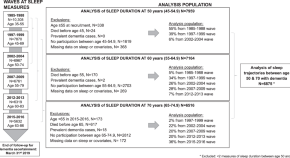
Association of sleep duration in middle and old age with incidence of dementia
Sleep dysregulation has been linked to dementia, but it is unknown whether sleep duration earlier in life is associated with dementia risk. Here, the authors show higher dementia risk associated with short sleep duration (six hours or less) in a longitudinal study of middle and older age adults.
- Séverine Sabia
- Aurore Fayosse
- Archana Singh-Manoux
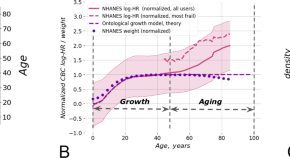
Longitudinal analysis of blood markers reveals progressive loss of resilience and predicts human lifespan limit
Aging is associated with an increased risk of chronic diseases and functional decline. Here, the authors investigate the fluctuations of physiological indices along aging trajectories and observed a characteristic decrease in the organism state recovery rate.
- Timothy V. Pyrkov
- Konstantin Avchaciov
- Peter O. Fedichev

Restoration of energy homeostasis by SIRT6 extends healthy lifespan
Aging is associated with increased frailty and disrupted energy homeostasis. Here, the authors show that SIRT6 overexpression extends the lifespan of male and female mice and demonstrate that SIRT6 optimizes energy homeostasis in old age, which delays frailty and preserves healthy aging.
- A. Roichman
- S. Elhanati
- H. Y. Cohen

Triptonide is a reversible non-hormonal male contraceptive agent in mice and non-human primates
No male contraceptive pills are currently available. Here, the authors use triptonide, a compound derived from a Chinese plant, to deform sperm so that they cannot move properly, thereby causing reversible infertility in male mice and monkeys.
- Zongliang Chang
- Weibing Qin
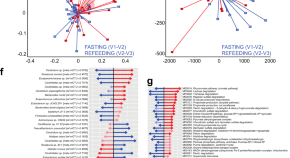
Fasting alters the gut microbiome reducing blood pressure and body weight in metabolic syndrome patients
Nutritional modification including fasting has been shown to reduce cardiometabolic risk linked to western diet. Here the authors show implementation of fasting resulted in alterations to the intestinal microbiota, and circulating immune cells, improving blood pressure and body weight in patients with metabolic syndrome.
- András Maifeld
- Hendrik Bartolomaeus
- Sofia K. Forslund

Transneuronal delivery of hyper-interleukin-6 enables functional recovery after severe spinal cord injury in mice
The CNS has limited ability to regenerate following injury, Here, the authors show that a single injection of AAV-hyper-interleukin-6 in the sensory motor cortex results in corticospinal and raphe spinal tracts regeneration in the injured spinal cord as well as functional recovery in mice.
- Marco Leibinger
- Charlotte Zeitler
- Dietmar Fischer

Spatially resolved transcriptomics reveals the architecture of the tumor-microenvironment interface
During tumor progression, cancer cells contact different neighboring cell types, but it is unclear how these interactions affect cancer cell behavior. Here, the authors use spatially resolved transcriptomics and single-cell RNA-seq to study the role of cilia at the tumormicroenvironment interface.
- Miranda V. Hunter
- Reuben Moncada
- Richard M. White

Adjuvant oncolytic virotherapy for personalized anti-cancer vaccination
Viruses expressing tumour antigens can prime and boost anti-tumour immunity but the efficiency of this approach depends on the capacity of the virus to infect the host. Here, the authors show that vaccination with oncolytic viruses co-administered with tumour antigenic peptides is as efficient as antigen-engineered oncolytic viruses.
- K. Geoffroy
- M.-C. Bourgeois-Daigneault
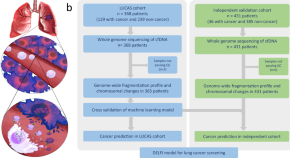
Detection and characterization of lung cancer using cell-free DNA fragmentomes
DNA from tumour cells can be detected in the blood of cancer patients. Here, the authors show that cell free DNA fragmentation patterns can identify lung cancer patients and when this information is further interrogated it can be used to predict lung cancer histological subtype.
- Dimitrios Mathios
- Jakob Sidenius Johansen
- Victor E. Velculescu
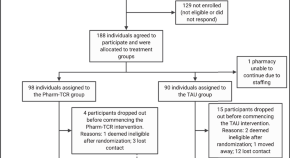
A randomized controlled trial of pharmacist-led therapeutic carbohydrate and energy restriction in type 2 diabetes
Community pharmacists are accessible healthcare providers with expertise in medication management. Here the authors show that a low-carbohydrate, low-energy diet implemented by community pharmacists reduced diabetes medication use and improved glucose control in people with type 2 diabetes.
- Cody Durrer
- Sean McKelvey
- Jonathan P. Little
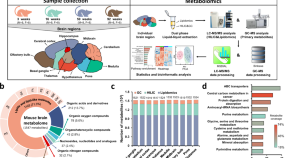
A metabolome atlas of the aging mouse brain
Metabolites play an important role in physiology, yet the complexity of the metabolome and its interaction with disease and aging is poorly understood. Here the authors present a comprehensive atlas of the mouse brain metabolome and how it changes during aging.
- Oliver Fiehn
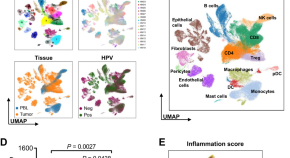
Investigating immune and non-immune cell interactions in head and neck tumors by single-cell RNA sequencing
The tumor microenvironment (TME) has an important role in Head and Neck Squamous Cell Carcinoma (HNSCC) progression. Here, using single-cell RNA sequencing and multiplexed imaging, the authors report the cellular complexity of the TME in patients with HNSCC, exploring inflammatory status, stromal heterogeneity and immune checkpoint receptor-ligand interactions.
- Cornelius H. L. Kürten
- Aditi Kulkarni
- Robert L. Ferris
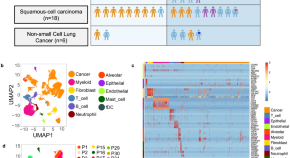
Single-cell profiling of tumor heterogeneity and the microenvironment in advanced non-small cell lung cancer
Comprehensive profiles of tumour and microenvironment are critical to understand heterogeneity in non-small cell lung cancer (NSCLC). Here, the authors profile 42 late-stage NSCLC patients with single-cell RNA-seq, revealing immune landscapes that are associated with cancer subtype or heterogeneity.
- Fengying Wu
- Caicun Zhou

Biomimetic nanoparticles deliver mRNAs encoding costimulatory receptors and enhance T cell mediated cancer immunotherapy
Antibodies targeting OX40 or CD137, two T cell costimulatory receptors, have been shown to improve antitumor immunity. Here the authors design a phospholipid-derived nanoparticle to deliver OX40 or CD137 mRNA to T cells in vivo, improving efficacy of anti-OX40 and anti-CD137 antibody therapy in preclinical tumor models.
- Xinfu Zhang
- Yizhou Dong

Sexual dimorphism in glucose metabolism is shaped by androgen-driven gut microbiome
Male sex is a risk factor for impaired glucose metabolism and type 2 diabetes. Here the authors identify that androgen modulates the gut microbiome, which drives insulin resistance and contributes to sexual dimorphism in glucose metabolism in mice.
- Weiqing Wang
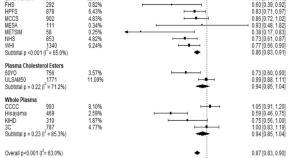
Blood n-3 fatty acid levels and total and cause-specific mortality from 17 prospective studies
Associations between of omega-3 fatty acids and mortality are not clear. Here the authors report that, based on a pooled analysis of 17 prospective cohort studies, higher blood omega-3 fatty acid levels correlate with lower risk of all-cause mortality.
- William S. Harris
- Nathan L. Tintle
- The Fatty Acids and Outcomes Research Consortium (FORCE)
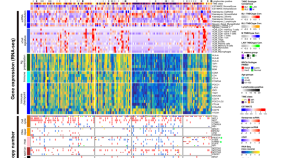
Multi-omics analysis identifies therapeutic vulnerabilities in triple-negative breast cancer subtypes
Triple negative breast cancer can be divided into additional subtypes. Here, using omics analyses, the authors show that in the mesenchymal subtype expression of MHC-1 is repressed and that this can be restored by using drugs that target subunits of the epigenetic modifier PRC2.
- Brian D. Lehmann
- Antonio Colaprico
- X. Steven Chen
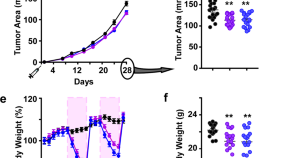
Daily caloric restriction limits tumor growth more effectively than caloric cycling regardless of dietary composition
Caloric restriction (CR) has been shown as an effective intervention to reduce tumorigenesis, but alternative less stringent dietary interventions have also been considered. Here, the authors show that in a murine model of breast cancer CR has a larger effect on preventing tumorigenesis and metastasis compared to periodic caloric cycling.
- Laura C. D. Pomatto-Watson
- Monica Bodogai
- Rafael de Cabo

Neoadjuvant immunotherapy with nivolumab and ipilimumab induces major pathological responses in patients with head and neck squamous cell carcinoma
Immune checkpoint blockade has become standard care for patients with recurrent metastatic head and neck squamous cell carcinoma (HNSCC). Here the authors present the results of a non-randomized phase Ib/IIa trial, reporting safety and efficacy of neoadjuvant nivolumab monotherapy and nivolumab plus ipilimumab prior to standard-of-care surgery in patients with HNSCC. .
- Joris L. Vos
- Joris B. W. Elbers
- Charlotte L. Zuur
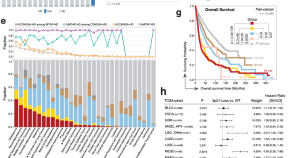
9p21 loss confers a cold tumor immune microenvironment and primary resistance to immune checkpoint therapy
The molecular mechanisms of resistance to immune checkpoint therapy remain elusive. Here, the authors perform immunogenomic analysis of TCGA data and data from clinical trials for antiPD-1/PD-L1 therapy and highlight the association of 9p21 loss with a cold tumor microenvironment and resistance to therapy.
- Guangchun Han
- Guoliang Yang
- Linghua Wang

Gut bacteria identified in colorectal cancer patients promote tumourigenesis via butyrate secretion
Several bacteria in the gut microbiota have been associated with colorectal cancer (CRC) but it is not completely clear whether they have a role in tumourigenesis. Here, the authors show enrichment of 12 bacterial taxa in two cohorts of CRC patients and that two Porphyromonas species accelerate CRC onset through butyrate secretion.
- Shintaro Okumura
- Yusuke Konishi
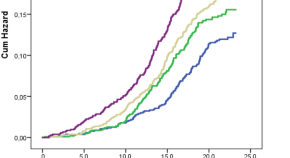
Elevated circulating follistatin associates with an increased risk of type 2 diabetes
Follistatin promotes in type 2 diabetes (T2D) pathogenesis in model animals and is elevated in patients with T2D. Here the authors report that plasma follistatin associates with increased risk of incident T2D in two longitudinal cohorts, and show that follistatin regulates insulin-induced suppression lipolysis in cultured human adipocytes.
- Chuanyan Wu
- Yang De Marinis

Tau activates microglia via the PQBP1-cGAS-STING pathway to promote brain inflammation
Brain inflammation generally accelerates neurodegeneration but the mechanisms of this are not fully characterised. Here the authors show that PQBP1 in microglia is important for sensing extrinsic Tau 3 R/4 R proteins and triggers an innate immune response through cGAS and STING resulting in cognitive impairment.
- Hiroki Shiwaku
- Hitoshi Okazawa

Long-term treatment with senolytic drugs Dasatinib and Quercetin ameliorates age-dependent intervertebral disc degeneration in mice
Intervertebral disc degeneration is a leading cause of chronic back pain and disability. Here the authors show that long term treatment with senolytic compounds Dasatinib and Quercetin reduces disc senescence burden and ameliorates age-dependent degeneration in mice.
- Emanuel J. Novais
- Victoria A. Tran
- Makarand V. Risbud

DNA/RNA heteroduplex oligonucleotide technology for regulating lymphocytes in vivo
Using gene silencing to regulate lymphocyte function is a promising therapeutic approach for autommunity, inflammation and cancer. Here the authors use a heteroduplex oligonucleotide for improved potency, efficacy and longer retention times.
- Masaki Ohyagi
- Tetsuya Nagata
- Takanori Yokota
Quick links
- Explore articles by subject
- Guide to authors
- Editorial policies
- How It Works
- PhD thesis writing
- Master thesis writing
- Bachelor thesis writing
- Dissertation writing service
- Dissertation abstract writing
- Thesis proposal writing
- Thesis editing service
- Thesis proofreading service
- Thesis formatting service
- Coursework writing service
- Research paper writing service
- Architecture thesis writing
- Computer science thesis writing
- Engineering thesis writing
- History thesis writing
- MBA thesis writing
- Nursing dissertation writing
- Psychology dissertation writing
- Sociology thesis writing
- Statistics dissertation writing
- Buy dissertation online
- Write my dissertation
- Cheap thesis
- Cheap dissertation
- Custom dissertation
- Dissertation help
- Pay for thesis
- Pay for dissertation
- Senior thesis
- Write my thesis
226 Hot Public Health Thesis Topics For Top Grades
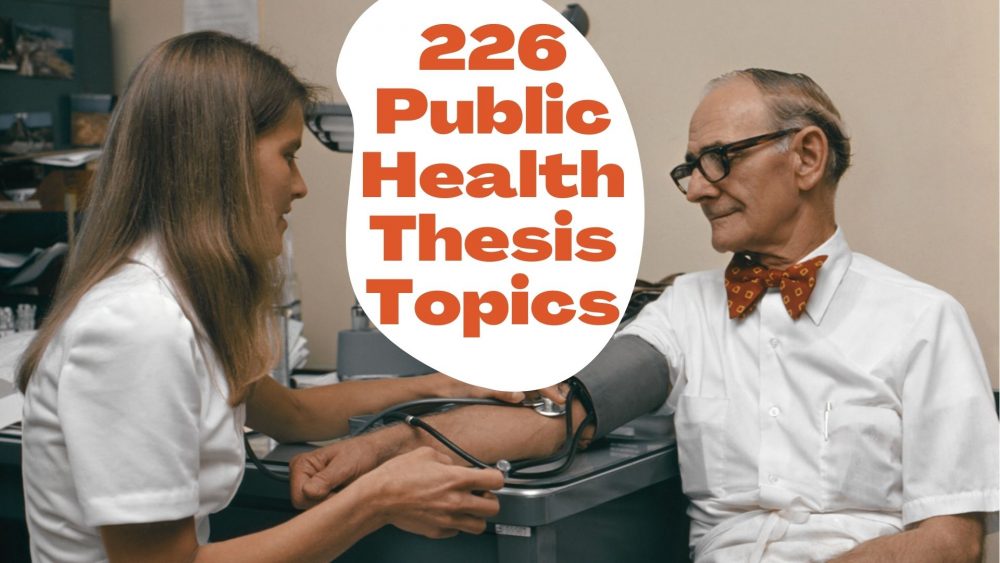
Are you stuck trying to get the best current public health research topics for thesis and writing it? If yes, know you are not alone. A lot of students find the tasks challenging, but we are here to help. Keep reading our informative guide that demonstrates how to prepare an engaging public health paper.
We will also highlight hot 226 health policy topics for paper and other public health ideas for dissertation that you can use for top grades. Why settle for less when we can help you select the best college or university papers?
What Is Public Health?
Before looking at the top public health statistics undergraduate thesis topics or other public health research ideas, let’s start with the definition. So, what is public health?
According to the World Health Organization (WHO), public health is “the art and science of preventing diseases, helping to prolong life and promote health using organized efforts. Good examples of public health efforts include preventing outbreaks, educating the public on health choices, promoting fitness, preparing for emergencies, and avoiding the spread of infectious diseases. Public health
How To Write A Great Public Health Dissertation
If you are a graduate or masters student, one of the most comprehensive documents that you need to prepare is the dissertation. It is an expansive paper and comes at the end of your course. Remember that you need to ensure it is prepared well because a team of professors will ultimately evaluate it. So, here are the main steps that you need to follow to prepare a high quality dissertation:
Identify the topic of study Comprehensively research the topic and identify the main points to support it Develop the thesis statement for the dissertation (this thesis will ultimately be tested after gathering your data) Develop an outline for the dissertation. This guide should tell you what to write at what specific instance. Here is a sample outline: Topic of the study Introduction. Start with the thesis statement, followed by the objectives of the study. Then, the rest of the introduction should be used to set the background for the study. Literature review: Review relevant resources about the topic. Methodology: Explain the methodology that was used during the study. Is Results and analysis: Provide the results gathered during the study. Discussion and conclusion: Here, you should discuss the study results and demonstrate whether they approve or disapprove the thesis statement. If you found any gaps in the previous studies, highlight them too and call for further studies. Bibliography: This is a list of all the resources you used to prepare the paper. Write the first draft following the outline we have just listed above. Write the final copy by refining the first draft, proofreading, and editing it.
Awesome Public Health Thesis Topics
Here are the leading thesis topics in public health for top grades. You can use them as they are or tweak a little to suit your preference.
Public Health Thesis Topics In Mental Issues
- What is the role of public health in addressing mental issues in society?
- Seasonal affective disorder: A review of the disorder’s prevalence rates.
- Society should always listen to the needs of mentally ill persons.
- Eating disorders in adults: A review of the treatment strategies used for adults in the UK.
- What is the relation between climate change and emerging public health issues?
- Comparing depression prevalence rates in the UK to those of the US.
- What are the main causes of anxiety disorders in society?
- A review of the connection between HIV/AIDS and mental health issues in society.
- Running a public health facility: What is the most important equipment?
- Emerging public health issues in developing countries.
- Analyzing the psychological problems of breast cancer.
- What strategies should people use to prevent their mental health from social media dangers?
- A review of the public health benefits associated with active lifestyles.
- Stress: Why is it a major risk factor for mental health in many communities?
- What are the most common mental health issues in society today?
- Comparing the rates of depression and stress in China and the UK.
- Addressing anxiety-related disorders: Is cognitive-behavior therapy the best treatment method?
- A review of the economic burden of living with a person suffering from anxiety disorders.
- How does depression impact the quality of life?
- Comparing training of public health officers in the US to India.
Unique Research Topics In Public Health
- Surrogacy: A review of associated ethical issues.
- Prevalence of medical errors in hospitals: A review of the policies used to prevent the problem in the United States.
- Blood transfusion: What are the side effects?
- A review of doctors’ roles in promoting healthy lifestyles.
- Maintaining healthy body weight: Comparing the effectiveness of the recommended methods.
- A review of organ donation trends in Europe and Asia.
- Analyzing the ethical factors around cloning: When should it be allowed?
- The ethics of human experimentation.
- Comparing the rates of heart attacks in women to men in the United States.
- What are the main causes of heart attacks? Can it be prevented?
- Progress in diabetes studies and treatment: Is it possible to get a cure in the future?
- Biological weapons and their impacts on society: A review of the Leukemia rates in Japan.
- Pre-diabetes in children: What are the main symptoms, and how can it be addressed?
Public Health Paper Topics On COVID-19
- How will COVID-19 change life?
- What are the advantages and disadvantages of self-isolation?
- Life lessons that you learned during the COVID-19 pandemic.
- What challenges has your community faced during COVID-19 pandemic?
- School life during COVID-19 pandemic.
- A review of mass media operations during pandemic.
- What projects did you undertake during the pandemic?
- A review of projects that your community undertook during the COVID-19 pandemic.
- A closer look at the backlash against Asians in Europe at the start COVID-19 pandemic period.
- Preparing for the next pandemic: What lessons did the world learn from the COVID-19 pandemic?
- The best strategies for staying healthy during a pandemic.
- Is there anything that we could have done to prevent the COVID-19 pandemic?
- Comparing the effectiveness of Europe and American healthcare preparedness for tackling disasters.
- A review of mental health status in a community of your choice during the COVID-19 pandemic.
- A review of COVID-19 emergence theories: Which one do you think is more credible?
- Comparing the impacts of the COVID-19 pandemic to Ebola.
- Vaccines development for viral infections: What made the development of the COVID-19 vaccine possible so fast, whereas that of HIV/AIDS has taken so long?
- A review of the vaccine development process.
- Time for review: How effectively do you think your government responded to the COVID-19 pandemic?
- Rethinking public health on a global scale: Demonstrating why effective healthcare is only possible when looked at globally.
Interesting Public Health Research Topic Ideas
- What is the importance of learning public health in school?
- Identify and review a common public health issue in your community.
- The history of human health: Comparing what was considered healthy in ancient times to what is referred to as healthy today.
- Going vegan: How can it impact your health?
- Excessive weight: Is it the new threat to human civilization?
- Is bodybuilding healthy?
- Body positive: Is it a new health standard or ignorance of body issues?
- Things to consider when selecting healthy food to eat.
- Why psychological health should be part of every community in society.
- The health of newborns: What is the difference between their healthcare and that of adults?
- Emerging trends in the healthcare industry: How can the latest trends benefit society?
- Comparing depression and anxiety in two countries of your choice.
- Physical wellness must include healthy behavioral patterns and nutrition.
- A sense of belonging is paramount to personal and community health.
- What is the relationship between spirituality and public health?
- A review of stigmatization of mental health issues in a community of your choice.
- Is it possible to prevent depression?
- At what point should children start learning sex-related education?
- Comparing the two main public health issues in two cities: London and New York.
- What is the relationship between poverty and public health?
Hot Researchable Topics In Public Health
- The resurgence of measles in society: The best guidance for clinicians.
- Tackling the growing national drug problem.
- Bioterrorism preparedness for global disasters.
- A review of recent vitamin D recommendations for older adults.
- Strategies for maintaining maternal mortality at low levels across the globe.
- Efforts by Asian governments to reduce infections from using unsafe water.
- Over-the-counter drug abuse in Europe: Compare two countries of your choice.
- Health care providers’ roles in preventing bullying in society.
- Knowledge management in the UK healthcare organizations.
- The health benefits of good healthcare waste management.
- Characteristics of dental wastes in hospitals.
- Comparing the most prevalent public health issues in developed and developing nations.
- Latest trends in financing public health.
- The relevance of clinical epidemiology in public health.
- Evidence based public health.
- Epidemiological burden of HIV/AIDS in developing countries.
- Addressing cervical cancer in developing countries: Is it possible to eliminate it completely?
- Ethics in public health clinical research.
- Comparing the strategies used in teaching and motivating public health professionals in developing and developed countries.
Research Topics In Public Health For Masters
- Advertising and impacts on food choices in the community.
- The use of stem cell technologies for cancer treatment: What are the latest trends?
- Bio-printing: Is it the future of organ transplants?
- Nutrition education: How does it promote healthy diets?
- Exercising: What role does it play in promoting strength and balance in the elderly?
- Weight loss surgery: What are the key advantages and disadvantages?
- Heart disease is a major public health issue in society.
- Alternative strategies for treating depression in society: Are they effective?
- Healthcare leadership and its importance in public health.
- Legal aspects of public health care in the society.
- Mental disabilities in patients: A review of the emerging trends in the UK.
- How does the United States promote the development of public health?
- Inequalities in medicine: What impact does it have in public health?
- The most controversial issues in public health in the UK.
- What are the most preferred storage systems for medical supplies in the UK public health facilities?
- Reimagining the public health systems on the globe: Where do you see the UK health system in the next 20 years?
Top Thesis Topics In Dental Public Health
- Common oral health issues in Ireland.
- A review of common problems of endodontically treated teeth.
- The role of good leadership skills in dental education.
- Child management techniques between male and female practitioners.
- What role does ergonomics play in dentistry?
- Dental material and bio-engineering: What are the latest trends?
- A review of the relationship between diabetes and oral health in the society.
- The role of electronic health care record systems used in public health.
- Comparing dental health issues in the developing and developed countries.
- A review of public awareness of dental health issues in a community of choice.
- How can you ensure that all the food you buy is safe and healthy?
- What strategies are used by your local health community to promote dental awareness?
- Dental health management in California: What do you think should be done differently?
- Are you satisfied with the strategies used to address dental issues?
Hot Thesis Topics Public Health
- Mandatory overtime work for medical staff: How does it impact their commitment to their job?
- Nursing shortage and its impact in public health.
- Strategies for improving public health in the EU.
- Mental health issues among asylum seekers in the United States.
- Common mental issues among veterans returning from war: A case study of the United States.
- What functions does management play in healthcare settings when handling key public health issues?
- How poor relationships between nurses and doctors can impact public health services delivery.
- Third-party players in public health and their roles.
- Financial reporting standards in public health facilities.
- What is the correlation between revenue collection in society and the quality of patient services?
- Reviewing the coordination of public health officials during disasters.
- The importance of staff training on quality of health services.
- Comparing the differences between alternative medicine and conventional medicine in addressing public health issues in society.
- Obesity: What are the main causes in child-going age?
- A review of health consequences of caffeine.
- Medical marijuana: What are the main pros and cons?
- A review of the US Farm Bill Amendments that legalized use of cannabis in the US.
- Doing sports: Is it always healthy?
- Low-fat or low-carb diet: Which one is better in addressing overweight and diabetes issues?
- Preventing communicable diseases: Evaluating the prevention strategies used in Asia.
- What is the estimated cost of treating heart problems?
Controversial Public Health Dissertation Topics
- Smoking and impacts of current efforts to address cancer in the society.
- A review of the main causes of heart attacks in society today.
- Tobacco ads: Evaluating their impacts and the relationship to the current cancer trends in the society.
- Sleep disorders: Explain why they should be considered a public health issue.
- Staffing shortage and the impacts in fighting COVID-19 pandemic in Asia.
- Analyzing risk management of treating different diseases in the community.
- COVID-19 pandemic in numbers: Comparing the infection rates in the developed and developing countries.
- Reviewing strategies used in the US public health system to achieve equity: How effective are they?
- Analyzing the main challenges in the UK medical care system.
- Rising cases of suicides in the society: What are the main causes?
- A comprehensive review of strategies used to prevent suicides in the 21st century in the US.
- Use of vaccines to prevent diseases: Do adults still need the vaccines?
- Heat-related deaths: What strategies should be adopted?
- Chronic-diseases prevention: Comparing the strategies used in developing and developed countries.
- Are we becoming too dependent on antibiotics in fighting diseases?
- Opioid crisis: Are the doctors to blame for it?
- Use of blockchain in growing accuracy of clinical trials in medicine.
- What dangers are posed by nuclear wastes in society?
- Assessing US industrial facilities compliance rates to cut down emissions.
- Using clean energy as a strategy of improving public health: What are the expectations?
- What is the healthiest country?
- Evaluating the correlation between gaming and deviant behavior among children in society.
- COVID-19 could have been prevented if WHO was more vigilant?
Public Health Research Questions
- Is the high cost of medical healthcare in the United States justified?
- What is the correlation between poverty and poor health in society?
- Should health care for homeless people be free?
- Unconventional medicine: Should it be part of the UK healthcare system?
- Should doctors be responsible for medical errors?
- Should medical officers or health facilities be allowed to promote selective medical products?
- Should all healthcare facilities in the UK be required to have translators for non-English speaking clients?
- Mental health issues associated with domestic violence: A case study of France.
- Is it a good idea to legalize euthanasia?
- What are the benefits of using surgical masks in public?
- What are the most important lessons from the different waves of the COVID-19 pandemic reported on the globe?
- Who is more responsible for the COVID-19 pandemic?
- Ebola or COVID-19 pandemic: Which is worse?
- What are the main causes of epidemics on the globe?
- Public health planning: What are the most important things to think about?
- Should governments pay the cost of rehabilitating drug addicts in society?
- Teaching children healthy lifestyles: What are the best strategies?
- What problems do people with autism face in society?
- What are the leading causes of child mortality in your community?
- Gun violence in the United States: Should it be considered a public health issue?
- What illnesses are considered foodborne?
Easy Topics In Public Health
- All workplaces should support breastfeeding.
- What are the best strategies to reduce pollution in society?
- Public health benefits of recycling waste in society.
- Reviewing the causes of poor water quality in the developing world.
- Comparing water quality standards policies in the UK and US.
- Health impacts of the rapid depletion of o-zone depletion.
- Better planning of infrastructural development is important for healthier societies: Discuss.
- The US is better prepared to handle pandemics that might arise after the COVID-19 pandemic. Discuss.
- A review of common diseases spread by vectors.
- A review of key policies installed to protect employee health.
- Legal age for consuming energy drinks should be set by the government to address the problem of diabetes.
- Smoking: Should it be banned in public?
- What are the best strategies for raising awareness in public?
- Can reducing the workload of employees in manufacturing facilities improve their health?
- Sunbathing should be restricted to prevent the risk of cancer: Discuss.
- Should abortion be banned in society?
- School-related stress: How can it be prevented?
- Should birth control be made available and free for all teenagers?
- What should be categorized as a bad health habit?
- Compare and contrast two common treatment methods for treating behavioral disorders.
- Internet addiction: What are the main dangers of internet addiction?
Other Public Health Topics For Research
- How to stay healthy and safe during a pandemic.
- Using a bicycle instead of driving is healthier.
- Common mental disorders in India.
- What is the biggest health issue among young people?
- The impact of exercising in teenagers.
- Why do teenagers experiment with drugs?
- What impact does dispositional violence have on mental disorders?
- Is telemedicine helpful in promoting better healthcare?
- Unproven alternative medicine: What are the associated risks?
- What alternatives do we have for antibiotics?
- What is the difference between private and public healthcare?
- A review of the main health issues associated with puberty.
- What is the most dangerous disease of the 21st century?
- Why are some people still afraid of vaccines?
- Experimental treatment: Why do people agree to undergo it?
- How can we improve the health of people living with chronic illnesses?
- The best strategies to make people aware of the basics of healthcare.
- A review of the growing awareness about reproductive health in the society.
Seek Thesis Help from Experts
As we indicated earlier, writing a dissertation or other advanced papers is never easy. However, you should not give up or get content with poor quality work. If you do, defending the paper in front of a team of professors will be challenging. The best way out is to pay master thesis help .
We work with the best writers who are always ready to help you craft A-rated papers. They are educated in top schools and have a lot of experience in preparing both undergraduate papers and masters thesis. When you buy medical thesis , we also offer editing and proofreading services to guarantee students of highly refined work. Our services are also affordable and we also use secure communication to guarantee every student high confidentiality. When your teacher issues the assignment prompt, whether for a research paper or dissertation, let our professionals help you to get the best grades.
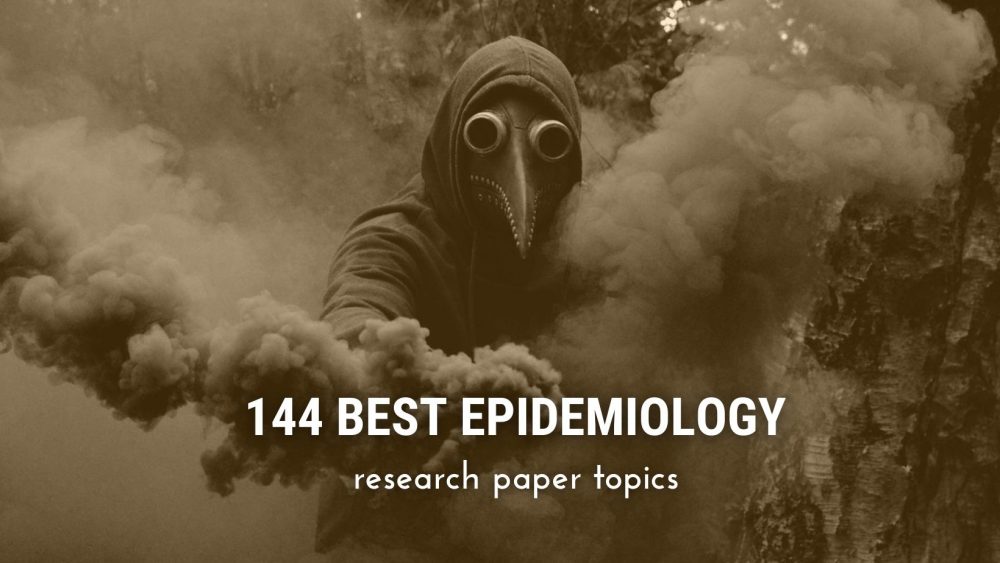
Leave a Reply Cancel reply
Your email address will not be published. Required fields are marked *
Comment * Error message
Name * Error message
Email * Error message
Save my name, email, and website in this browser for the next time I comment.
As Putin continues killing civilians, bombing kindergartens, and threatening WWIII, Ukraine fights for the world's peaceful future.
Ukraine Live Updates

An official website of the United States government
Here’s how you know
Official websites use .gov A .gov website belongs to an official government organization in the United States.
Secure .gov websites use HTTPS A lock ( A locked padlock ) or https:// means you’ve safely connected to the .gov website. Share sensitive information only on official, secure websites.

Global Health Research Topics
Subscribe to Fogarty's Global Health Matters newsletter , and weekly funding news for global health researchers .
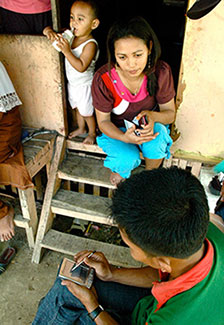
The Fogarty International Center and its NIH partners invest in research on a variety of topics vital to global health. For each of these global health research topics, find an in-depth collection of news, resources and funding from Fogarty, the NIH, other U.S. government agencies, nongovernmental organizations and others.
- Chronic noncommunicable diseases (NCDs)
- Climate change
- Deafness and other communication disorders
- Diversity, equity, inclusion, and accessibility
- Eye disease, vision health and blindness
- Global health security
- Household air pollution
- Implementation science
- Infectious diseases
- Coronaviruses
- Ebola virus disease
- Tuberculosis (TB)
- Maternal and child health
- Mentoring and mentorship training
- Mobile health (mHealth)
- Neurological and mental disorders and diseases
- Oral and dental health
- Trauma and injury
- Tobacco control
- Women’s leadership in global health research
Health Topic Information
- NIH Health Topics
- MedlinePlus Health Topics
- Diseases and Conditions from the U.S. Centers for Disease Control and Prevention (CDC)
Updated January 3, 2024
An official website of the United States government
The .gov means it’s official. Federal government websites often end in .gov or .mil. Before sharing sensitive information, make sure you’re on a federal government site.
The site is secure. The https:// ensures that you are connecting to the official website and that any information you provide is encrypted and transmitted securely.
- Publications
- Account settings
Preview improvements coming to the PMC website in October 2024. Learn More or Try it out now .
- Advanced Search
- Journal List
- Healthcare (Basel)

Current Issues on Research Conducted to Improve Women’s Health
Charalampos siristatidis.
1 Assisted Reproduction Unit, Second Department of Obstetrics and Gynecology, Medical School, National and Kapodistrian University of Athens, Aretaieion Hospital, 76 Vass Sofias, 11528 Athens, Greece
Vasilios Karageorgiou
2 2nd Department of Psychiatry, Medical School, National and Kapodistrian University of Athens, Attikon Hospital, 1 Rimini Street, 12642 Athens, Greece; moc.liamtoh@groegaraksav
Paraskevi Vogiatzi
3 Andromed Health & Reproduction Diagnostic Lab, 3 Mesogion Str, 15126 Maroussi, Greece; moc.liamg@iztaigovive
Associated Data
Not applicable.
There are varied lessons to be learned regarding the current methodological approaches to women’s health research. In the present scheme of growing medical literature and inflation of novel results claiming significance, the sheer amount of information can render evidence-based practice confusing. The factors that classically determined the impact of discoveries appear to be losing ground: citation count and publication rates, hierarchy in author lists according to contribution, and a journal’s impact factor. Through a comprehensive literature search on the currently available data from theses, opinion, and original articles and reviews on this topic, we seek to present to clinicians a narrative synthesis of three crucial axes underlying the totality of the research production chain: (a) critical advances in research methodology, (b) the interplay of academy and industry in a trial conduct, and (c) review- and publication-associated developments. We also provide specific recommendations on the study design and conduct, reviewing the processes and dissemination of data and the conclusions and implementation of findings. Overall, clinicians and the public should be aware of the discourse behind the marketing of alleged breakthrough research. Still, multiple initiatives, such as patient review and strict, supervised literature synthesis, have become more widely accepted. The “bottom-up” approach of a wide dissemination of information to clinicians, together with practical incentives for stakeholders with competing interests to collaborate, promise to improve women’s healthcare.
1. Introduction
Women’s health has been at the center of interest and growing concern in the last few decades. As a measurable outcome, it has been studied at the level of mortality [ 1 ], serious morbidity [ 2 ], and nutritional status [ 3 ] and through proven, evidence-based interventions. The implementation of such interventions is essential to guide national and international policies and programs, targeting the achievement of universal coverage of health services. In this respect, conducting the best quality of research (research that provides firm and ethical evidence adhering to the principles of professionalism, transparency, and auditability) with the use of robust methods is mandatory. Towards this goal, the current reality is far from encouraging.
In accordance with scientific literature guidelines and research quality guidelines (e.g., the Preferred Reporting Items for Systematic Reviews and Meta-Analyses (PRISMA)), impact factors, and citation count are considered the norms in current research evaluation modalities. However, recent works in research methodology challenge this simplifying notion [ 4 , 5 , 6 ].
The pitfalls reported are associated with various—albeit specific—“cultural, ethical, operational, regulatory, and infrastructural factors” linked with a lack of adequately trained researchers and subject attrition bias [ 7 ]. As a result, the clinical research environment is more or less inseminated with various types of bias, leading to the discouragement of sponsors. The growing plethora of questionable quality trials and reviews is another issue to consider. “From 14 reports of trials published per day in 1980 [to] 75 trials and 11 systematic reviews of trials per day, a plateau in growth has not yet been reached”, stated a policy forum article reported in 2010 [ 8 ]; additionally, the authors noted that “the staple of medical literature synthesis remains the non-systematic narrative review”, further pointing out the need for freely available simple yet valid answers to most patients’ questions [ 8 ]. In the same context, current data concerning women’s health derived from protocols, full study reports, and participant-level datasets are rarely available to a wide audience. At the same time, selective reporting of methods and results plagues reports. With the reduced quality of information produced, a lot of money has been wasted; subsequently, the existence of all kinds of bias affect the research itself and jeopardize the validity of the findings and, consequently, the care of women [ 9 ].
Issues have been raised by exploring different approaches to evaluate the quality of scientific input to the community. The ultimate goal remains a robust and uniform literature evaluation system adapted to the evolving conduct of studies and to the application of modern tools to re-ensure robust methodology and reporting of data and results. Here, we perform a narrative overview on current issues in study quality assessment regarding clinical medicine. We electronically searched PubMed using the following keywords: “clinical trials”, “meta-analysis”, “IPD”, “sponsor”, “challenges”, “regulatory”, “women’s health”, “evidence-based medicine/trends”, “policy making”, “publishing”, “research methods and practices”, “consumers network”, “bias”, “industry-sponsored trials”, “biomedical bibliographic databases”, and “quality research”, trying to collect data irrespective of type of report and language. Based on this evidence, we propose a combination of interventions at various levels, underlining quality aspects that we consider significant, and other routes of judgments.
2. The “Standard” Factors
Citation count and publication rates in international databases, hierarchy in author lists according to contribution, and the impact factor of the journal are considered important factors in the quality of a study, especially for the “scientific reader” seeking quality information on a specific topic. This has been extensively studied by other workgroups [ 10 , 11 , 12 , 13 ] and represents a justified trend accounting for the prestige of a scientific journal and the publication itself, along with language and availability, and ultimately skewing scientific trends or potentially leaving some important contributions in obscurity. Even though previous works contemplate the importance of the aforementioned factors in the true quality of research studies and publications, all considerations are derived from a common denominator, that is, that the currently used quality standards either for the common user or for greater structures and institutions most probably do not reflect quality but rather popularity. In this context, the citation rate (including self-citation and “negative citing”) and an impact statement on the individual author (a concise summary of the impact of somebody’s career) have been proposed. In addition, other metrics, including altmetrics, bibliometrics, and H-index, combined with updated mathematical models, such as artificial neural networks, might be the tools of the future; these models constitute more accurate tools due to the special characteristics of these “learning through training” processes, resembling the capacity of the brain to learn and judge [ 14 ].
3. The Type of Research Question and Studies
Although multiple outcomes may be reported at once and variability in study designs fluctuates, a primary role belongs to the type of research question explored by a study or publication, which will inevitably determine the methodology to be followed. For example, in past years, there is a disproportionate output of Systematic Reviews (SRs) and meta-analyses from Asian countries produced on a massive scale [ 15 , 16 ] as a means of “publishing in order to publish” with questionable quality and methods. Their numbers are so high that, in some cases, it overtakes original trials. Of note, the use of such studies in the biomedical field was occasional until the 1990s [ 17 ]. Moreover, those from the Cochrane collaboration, the fundamental organization for good quality systematic reviews, are only a small fraction of this output [ 8 ].
With regard to Randomized Controlled Trials (RCTs), suggestions have been made in recent reports on better conduct [ 18 ]: trial protocols should be simple, reproducible, and well organized, with predefined and well-described study populations/participants and should have sound interventions, and representative comparisons and outcomes. Of note, these could be based on the conclusions of previously conducted SRs that often point out issues in quality and methodology of the original trials. Minimal deviations from protocols and a priori specification of useful core outcomes that translate directly to women’s wellbeing are the focus of the CROWN Initiative [ 19 ]. According to the authors, there has been a multi-targeted set of suggestions to “ensure that critical and important outcomes with good measurement properties are incorporated and reported, in advancing the usefulness of research, in informing readers, including guideline and policy developers, who are involved in decision-making, and in improving evidence-based practice”.
A priori description of the outcomes of interest can alleviate the known issues/biases associated with exploratory analyses. A change in outcome, especially in cases where the results do not support the rationale of the study, can mask the original intentions of the authors and can recontextualize the same results in a more positive manner [ 20 ]. Still, an exploratory analysis has a significant role in deducing potentially valuable conjectures for future studies. However, it is central for transparency that the authors explicitly state when this is the case, i.e., when an analysis is conducted post hoc. In order to ease the distinction of post hoc and a priori analyses by SR authors and readers, Dwan et al. (2014) proposed the publication of both protocols and pre-specified analyses [ 21 ].
We cannot anticipate that SRs can retrospectively solve the potential gaps and inconsistencies in the methodology and outcome reporting. For robust answers, research questions must be well defined from the start. However, more elaborate techniques of evidence synthesis can guide future research in more meaningful ways and are becoming more popular. Specifically, prospective and individual patient data meta-analyses (IPDMA) may need to become the norm in literature synthesis [ 22 , 23 ]. A major difficulty in IPDMA is the fact that securing sensitive patient data is a time-consuming task that demands the establishment of mutual trust. Even when representative evidence has been secured, data availability may still affect the pooled evidence. A recent study assessing IPDMA’s treating oncological topics suggested that studies for which they were available differed significantly from studies in which the authors did not share them [ 24 ]. Still, IPDMA is a trustworthy methodology that can assess the effect of patient-level covariates on treatment outcomes or diagnostic accuracy more thoroughly than the standard procedure of a meta-regression used in aggregate-data meta-analyses [ 25 ]. Given the current ethos of openness in clinical trials and common repositories becoming more widespread, IPDMA is likely to become the mainstay of critical synthesis of literature [ 26 ].
Finally, we have to include observational research in an effort to improve women’s health in the context of greater personalization of care and stratified medicine. Such studies have traditionally served as tools for understanding the nature of particular clinical conditions, for determining risk factors and mechanisms of actions, and for identifying potential intervention targets. Their disadvantages associated with methodological issues such as confounds and the fact that they are prone to limited internal validity could be restricted through guidelines such as the strengthening the reporting of observational studies in epidemiology (STROBE) statement [ 27 ].
4. The Inclusion of Young Authors
The encouragement of younger and/or less experienced scientists and ultimately their inclusion in the respective workgroups and in the list of contributors may provide an unexpected topic or question and a clearer view on established research schemes. The productivity of highly cited papers is related to the advanced age of their authors; adversely, better funding opportunities for younger researchers would give them unique chances to build strong productivity [ 28 ]. The advancement of knowledge taught during academic training as well as a higher probability of compliance with robust methods of reporting should encourage the inclusion of younger scientists. Tips and recommendations of young authors and early career scientists have been plenty, including collaborating with researchers within as well as outside their field and/or country, sending their research article to an appropriate journal, and adequately highlighting the novelty and impact of their research [ 29 , 30 ].
Towards this goal, the improvement of the scientific literacy of young scholars is the main step, and this burden falls on to the shoulders of the trainers. There are “uncomfortable truths” in training [ 31 ], but scientific research and the mode of thinking are processes continuously accumulated and must be taught by each director or responsible authority: they should improve the skills and capabilities of young scholars in scientific and technological literacy and in communication and productivity.
5. Quality in Reporting
Reporting quality must be ensured by avoiding bias, such as selective reporting, deliberate or not. Avoiding reporting insignificant data and outcomes could lead to severe distortion in the SR [ 32 ]. Thus, flaws in design, conduct, analysis, or reporting of RCTs can produce bias in the estimates of a treatment effect.
For example, in a large meta-epidemiological study of 1973 RCTs, a lack of blinding was associated with an average 22% exaggeration of treatment effects among trials that reported subjectively assessed outcomes [ 33 ]. This deviation is enough to adversely affect the interpretation of the results and further negatively influences regulatory settings and clinical practice.
Another example involves the evidence base on recent cancer drug approvals. Between 2014 and 2016, a quarter of the relevant studies were not RCTs; of the RCTs, the majority of them did not measure overall survival or quality of life outcomes as primary endpoints, and half of them were judged to be at high risk of bias; the authors’ judgments changed for a fifth of them when they relied on information reported in regulatory documents and scientific publications separately [ 34 ].
6. Strict Implementation of Rules in the Peer Review Processes
These processes first appeared in 1655 in a collection of scientific essays by Denis de Sallo in the Journal des Scavans , and almost 100 years later (1731), their implementation became a standard of practice by almost all biomedical journals [ 35 ]. Maintaining the quality and scientific integrity of publications; evaluating for competence, significance, and originality; and ensuring internal and external validity of submissions are crucial points. Similarly, the appropriate selection and training of reviewers to provide quality and specialized reviews without bias is an essential part of the process [ 36 ].
7. Sponsorship
Ethical and other issues surrounding sponsorships, to ensure credibility of a study, have been addressed in the past. One of the main sources of funding remains the industry [ 37 ]. Indeed, sponsored clinical research has always been questioned, influenced by reports of selective or biased disclosure of research results, ghostwriting and guest authorship, and inaccurate or incomplete reporting of potential conflicts of interest [ 38 ]. Although these may be a scarce incidence nowadays, active monitoring in funded studies should be implemented throughout in order to eliminate this possibility or any other conflicts of interest. An alarming analysis of 319 trials indicated that only a small minority (three out of 182 funded trials) were funded by multiple sponsors with competing interests. The presence of industry funding also almost tripled (OR = 2.8, 95% CI: 1.6, 4.7) the possibility of a study having reported favorable findings [ 39 ]. Furthermore, registered study protocols that announced funding were less likely to be published after their completion (non-publication rate: 32% vs. 18% [ 40 ].
8. Change in the Notion of Publishing
The change in notion and perception of the impact of outcomes is perhaps the most important part of the improvement in research conduct and implementation. This can be achieved through differentiation and modern adaptation of our scientific culture fighting inner and external incentives. Every scientific input should target a wider human benefit. A change in notion and incentives in publishing is crucial, from the level of the investigator aiming to publish/individual behaviors up to the social forces that provide affordances and incentives for those behaviors [ 41 , 42 , 43 ].
In a specific area of research, a clinical evaluation should precede publication in order to ensure relevance. A dramatic example is the scientific literature demonstrating an overload of various biomarkers for various diseases in which only a few of them have been confirmed by subsequent research and few have entered routine clinical practice [ 44 ]. In addition, biomarkers should also be judged on the grounds of cost-effectiveness and incremental net benefit [ 45 ]. Multiple indices may have comparable diagnostic accuracy, but their cost, an unavoidable concern in public health, may differ significantly.
Therefore, the selection of information to be published should be conducted on safer grounds and should be adequately supported by the authors, based on our knowledge on the scheme to date, and importantly, a summary of previous attempts should note the effective interventions and provide a concluding remark for the scientist through a good quality review.
9. Patient’s Contribution to Evaluation and Sex/Gender Analyses
In the era of evidence-based medicine, feedback from the recipients of healthcare development is gaining more importance and platforms for opinion exchange between patients and investigators have been established. This has already been implemented by the Cochrane Collaboration, where patient review is an integral part of the SR publication process and plain language summaries target a nontechnical audience. This process could be adopted as standard practice if accordingly modified. If the patient review, for example, is to be widely implemented in other journals, it would constitute a potentially radical paradigm shift that aims to solidify the review process. Of course, technical difficulties, such as acknowledgement and incentives for patients participating in review processes, are fields where further developments will enhance this policy [ 46 ].
It has been noted that the women population represents an “unequal majority” in health and health care. It is also well established that women’s health needs are dissimilar from those of men, resulting from the fact that both the woman’s body and brain functions differ critically from a man’s and that she reacts differently to even the same stimuli, such as medications or environmental events. It is indicative that, even though a large proportion of study protocols included women, only 3% of them planned an analytical approach for quantifying sex differences [ 47 ]; similarly, a recent report on therapies for atrial fibrillation concluded that the sex-specific reporting in trials comparing them was extremely low [ 48 ]. As a result, women have not received an ideal “personalized” health care, in many cases, so far. Thus, a specific design for studies on women’s health should be required.
There are several examples in the history of women’s health research where the contribution of the consumer women’s health movement in promoting research in women’s interests was critical. One of them concerned the collaborations between consumer groups and researchers in obtaining funding in the U.S. and France for a follow-up on a cohort of diethylstilboestrol-exposed people when the drug was discovered to be a transplacental carcinogen in pregnancy in 1971.
Another important issue is the nonavailability of sex/gender data from primary studies and consequently from SRs, which are the main tools to provide the necessary evidence for the formation of relevant policies [ 49 ]: the authors stated that even “Cochrane and the Campbell Collaboration have no specific policy on the reporting of sex/gender in systematic reviews, although Cochrane has endorsed the SAGER guidelines developed by the European Association of Science Editors” [ 50 ]. In their review, they found that the Methods sections of these collaborations included the most reports on sex/gender in both Campbell (50.8%) and Cochrane (83.1%) reviews, but the majority of these were descriptive considerations of sex/gender. They also reported that 62% of Campbell and 86% of Cochrane reviews did not report sex/gender in the abstract but included sex/gender considerations in a later section. A previous study on the subject reported that almost half of SRs described the sex/gender of the included populations but only 4% assessed sex/gender differences or included sex/gender when making judgments on the implications of the evidence [ 51 ].
10. An Improvement in the Dissemination of Studies
Despite advances in the dissemination of study information, half of health-related studies remain unpublished [ 52 ]. Problems in the publishing scheme in the selection of studies that appear to have a higher impact or that come from a respectable institution can lead to biased publishing. At the extreme, unsafe, ineffective, or even harmful interventions may enter clinical practice, as was the case with hormone replacement therapy [ 53 ]. In some instances, even a shift in healthcare resource allocation is reported [ 9 ]. It is standard practice in critical readings of literature to evaluate publication bias. This method attempts to address, with controversial success, precisely the unfortunate keenness of editors to promote positive results that imply novelty. A classic example of this inflation of positive and supposedly important results is the 2012 study by Fanelli [ 54 ], in which studies classified as related to clinical medicine showed a gradual increase in reporting positive findings. The author criticized the efficacy of measures taken to attenuate publication bias, e.g., protocol registration.
On the other hand, a respectable amount of research is published in other languages and not indexed in U.S. National Library of Medicine [ 55 ], while their quality remains controversial [ 56 ]; the authors of the above studies stated that peer review processes need to be improved through guidelines aiming to identify the authenticity of the studies.
The bulk of peer reviews remain a voluntary occupation, with the main motivation being recognition by peers. In addition, statistical review, a time-consuming process, is not performed in all published research. This process can be accelerated by practices that promote data and code sharing. It is also suggested that, even when papers are retracted, this could have been avoided with the simple measure of an active data sharing policy [ 57 ].
11. Role of the Stakeholders and Foundations
For the stakeholders and collaborative systems, a more energetic role is required in ensuring the conduct of multicenter massive-trials with increased clinical relevance. The main problem in the conduct of research is the lowered clinical value of the results from small sample sizes, even in RCTs. Mathematical models have been developed to predict sample sizes corresponding to the clinical value of the outcomes, while patient data from databases could easily increase the sample size of trials at much lower costs. Such paradigms could include the Health Care Systems Research Collaboratory and the Patient-Centered Outcomes Research Network (PCORnet) [ 58 ]. Also, new levels of patient engagement can raise the possibility of improving clinical outcomes on health. Involving multiple stakeholders (with potentially conflicting interests) in shared conversations on research has been proposed [ 59 ].
New foundations should be placed in research by focusing on the improvement of quality, such as NIH and PCORI [ 60 ]. The Cochrane Collaboration represents one of the very few large-scale initiatives in this context; importantly, both conduct high quality reviews, and participant education at all levels are based mostly from volunteers who care about science and high-quality evidence.
12. Cooperation of All Forces: The Role of Industry/Funding
The central point of problem is funding. USA-affiliated industry-funded trials and related activities represent more than 5% of US healthcare expenditure, with approximately $70 billion in commercial and $40 billion in governmental and non-profit funding annually. The NIH invests $41.7 billion annually in medical research: 80 percent is awarded for extramural research, through 50,000 competitive grants to more than 300,000 researchers at more than 2500 universities, medical schools, and other research institutions [ 61 ]. Concerns have been raised that this approach appears inefficient for how biomedical research is chosen, designed, regulated, financed, managed, disseminated, and reported [ 62 , 63 , 64 ].
The scheme, however, has been shifting in favor of Asian countries. Factors, such as ease of recruitment, population, and various epidemiological factors (e.g., increased incidence of infectious disease) have contributed positively to an inflation of local clinical trials [ 7 ]. Severe accusations regarding clinical data management have been raised, although the magnitude of the problem cannot be safely evaluated [ 65 ]. This unavoidably hinders the validity and future usefulness of these results despite initial enthusiasm from editors and the industry.
Economic forces are important, and ultimately, the industry seeks to maximize profit by providing new products and services to the medical market [ 66 ]. In industry-funded clinical research, intentional and unintentional commercial motives can control the study design and comparators. Governmental involvement [ 66 ] has an important role in distributing research funds in areas important for the protection and restoration of human health, even when the prospects for commercial profit are poor or nonexistent. The recruitment of specialized and qualified professionals should set higher standards of rigor when they are involved in commercial or unavoidably conflicted relationships and to disseminate the resources evenly, especially when nowadays these are scarce.
Funders and academic institutions are responsible for the moral status, as research usually initiates from there and determines any kind of shift in the process. Academics might be judged on the methodological rigor and full dissemination of their research, the quality of their reports, and the reproducibility of their findings. Previous reports suggest ways to increase the relevance and to optimize resource allocation in biomedical research, indicating how resource allocation should be conducted, along with revisions in the appropriateness of research design, methods, and analysis, with efficient research regulation and management fully accessible information, promoting unbiased and usable reports. Additionally, motivation must be given to authors to share their data [ 67 ], as has been performed in the field of genetics [ 68 ]. Of note, synthesis of evidence on the meta-epidemiological level cannot always confidently provide answers to practical clinical questions [ 69 ].
Compromised ethics should be traced and removed from independent research and academia, while journals should on no occasion put profit and publicity above quality. The solution to this lies on the progressive refinement of methods and improvement of the objective and controlled processes.

13. Training
Essential training and interprofessional learning of clinicians and other hands-on scientists in the medical field are an absolute must. There is a growing need to improve their scientific insight and judgment. Reviewers should learn how to apply an unbiased critical thinking and evaluation of the methods explored, of the study questions, and of the resulting impact towards good clinical practice and human welfare. This not only applies to organizational refinement by the Academic Institutes and Publishing Organizations but also to the scientists themselves to obtain the drive to train, along with methodologists and statisticians, so that specialization and knowledge is shared and every contributor works soundly towards a common cause.
14. Conclusions
Research is a solid foundation for the progression of sciences, and the key importance in maintaining the evolution of knowledge is “contributing and sharing”, but this has to be performed adequately. Although there are several criteria and controlled circumstances under which new data and overviews of data are published, research and publishing methods require continuous readjustments and modifications to ensure quality. An overview of the published literature on women’s health and its relevant subtopics is an excellent paradigm on a crucial field of the different types of research and publications that one may encounter but also an example of the vast variability in information available, not only in terms of results but also in terms of design, analysis, quality of information, and implementation of results. In clinical practice, it is imperative to assess information collectively a researcher, medical expert, funder, reviewer, and patient, and this should encourage the improvement of evidence-based patient management.
This review aimed to present the major nodal points of quality and to propose a combination of interventions at various levels, along with other routes of judgement. We also sought to address potential flaws and pitfalls in research conduct and to provide recommendations upon improvement of study designs/methods and scientific reporting to promote publication quality and stricter criteria for release with support from the appropriate structures. A summary of recommendations towards evidence implementation as presented in Table 1 could comprise valuable guidance to both the health experts and the health service recipients to which these standards are quality criteria. A meticulous study design that promotes the transparency of methods and potential conflicts allows a clear distinction of the pathologies and targeted groups and that provides substantial scientific background should be pursued by both researchers and readers. Robust implementation of the pre-stated methods and approaches of analysis, with active participation of collective fronts tied to the subject, should allow quality output to be published and should add value to the findings. Patient-first and common welfare should be considered throughout in conjunction with supporting and providing evidence on robust outcomes for the improvement of healthcare, that may be facilitated by healthy and network collaborations.
Summary of the recommendations for the steps towards evidence implementation.
How these recommendations should be accounted for, evaluated, and implemented relies on the individual discretion of the reader, the scientist, the author, or any entity affiliated with a publishing organization and should be customized to be applied individually for each specialized academic and scientific field but also tailored across continents and countries. The latter is derived from the realization that research conduct, funding, and even the monitoring authorities of clinical studies rely on nonuniform procedures among countries and unions and conforms to different legal frameworks across countries. Nevertheless, a core of actions, precautions, and a quality exemplar of golden standards should be constructed and widely applied to meet the standards that describe a representative scientific contribution, for example, uniform, widely accepted, and practiced standards through policies, guidelines, and rules on a national and/or international level created either by in-country legislation or by scientific entities; allocation of the resources for their implementation; and mechanisms of control for their application and adherence by all.
In conclusion, multiple steps throughout the long and costly process of trial conduct are prone to bias. Notably, increasing international competition favors faster and cheaper patient recruitment, conduct, and analysis and, in turn, produces questionable research. Literature synthesis through SRs and/or meta-analysis has a primarily retrospective role that guides future research and sheds light on arguable topics but cannot erase the wrongdoings of primary studies, which are often concealed. The “bottom-up” approach of a wide dissemination of information to clinicians, together with practical incentives for stakeholders with competing interests to collaborate, promise to improve women’s healthcare.
Author Contributions
C.S. conceived and designed the study and prepared the manuscript. P.V. and V.K. contributed to the design and reporting of the research. All authors approved the final version of the manuscript.
This research received no external funding. The APC was funded by the first author.
Informed Consent Statement
Not applicable due to the nature of this study.
Data Availability Statement
Conflicts of interest.
The authors have no conflicts of interest.
Publisher’s Note: MDPI stays neutral with regard to jurisdictional claims in published maps and institutional affiliations.
Mental Health Research Paper Topics

Exploring the wide array of mental health research paper topics can be an enriching experience for students studying health sciences. This subject matter is not only relevant but is also critically important in today’s context, given the rising prevalence of mental health issues in society. In this guide, we will navigate through a comprehensive list of potential topics, categorized into ten major areas of mental health. Additionally, this page provides expert advice on how to choose and delve into these topics effectively, as well as guidance on constructing a well-written mental health research paper. As a supplementary service, we also present iResearchNet’s professional writing offerings. iResearchNet specializes in providing students with high-quality, custom-written research papers on any topic of their choice. With a potent combination of expert degree-holding writers, meticulous research, and adherence to the highest standards of academic integrity, iResearchNet offers unparalleled support to students aiming to excel in their academic endeavors.
100 Mental Health Research Paper Topics
Embarking on the exploration of mental health research paper topics presents an incredible opportunity to delve into diverse areas of study and reveal intriguing insights. From understanding the human psyche to unraveling the intricate workings of various mental disorders, this domain offers a wide array of research avenues. In this section, we present a comprehensive list of 100 mental health research paper topics, neatly organized into ten major categories. This catalog is designed to cater to different interests, offer fresh perspectives, and stimulate thought-provoking discussions.
Academic Writing, Editing, Proofreading, And Problem Solving Services
Get 10% off with 24start discount code.
- The impact of social media on mental health
- The psychological effects of bullying
- Role of personality traits in mental health
- Nature vs. nurture debate in psychology
- Psychological effects of long-term stress
- The role of psychology in pain management
- The impact of sleep disorders on mental health
- Effects of meditation on mental health
- The psychology of decision-making
- Understanding cognitive biases
- Impact of parenting styles on children’s mental health
- Childhood trauma and its long-term effects
- Understanding Attention Deficit Hyperactivity Disorder (ADHD)
- The role of school environments in child mental health
- Adolescent depression: Causes and effects
- The impact of divorce on children
- Childhood Autism Spectrum Disorders
- Eating disorders in adolescents
- Impact of physical activity on children’s mental health
- Childhood anxiety disorders
- Impacts of work stress on mental health
- Understanding Bipolar Disorder
- Adult PTSD and its management
- Role of exercise in mental health maintenance
- The link between adult obesity and mental health
- Alcoholism and its mental health implications
- Understanding Schizophrenia
- Mental health impacts of sexual assault
- The effect of childlessness on mental health
- The role of religion and spirituality in mental health
- Mental health issues in aging population
- Understanding Alzheimer’s Disease
- Role of family in elder mental health
- Depression in the elderly
- Cognitive decline in aging: Prevention and management
- The impact of retirement on mental health
- Mental health effects of elder abuse
- The role of social interactions in elder mental health
- Understanding Parkinson’s Disease
- Dementia and mental health
- Global mental health policies: A comparative analysis
- Role of mental health legislation in patient rights
- Impact of health insurance policies on mental health services
- Mental health in prisons: Policy implications
- The impact of mental health stigma on policy making
- Mental health policies in schools
- Workplace mental health policies
- Mental health parity laws
- Policy implications of mental health in homelessness
- Impact of COVID-19 on mental health policies
- Cognitive-Behavioral Therapy (CBT) in mental health
- Role of medication in mental health treatment
- Efficacy of group therapy in mental health
- Role of art therapy in mental health treatment
- Understanding Electroconvulsive Therapy (ECT)
- The role of lifestyle changes in mental health treatment
- Psychodynamic therapy in mental health
- The use of virtual reality in mental health treatment
- Mindfulness-based therapies in mental health
- Role of family therapy in mental health treatment
- Understanding personality disorders
- The psychopathology of addiction
- Eating disorders: Causes, impacts, and treatments
- Psychopathology of self-harm behaviors
- Understanding anxiety disorders
- The psychopathology of suicidal behavior
- Psychopathology of mood disorders
- Understanding obsessive-compulsive disorder (OCD)
- The psychopathology of paranoia and delusional disorders
- Impact of traumatic experiences on psychopathology
- Impact of job satisfaction on mental health
- Role of organizational culture in employee mental health
- Mental health implications of job burnout
- The role of work-life balance in mental health
- Understanding the concept of ‘Blue Monday’
- Mental health implications of remote work
- The role of employee assistance programs in mental health
- Mental health effects of workplace harassment
- Impact of job insecurity on mental health
- The role of workplace wellness programs in mental health
- Cross-cultural perspectives on mental health
- The impact of cultural stigma on mental health outcomes
- Cultural variations in mental health treatments
- Understanding mental health in indigenous populations
- Mental health impacts of acculturation
- The role of cultural competence in mental health services
- Culture-bound syndromes
- Impact of cultural beliefs on mental health
- Role of language in mental health contexts
- Cross-cultural communication in mental health care
- Role of schools in mental health education
- Impact of mental health literacy on outcomes
- The role of media in mental health education
- Mental health promotion in communities
- Importance of mental health education in medical curricula
- The role of peer educators in mental health promotion
- Impact of stigma reduction campaigns on mental health
- The role of mental health first aid
- The use of technology in mental health education
- Mental health education for parents
As we culminate this extensive list of mental health research paper topics, it is essential to remember that each topic presents a unique chance to broaden our understanding of mental health and contribute to this important field. As aspiring health science students, you have the power to make a difference in enhancing mental health awareness and outcomes. As you traverse this exciting journey, always remember that research is not merely a pursuit of knowledge, but a powerful tool for instigating change. Embrace the opportunity with curiosity, passion, and determination, and let your research pave the way for a mentally healthier world.
Choosing Mental Health Research Paper Topics
Choosing a compelling and relevant mental health research paper topic is crucial for creating a meaningful and impactful study. To assist you in this process, we have gathered expert advice from professionals in the field of mental health research. Consider the following ten tips to guide you in selecting an engaging and significant topic for your research:
- Identify Current Mental Health Issues : Stay updated on the latest developments and trends in mental health research. Explore current issues, emerging challenges, and unanswered questions within the field. This will help you select a topic that is relevant, timely, and has the potential for making a meaningful contribution.
- Reflect on Personal Interests : Consider your own passions and interests within the broad field of mental health. Reflect on the areas that resonate with you the most. Researching a topic that you are genuinely interested in will fuel your motivation and dedication throughout the research process.
- Consult Academic Journals and Publications : Explore reputable academic journals and publications dedicated to mental health research. Reading articles and studies within your area of interest will provide insights into existing research gaps, ongoing debates, and potential areas for further exploration.
- Analyze Existing Literature : Conduct a thorough literature review to identify key themes, theories, and research findings in your chosen area of mental health. Understanding the current body of knowledge will help you narrow down your research focus and identify research gaps that need to be addressed.
- Consider the Population of Interest : Mental health research encompasses various populations, such as children, adolescents, adults, or specific demographic groups. Consider the population you want to focus on and explore their unique mental health challenges, interventions, or outcomes.
- Examine Cultural and Social Factors : Mental health is influenced by cultural and social factors. Investigate how cultural norms, societal expectations, or environmental contexts impact mental health outcomes. Understanding these factors will add depth and richness to your research.
- Think Interdisciplinary : Mental health is a multidisciplinary field that intersects with psychology, sociology, neuroscience, public health, and more. Consider integrating perspectives from other disciplines to gain a comprehensive understanding of mental health issues and approaches to addressing them.
- Explore Innovative Interventions and Technologies : Investigate novel interventions, therapies, or technologies that are emerging in the field of mental health. Exploring innovative approaches can lead to exciting research opportunities and contribute to advancements in mental health care.
- Address Stigmatized or Understudied Topics : Mental health encompasses a wide range of conditions and experiences, some of which may be stigmatized or underrepresented in research. Consider topics that address the mental health needs of marginalized populations or shed light on less-discussed mental health conditions.
- Seek Guidance and Collaboration : Consult with your professors, mentors, or peers who specialize in mental health research. Seek their guidance in selecting a research topic and consider opportunities for collaboration. Collaborative research can provide valuable insights and support throughout the research process.
By incorporating these expert tips into your topic selection process, you can choose a mental health research paper topic that is not only academically rigorous but also personally meaningful. Remember to strike a balance between your interests, the existing body of knowledge, and the potential for making a significant impact in the field of mental health research. With a well-chosen topic, you will embark on a rewarding research journey that contributes to the understanding and well-being of individuals with mental health concerns.
How to Write a Mental Health Research Paper
Writing a mental health research paper requires careful planning, critical thinking, and effective communication of your findings. To help you navigate this process successfully, we have compiled ten essential tips to guide you in crafting a well-structured and impactful paper:
- Define Your Research Question : Begin by clearly defining your research question or objective. This will serve as the foundation for your paper, guiding your literature review, methodology, and analysis.
- Conduct a Thorough Literature Review : Familiarize yourself with existing research and theories related to your topic through a comprehensive literature review. This will help you identify gaps in the literature, build on existing knowledge, and situate your research within the broader context of mental health.
- Select an Appropriate Methodology : Choose a research methodology that aligns with your research question and objectives. Consider whether qualitative, quantitative, or mixed-method approaches are best suited for your study. Justify your choice and outline your methodology clearly.
- Ethical Considerations : Ensure that your research adheres to ethical guidelines and protects the rights and well-being of participants. Obtain necessary approvals from ethical review boards and maintain confidentiality and anonymity when reporting your findings.
- Collect and Analyze Data : Collect data using appropriate methods, whether through surveys, interviews, observations, or existing datasets. Analyze your data using sound statistical techniques or qualitative analysis methods, depending on your research design.
- Structure Your Paper : Organize your mental health research paper into sections, including an introduction, literature review, methodology, results, discussion, and conclusion. Use headings and subheadings to clearly delineate each section and guide the reader through your paper.
- Craft a Compelling Introduction : Begin your paper with an engaging introduction that captures the reader’s attention and provides the necessary background information. Clearly state your research question, the significance of your study, and the gaps you aim to address.
- Interpret Your Findings : In the results section, present your findings objectively and concisely. Use tables, graphs, or figures to enhance clarity and provide a comprehensive overview of your results. Interpret your findings in light of your research question and existing literature.
- Engage in a Thoughtful Discussion : In the discussion section, critically analyze and interpret your results, discussing their implications for theory, practice, and future research. Compare your findings with previous studies and identify areas of agreement or divergence.
- Conclude with Key Takeaways : Summarize your main findings, restate the significance of your study, and discuss potential avenues for further research. Highlight the contributions your research makes to the field of mental health and offer practical implications for mental health professionals or policymakers.
Additional Tips:
- Use clear and concise language, avoiding jargon whenever possible. Define any technical terms or acronyms for clarity.
- Properly cite all sources using a recognized citation style, such as APA, MLA, Chicago/Turabian, or Harvard, to give credit to the original authors and avoid plagiarism.
- Seek feedback from professors, mentors, or peers to refine your writing and ensure the clarity and coherence of your paper.
- Revise and edit your paper multiple times to polish your arguments, improve sentence structure, and eliminate grammatical errors.
By following these tips, you can confidently navigate the process of writing a mental health research paper. Remember to maintain a logical flow, support your arguments with evidence, and engage in critical analysis to contribute to the understanding and advancement of mental health research.
iResearchNet’s Custom Writing Services
At iResearchNet, we understand the unique challenges that students face when writing a mental health research paper. We are dedicated to providing comprehensive writing services that cater specifically to the needs of health sciences students like you. Here are thirteen features that set us apart and ensure your research paper’s success:
- Expert Degree-Holding Writers : Our team of writers consists of highly qualified professionals with advanced degrees in mental health and related fields. They have the expertise and knowledge necessary to tackle complex research topics and produce high-quality papers.
- Custom Written Works : We believe in originality and customization. Each mental health research paper we deliver is custom-written from scratch to meet your specific requirements and adhere to your instructions. We guarantee plagiarism-free and unique content.
- In-Depth Research : Our writers conduct thorough and in-depth research on your chosen mental health topic to ensure the accuracy, relevance, and comprehensiveness of your paper. They have access to a vast array of scholarly resources and stay updated on the latest research in the field.
- Custom Formatting : We understand the importance of following specific formatting styles. Whether you require APA, MLA, Chicago/Turabian, or Harvard formatting, our writers are well-versed in these styles and will ensure that your paper meets the required standards.
- Top Quality Assurance : We have a stringent quality assurance process in place to guarantee the highest standards of excellence. Our dedicated team of editors and proofreaders carefully review each mental health research paper for grammar, clarity, coherence, and adherence to academic standards.
- Customized Solutions : We recognize that every mental health research paper is unique. Our services are tailored to your specific needs, ensuring that we address your research question, objectives, and desired outcomes. We work closely with you to customize our approach and deliver a paper that aligns with your academic goals.
- Flexible Pricing : We understand the financial constraints that students face. Our pricing options are designed to be flexible and affordable while maintaining the quality of our services. We offer competitive rates and transparent pricing, ensuring that you receive value for your investment.
- Short Deadlines : We are equipped to handle urgent requests and short deadlines. If you require your mental health research paper in a tight timeframe, we can accommodate deadlines as short as three hours without compromising on quality or accuracy.
- Timely Delivery : We recognize the importance of meeting deadlines. Our writers and support staff are committed to delivering your mental health research paper on time, allowing you sufficient time for review and any necessary revisions.
- 24/7 Support : We provide round-the-clock customer support to address any inquiries, concerns, or issues you may have. Our dedicated support team is available to assist you at any stage of the writing process, ensuring a seamless and positive experience.
- Absolute Privacy : We prioritize the confidentiality and privacy of our clients. Rest assured that any personal information shared with us will be handled with the utmost care and will remain strictly confidential.
- Easy Order Tracking : Our user-friendly platform allows you to easily track the progress of your mental health research paper. You can communicate directly with your assigned writer, exchange messages, provide additional instructions, and stay informed about the status of your order.
- Money Back Guarantee : We are confident in the quality of our services. In the rare event that you are not satisfied with the final product, we offer a money-back guarantee to ensure your complete satisfaction and peace of mind.
With iResearchNet’s writing services, you can trust that your mental health research paper is in capable hands. Our team of experts is dedicated to delivering custom-written papers that meet your academic requirements and exceed your expectations. Let us be your partner in achieving excellence in your mental health research endeavors.
Unlock Your Research Potential with iResearchNet
Are you a health sciences student working on a mental health research paper and seeking professional assistance to elevate your work? Look no further. iResearchNet is your trusted partner in achieving success in your academic journey. We understand the complexities and challenges you face in conducting rigorous research and producing a compelling paper. Our comprehensive writing services are tailored specifically to your needs, offering you the expertise and support required to excel in your mental health research.
By choosing iResearchNet, you gain access to a team of highly qualified writers who specialize in mental health and related disciplines. Our writers possess extensive knowledge and experience in the field, ensuring that your research paper is crafted with precision, accuracy, and a deep understanding of the subject matter. We are committed to delivering custom-written papers that reflect your unique research objectives and contribute to the advancement of mental health knowledge.
With iResearchNet, you can expect a seamless and enriching experience throughout your research journey. Our user-friendly platform enables you to easily communicate with your assigned writer, providing an opportunity for collaboration and ensuring that your paper is tailored to your specific requirements. Our dedicated customer support team is available 24/7 to address any inquiries or concerns you may have, providing you with the guidance and assistance you need at every step.
At iResearchNet, we take pride in our commitment to excellence. We strive to exceed your expectations by delivering high-quality, custom-written mental health research papers that showcase your academic prowess. Our writers conduct in-depth research, adhere to strict academic standards, and ensure that your paper is free from plagiarism. We offer timely delivery, flexible pricing options, and a money-back guarantee to provide you with peace of mind.
Choose iResearchNet as your trusted partner in your mental health research journey. Our writing services will empower you to produce a research paper that stands out, contributes to the field of mental health, and earns you the recognition you deserve. Take the next step towards academic success and unlock your research potential by placing your trust in iResearchNet. Together, let’s make a difference in the field of mental health research.
ORDER HIGH QUALITY CUSTOM PAPER

Research Topics & Ideas: Mental Health
100+ Mental Health Research Topic Ideas To Fast-Track Your Project
If you’re just starting out exploring mental health topics for your dissertation, thesis or research project, you’ve come to the right place. In this post, we’ll help kickstart your research topic ideation process by providing a hearty list of mental health-related research topics and ideas.
PS – This is just the start…
We know it’s exciting to run through a list of research topics, but please keep in mind that this list is just a starting point . To develop a suitable education-related research topic, you’ll need to identify a clear and convincing research gap , and a viable plan of action to fill that gap.
If this sounds foreign to you, check out our free research topic webinar that explores how to find and refine a high-quality research topic, from scratch. Alternatively, if you’d like hands-on help, consider our 1-on-1 coaching service .
Overview: Mental Health Topic Ideas
- Mood disorders
- Anxiety disorders
- Psychotic disorders
- Personality disorders
- Obsessive-compulsive disorders
- Post-traumatic stress disorder (PTSD)
- Neurodevelopmental disorders
- Eating disorders
- Substance-related disorders

Mood Disorders
Research in mood disorders can help understand their causes and improve treatment methods. Here are a few ideas to get you started.
- The impact of genetics on the susceptibility to depression
- Efficacy of antidepressants vs. cognitive behavioural therapy
- The role of gut microbiota in mood regulation
- Cultural variations in the experience and diagnosis of bipolar disorder
- Seasonal Affective Disorder: Environmental factors and treatment
- The link between depression and chronic illnesses
- Exercise as an adjunct treatment for mood disorders
- Hormonal changes and mood swings in postpartum women
- Stigma around mood disorders in the workplace
- Suicidal tendencies among patients with severe mood disorders
Anxiety Disorders
Research topics in this category can potentially explore the triggers, coping mechanisms, or treatment efficacy for anxiety disorders.
- The relationship between social media and anxiety
- Exposure therapy effectiveness in treating phobias
- Generalised Anxiety Disorder in children: Early signs and interventions
- The role of mindfulness in treating anxiety
- Genetics and heritability of anxiety disorders
- The link between anxiety disorders and heart disease
- Anxiety prevalence in LGBTQ+ communities
- Caffeine consumption and its impact on anxiety levels
- The economic cost of untreated anxiety disorders
- Virtual Reality as a treatment method for anxiety disorders
Psychotic Disorders
Within this space, your research topic could potentially aim to investigate the underlying factors and treatment possibilities for psychotic disorders.
- Early signs and interventions in adolescent psychosis
- Brain imaging techniques for diagnosing psychotic disorders
- The efficacy of antipsychotic medication
- The role of family history in psychotic disorders
- Misdiagnosis and delayed treatment of psychotic disorders
- Co-morbidity of psychotic and mood disorders
- The relationship between substance abuse and psychotic disorders
- Art therapy as a treatment for schizophrenia
- Public perception and stigma around psychotic disorders
- Hospital vs. community-based care for psychotic disorders

Personality Disorders
Research topics within in this area could delve into the identification, management, and social implications of personality disorders.
- Long-term outcomes of borderline personality disorder
- Antisocial personality disorder and criminal behaviour
- The role of early life experiences in developing personality disorders
- Narcissistic personality disorder in corporate leaders
- Gender differences in personality disorders
- Diagnosis challenges for Cluster A personality disorders
- Emotional intelligence and its role in treating personality disorders
- Psychotherapy methods for treating personality disorders
- Personality disorders in the elderly population
- Stigma and misconceptions about personality disorders
Obsessive-Compulsive Disorders
Within this space, research topics could focus on the causes, symptoms, or treatment of disorders like OCD and hoarding.
- OCD and its relationship with anxiety disorders
- Cognitive mechanisms behind hoarding behaviour
- Deep Brain Stimulation as a treatment for severe OCD
- The impact of OCD on academic performance in students
- Role of family and social networks in treating OCD
- Alternative treatments for hoarding disorder
- Childhood onset OCD: Diagnosis and treatment
- OCD and religious obsessions
- The impact of OCD on family dynamics
- Body Dysmorphic Disorder: Causes and treatment
Post-Traumatic Stress Disorder (PTSD)
Research topics in this area could explore the triggers, symptoms, and treatments for PTSD. Here are some thought starters to get you moving.
- PTSD in military veterans: Coping mechanisms and treatment
- Childhood trauma and adult onset PTSD
- Eye Movement Desensitisation and Reprocessing (EMDR) efficacy
- Role of emotional support animals in treating PTSD
- Gender differences in PTSD occurrence and treatment
- Effectiveness of group therapy for PTSD patients
- PTSD and substance abuse: A dual diagnosis
- First responders and rates of PTSD
- Domestic violence as a cause of PTSD
- The neurobiology of PTSD

Neurodevelopmental Disorders
This category of mental health aims to better understand disorders like Autism and ADHD and their impact on day-to-day life.
- Early diagnosis and interventions for Autism Spectrum Disorder
- ADHD medication and its impact on academic performance
- Parental coping strategies for children with neurodevelopmental disorders
- Autism and gender: Diagnosis disparities
- The role of diet in managing ADHD symptoms
- Neurodevelopmental disorders in the criminal justice system
- Genetic factors influencing Autism
- ADHD and its relationship with sleep disorders
- Educational adaptations for children with neurodevelopmental disorders
- Neurodevelopmental disorders and stigma in schools
Eating Disorders
Research topics within this space can explore the psychological, social, and biological aspects of eating disorders.
- The role of social media in promoting eating disorders
- Family dynamics and their impact on anorexia
- Biological basis of binge-eating disorder
- Treatment outcomes for bulimia nervosa
- Eating disorders in athletes
- Media portrayal of body image and its impact
- Eating disorders and gender: Are men underdiagnosed?
- Cultural variations in eating disorders
- The relationship between obesity and eating disorders
- Eating disorders in the LGBTQ+ community
Substance-Related Disorders
Research topics in this category can focus on addiction mechanisms, treatment options, and social implications.
- Efficacy of rehabilitation centres for alcohol addiction
- The role of genetics in substance abuse
- Substance abuse and its impact on family dynamics
- Prescription drug abuse among the elderly
- Legalisation of marijuana and its impact on substance abuse rates
- Alcoholism and its relationship with liver diseases
- Opioid crisis: Causes and solutions
- Substance abuse education in schools: Is it effective?
- Harm reduction strategies for drug abuse
- Co-occurring mental health disorders in substance abusers

Choosing A Research Topic
These research topic ideas we’ve covered here serve as thought starters to help you explore different areas within mental health. They are intentionally very broad and open-ended. By engaging with the currently literature in your field of interest, you’ll be able to narrow down your focus to a specific research gap .
It’s important to consider a variety of factors when choosing a topic for your dissertation or thesis . Think about the relevance of the topic, its feasibility , and the resources available to you, including time, data, and academic guidance. Also, consider your own interest and expertise in the subject, as this will sustain you through the research process.
Always consult with your academic advisor to ensure that your chosen topic aligns with academic requirements and offers a meaningful contribution to the field. If you need help choosing a topic, consider our private coaching service.
You Might Also Like:

Good morning everyone. This are very patent topics for research in neuroscience. Thank you for guidance
What if everything is important, original and intresting? as in Neuroscience. I find myself overwhelmd with tens of relveant areas and within each area many optional topics. I ask myself if importance (for example – able to treat people suffering) is more relevant than what intrest me, and on the other hand if what advance me further in my career should not also be a consideration?
This information is really helpful and have learnt alot
Submit a Comment Cancel reply
Your email address will not be published. Required fields are marked *
Save my name, email, and website in this browser for the next time I comment.
- Print Friendly
Frontiers | Science News
- Science News
Research Topics
Opening health for all: 7 research topics shaping a healthier world.

Despite recognizing health as a fundamental human right, we currently live in a world where half the population can't access the medical care they need , according to the World Health Organization (WHO). In response, World Health Day 2024 rallies under the theme "My health, my right," demanding quality healthcare, clean air, and healthy environments for all.
The call aligns with Sustainable Development Goal #3: good health and well-being , which includes targets such as universal health coverage and strengthening the capacity of all countries, particularly developing countries, for early warning, risk reduction, and management of national and global health risks.
To second this mission, we have picked 7 Research Topics that tackle some of the world's toughest healthcare challenges. These topics cover ensuring everyone's access to healthcare, life-limiting illness as a public health challenge, and the ethical challenges in digital public health.
All articles are openly available to view and download.
1 | Public Health in the Context of Life-Limiting Illnesses: Patient-Centered Care in Advanced and Life-Limiting Illnesses
Palliative care is holistic, person-centered care and has played a critical role in recent disease outbreaks, environmental disasters, and other humanitarian crises. It is also integral to public health and public health strategies.
At least 60% of people who die have a prolonged advanced illness. The need for palliative and end-of-life care will increase due to the rapidly aging world population and the increase of multiple long-term conditions.
Consequentially, this Research Topic discusses advanced and life-limiting illness as a public health challenge. It also explores the role of palliative and end-of-life care, including rehabilitation, in shaping person-centered care.
25,000 views | 16 articles
2 | Ethical Considerations for Digital Public Health
Public health guidelines and policies relating to digital public health are essential to protecting the population. Accessing health services entails an obligation of care, and understanding the role of artificial intelligence (AI) and machine learning (ML) is also necessary.
That’s why this Research Topic focuses on ethical challenges in digital public health. It highlights advances in public health and the ethical questions that may arise when considering the best practices for tools such as AI and ML.
24,000 views | 10 articles
3 | Cardiovascular Health in Children and Adolescents: Present and future
Cardiovascular disease is the most common chronic non-infectious disease and is ranked as the number one cause of death in the world. Although usually manifested at older ages, massive studies have shown that cardiovascular risk factors are tracked from childhood and adolescence to adulthood.
Good cardiovascular health in childhood and adolescence is thus highly important for preventing the development of cardiovascular disease. With this purpose in mind, we introduce a Research Topic that sheds light on the current situation and future cardiovascular health trends in children and adolescents.
14,000 views | 34 articles
4 | Nutrition and Sustainable Development Goal 3: Good Health and Wellbeing
Good nutrition leads to improved health and well-being, which is one of the UN's 17 Sustainable Development Goals (SDGs). Therefore, this Research Topic focuses on nutrition in this context and other relevant SDGs.
Among others, it covers topics such as nutrition and physical and mental health, the role of nutrition in non-communicable and infectious diseases, universal health coverage, and the influence of data platforms on dietary shifts.
28,000 views | 41 articles
5 | Evidence-based approaches in Aging and Public Health
Aging is having a global and significant impact on health, finance, the economy, and society. It is crucial to have an evidence-based approach to understanding the causes of diseases and preventing or treating them.
In this Research Topic, scientists explore evidence-based medicine applied to aging populations, the application of AI and digital markers for early disease detection, and tools, algorithms, guidelines, and policies to facilitate healthy aging, among other matters.
23,000 views | 15 articles
6 | Education in Public Health: 2022
Public health professionals play a vital role in maintaining the health and well-being of the population by working to prevent disease and ultimately prolong individuals' lives.
These researchers work to influence policy, educate everyone on improving their health, and bridge the inequality gap by encouraging equal opportunities for the whole population.
Considering this reality, this Research Topic addresses the current issues faced by principal investigators, lab managers, and student supervisors who educate and train new and early-stage researchers in the field of public health.
15,000 views | 18 articles
7 | Urban Green Spaces and Human Health
Urban green spaces significantly impact living conditions and public health, which are closely associated with several SDGs, including SDG #3: good health and well-being.
Numerous studies have linked access to green spaces—such as the quality and distribution of green space, distance from home, and diversity of non-human elements—to various aspects of health, including birth weight, body mass index, mental and cardiovascular illnesses, and mortality rates.
Accordingly, this Research Topic focuses on recent advances and research on the theory and application of urban green spaces and human health to enhance urban green space's environmental sustainability and contribute to global fair and inclusive sustainable development.
19,000 views | 17 articles
Post related info
April 02, 2024
Frontiers Science Communications
Post categories, featured news, related subjects, research topics, related content.

Frontiers institutional partnerships update – winter 2024

Frontiers' Research Topic publishing program: pioneering the future of scientific publishing

Closing the research divide: Amplifying the voices of women in science
Latest posts.

Pig hearts kept alive outside the body for more than 24 hours offers hope for many humans needing a transplant

Scientists call for urgent action to prevent immune-mediated illnesses caused by climate change and biodiversity loss

Frontiers ebook releases: March 2024

Dogs trained to detect trauma stress by smelling humans’ breath
- Research Paper Guides
- Research Paper Topics
Public Health Research Topics: 200+ Ideas to Write Your Paper On
- Speech Topics
- Basics of Essay Writing
- Essay Topics
- Other Essays
- Main Academic Essays
- Basics of Research Paper Writing
- Miscellaneous
- Chicago/ Turabian
- Data & Statistics
- Methodology
- Admission Writing Tips
- Admission Advice
- Other Guides
- Student Life
- Studying Tips
- Understanding Plagiarism
- Academic Writing Tips
- Basics of Dissertation & Thesis Writing
- Essay Guides
- Formatting Guides
- Basics of Research Process
- Admission Guides
- Dissertation & Thesis Guides

Table of contents
Use our free Readability checker
Are you searching for the most fitting public health research topics for your academic assignments? Don't fret, we've got your back. Many scholars stumble upon this hurdle, but we're here to lend a helping hand. Check this guide from our online paper writing service to find a compelling public health topic idea for your project. We'll spotlight an assortment of fascinating public health topics for research papers to give you various suggestions to choose from.
What Are Public Health Research Topics?
Public health research topics are areas of study within the larger field of public health. They cover diverse issues like community health, disease prevention, and health policies. These research topic ideas help us understand and improve global healthcare. They can explore various factors like environmental impacts on public overall wellbeing or the effectiveness of health policies. In a nutshell, each topic is a chance to improve global health and devise effective strategies.
Characteristics of Good Public Health Research Topics
Choosing the right public health research topic is the first step to anchoring a successful project. A good research idea serves as the foundation providing a frame for your study. Here are some key characteristics that define good public health research topics:
- Unique Your idea should offer a fresh perspective or address underexplored areas within public health.
- Researchable Your topic should be within the scope of your resources and abilities. Make sure there are sufficient and accessible data sources to draw from.
- Information-rich A research idea should evolve around issues that offer enough breadth and depth of information to support a rigorous analysis.
- Specific It must be focused, clearly defined, and concise, preventing the research from becoming too broad or vague.
- Relevant Try to align with current public health issues and trends, or have clear implications for policy, practice, or further research.
How to Choose a Public Health Research Topic?
The selection process can be daunting, but there are numerous ways to come up with an interesting and thought-provoking idea. Here are some tips on picking proper public health research topic ideas:
- Start small Start by exploring areas that interest you and narrow down your search as you go along.
- Explore resources Utilize online databases, literature reviews, and other sources to get more information on your topic.
- Review current trends Check out the most recent publications to know what public health topics are in vogue and how they can be applied to your project.
- Brainstorm ideas Take some time out for brainstorming sessions with your peers or professors. You'll come up with incredible insights that may spark the perfect topic.
- Narrow down the list After you've gathered a sufficient amount of ideas, go through them and cut away any irrelevant or redundant topics.
List of Research Topics in Public Health
Ready to dive into the world of public health research but don't know where to start? Well, grab your pen and get ready to tick public health topics for research that meet your needs. Each of these subjects is original and offers a unique perspective in the global health domain.
- How do climate changes influence public health?
- How is the digital age affecting global health?
- Dissecting health disparities in racial and ethnic minorities.
- Are some health systems more effective than others?
- What role does public health play in pandemic response?
- Confronting the obesity epidemic.
- Understanding the link between clean water access and public health.
- What are some implications of e-cigarettes on public wellbeing?
- Investigating strategies for promoting healthy aging.
- How can we achieve global health security?
- How does nutrition influence global communities?
- Can urban planning affect public health?
- Global crisis of antibiotic resistance.
- What's the impact of stress on overall health?
- Evaluating how air pollution impacts people?
Good Public Health Research Topics
Are you looking for public health project ideas that are both interesting and pertinent? Here's a list of the most compelling ideas to base your study on.
- Social media in the discourse of public health.
- Analyzing the effects of climate change on global disease patterns.
- Exploring how technology is transforming healthcare delivery and access in disadvantaged communities.
- Assessing the impact of health education on health behaviour change.
- Investigating how public transport systems can improve access to healthcare services.
- Analyzing strategies for reducing preventable chronic illnesses like diabetes and hypertension.
- Private vs public clinics.
- Nature-based interventions in promoting global health.
- Investigating the role of education in healthy lifestyle choices.
- Analyzing how artificial intelligence can be used to combat public health epidemics.
- Examining strategies for managing infectious diseases across borders.
- How does food insecurity influence public health outcomes?
- Analyzing the effectiveness of public health policies in addressing global poverty.
- Investigating how to build resilient and healthy communities after natural disasters.
- Exploring how healthcare workers can better respond to social determinants of health.
Interesting Public Health Research Topics
If you are looking for something more unique and offbeat, check out these public health topics for a research paper or project.
- Natural disasters on global health outcomes.
- Investigating the use of virtual reality in managing hospitals worldwide.
- How video games can promote physical activity?
- How does digital healthcare influence global medical privacy?
- Using mobile healthcare applications in rural areas.
- Exploring the use of drones in global care delivery.
- Evaluating strategies for reducing food waste and its influence on public health outcomes.
- Examining how urban green spaces affect public wellbeing.
- Using big data to predict outbreaks in global communities.
- Artificial intelligence in diagnosing and managing chronic illnesses.
- Analyzing strategies for reducing poverty-related diseases in developing countries.
- Access to healthcare and its influence on mortality rate.
- Using digital platforms in managing health issues across populations.
- Investigating strategies for promoting mental health in underprivileged communities.
- Exploring the influence of media on public health awareness.
Easy Research Topics About Public Health
Are you new to this domain and feeling a bit overwhelmed? We've all been there. That's why our team of seasoned term paper writers has put together a list of simpler topics for beginners. Think of them as the basic steps that will help you reach that balance. Let's set the stage with this simplified list of research topics in public health:
- Understanding basic hygiene and its role in public health.
- Does regular exercise contribute to better public health?
- How does fast food culture affect public health?
- Public health benefits of clean air.
- Can pets improve global community wellbeing?
- Why is health education important in schools?
- Investigating the connection between social wellbeing and clean water.
- Basic nutrition: What everyone should know?
- Vaccinations: Why are they important?
- How does poverty affect public health?
- The role of public parks in promoting community health.
- Stress: Its effects and ways to manage it.
- Why smoking is dangerous?
- AIDS awareness and its influence on global communities.
- Exploring the link between pollution and global health.
Best Public Health Research Topics
Are you trying to make an impression with your global health research? You're on the right track! Below we've whipped up a list of the best public health topics to research that are not only in tune with the times but also versatile enough to fit any research. Just remember to always back up your ideas with strong, reliable evidence.
- Health impacts of urbanization and city life.
- Are healthier food options really healthier?
- Prevalence of obesity: Causes and prevention.
- How do vaccination campaigns affect public health?
- How has COVID-19 reshaped public health policies?
- Worldwide pollution and its effects on respiratory system.
- The rise of telemedicine: A boon or a bane?
- What is the role of physical activity in public health?
- The correlation between education level and health outcomes.
- How does income inequality impact public health?
- Is there a link between social media use and anxiety?
- Evaluating strategies for reducing drug and alcohol abuse within communities.
- How can we achieve gender parity in public health?
- Analyzing public policies for non-communicable diseases (NCDs).
- What are some implications of e-cigarettes for public wellbeing?
Current Research Topics in Public Health
There are so many topics and so much potential in them! To help you navigate this vast domain, we've gathered some of the best public health research questions that are perfect for a wide array of studies.
- Health impacts of microplastics in our environment.
- Psychological effects of long-term isolation.
- How do urban green spaces influence community health?
- Impact of shift work on physical wellbeing.
- Potential risks of genetically modified foods.
- Food deserts and their effect on community wellbeing.
- How does the gig economy affect workers' health?
- The role of bees in global health.
- Mental health implications of cyberbullying among teenagers.
- Antibiotic overuse in livestock.
- Global consequences of increasing screen time.
- Universal basic income on public health.
- Addressing intimate partner violence as a public health issue.
- Health literacy and its influence on global community.
- Exploring the effect of noise pollution on human health.
Unique Public Health Research Topics
Do you want to stand out from the crowd with your public health research? Check these authentic research topics on public health that will put a spotlight on your hard work.
- Addressing loneliness as a public health issue.
- The role of urban farming in promoting food security.
- Exploring the health effects of microaggressions.
- How does light pollution affect humans?
- Global strategies for dealing with "brain drain."
- The role of architecture in hospital infection control.
- Can we design cities to be healthier?
- What are some negative effects of "fast fashion?"
- Is there a link between deforestation and disease outbreaks?
- Implications of 3D printed food.
- A look into the long-term effects of forest fires.
- Can providing universal internet access improve public health?
- Studying implications of deep-sea mining.
- Effects of climate change on water-borne diseases.
- How does air travel influence global health?
>> View more: Healthcare Research Topics
Controversial Public Health Research Topics
Public health, being as diverse and ever-evolving as it is, certainly has its fair share of topics that stir up debate. They might make you sweat a bit, but they definitely add a kick. Buckle up and get ready to dive into these controversial public health research ideas:
- Should vaccination be mandatory for everyone?
- Are digital health records an invasion of privacy?
- The debate over the global effects of genetically modified organisms (GMOs).
- Do energy drinks pose a significant risk?
- Are alternative medicines effective or just a placebo effect?
- Is healthcare a right or a privilege?
- Implications of animal testing in global medical research.
- Should junk food be taxed to combat obesity?
- Use and abuse of ADHD medications.
- Pros and cons of medical marijuana.
- Is the anti-vaccination movement a public risk?
- Impact of consumerism on healthcare quality.
- Implications of surveillance in disease control.
- Debates on the allocation of resources in a pandemic.
- Should doctors be allowed to go on strike?
Public Health Research Topic Ideas for Students
Regardless of whether you are a beginner undergraduate student or an experienced doctoral candidate, the cornerstone of a successful project is an engaging topic. We have compiled a list of public health research question ideas suitable for every academic level. Choose the one you like and consider consulting with professional college paper writers to get expert help.
Public Health Research Topics for High School
High school students are required to carry out both analysis and research. But compared to other academic levels, it shouldn't be too extensive. We've curated a collection of researchable topics in public health that strike a balance between complexity and analysis. So, equip yourself with the spirit of inquiry and let's explore these ideas.
- Local impact of poor air quality on public health.
- Reasons for the rise in teenage smoking rates.
- Analyzing strategies to reduce youth substance abuse.
- What are some effective strategies for preventing teen pregnancies?
- The role of school-based health education in improving public wellbeing.
- What is the relationship between poverty and obesity?
- What are some ways to reduce food insecurity among youth?
- The correlation between school meals and childhood obesity.
- Importance of school nurses in promoting public health.
- The role of public health standards in preventing infectious diseases.
- The impact of surgical site infections on public health.
- The role of sanitation standards in mitigating public health risks.
- School-based interventions for managing childhood diabetes.
- Evaluating the effect of insurance reforms on healthcare accessibility.
- An analysis of HIV/AIDS policies in South Africa.
Public Health Research Topics for College Students
Once you reach college, the research should be a bit more demanding. And so should public health topics for research papers! Here are some interesting ideas that require sufficient analysis and can amaze your professors.
- Global efforts to reduce waterborne diseases.
- Examining healthcare disparities in developing countries.
- A look into methods for preventing cancer screenings disparities.
- Evaluating public health interventions for managing diabetes.
- Are alternative therapies an effective substitute for insulin?
- How can public health education reduce maternal mortality?
- How does telemedicine improve global healthcare delivery?
- Malaria control in Sub-Saharan Africa: Progress and challenges.
- Evaluating the efficacy of workplace wellness programs.
- Assessing strategies to reduce suicide rates among youth.
- Analyzing the prevalence of vaccine-preventable diseases with people.
- Addressing malnutrition in children: A case study of Ethiopia.
- The role of clean water access in public health in Bangladesh.
- Obesity crisis in Mexico: A look into global implications.
- How does Japan's aging population impact policies?
Public Health Research Questions
Now that you are in graduate school, you will be expected to come up with original research topics and explore them in-depth. Here are some creative public health research questions to motivate your advanced studies.
- The role of social media in healthcare communication.
- What role does mental health play in global population, and how can community programs address this?
- How effective are public health campaigns in reducing the prevalence of smoking?
- How has the COVID-19 pandemic shaped future public health strategies?
- How can community initiatives combat the opioid crisis?
- How does access to green space impact community health?
- How can education programs effectively address the rise of sexually transmitted diseases in adolescents?
- How can global systems improve to better accommodate people with disabilities?
- What strategies can be employed to combat health disparities in racial and ethnic minorities?
- How can public initiatives improve maternal health in low-income regions?
- What are some effects of plastic pollution on people and how can it be mitigated?
- Assessing the importance of public health standards in food industries.
- The role of robotic surgery in improving public health outcomes.
- Importance of standard guidelines in managing epidemics.
- Effects of urbanization on residents of Brazil.
Public Health Research Proposal Topics
As a university student in public health, you will be expected to come up with original public health research proposal topics. Here are some thesis ideas and public health dissertation topics you can choose for a lengthy study.
- Evaluating the role of immunization programs in mitigating childhood diseases.
- A comparative study on the impact of public and private systems on population health.
- How does healthcare reform influence access to care for low-income populations.
- Evaluating the impact of the built environment on community health outcomes.
- Are e-health services effective in rural settings?
- Exploring the efficacy of school-based health education in India.
- An analysis of public health initiatives to combat diabetes in Africa.
- Assessing the benefits and risks associated with telemedicine.
- Examining the impact of global warming on public health outcomes.
- How does the use of mobile-health apps improve patient engagement?
- A look into methods to reduce healthcare disparities in LGBTQ+ populations.
- Assessing strategies to reduce homelessness and its impact on public health.
- What changes are needed to improve global pandemic preparedness?
- How can we reduce environmental health risks associated with industrialization?
- Exploring factors that influence infant care practices in low-income regions.
>> Read more: How to Write a Research Proposal
Bottom Line on Public Health Topics for Research Papers
With these ideas in mind, we hope you will be able to craft an outstanding paper that can add value to the global domain. Choose the most appropriate research topic about public health and don't forget to credit your sources as you write. Feel free to look through our blog to find more inspirational ideas, starting from psychology research paper topics to business research topics .
Reach out to our professional academic service and buy a research paper from our expert writers. We guarantee a unique, thoroughly researched, and perfectly formatted paper that will boost your grades and save you time.

Joe Eckel is an expert on Dissertations writing. He makes sure that each student gets precious insights on composing A-grade academic writing.
You may also like

264 Medical Research Topics for The Proposal Of The Year

Still worried about your research?
But why? Can’t find a medical research topic?
You say it like you’re helpless. We assure you, you’re not!
Your worry is here now because Christmas came early this year, and we’re pretending to be Santa with a bag of 250+ medicine research topics.
Exploring the realms of medical research within the field of medicine often presents the challenge of crafting an original and compelling topic for a research paper. When it comes to addressing how to write an 8-page paper in medical research, this task can indeed seem daunting. With so many different areas to focus on, from public care concerns to cancer treatment studies, it can be tricky to decide where your interests lie. However, we aim to help students find new research angles and focus on medical research paper topics. With our ideas coming right ahead, you can write a rigorous research paper that can win the heart of your supervisor and you can also get professional medical paper help for Paper Perk to ace your paper.
Table of Contents
Medical Research Topics: Cancer, Genetics, Women’s Health, and more
Put your worries to an end as our writers have come up with a bunch of topics to help you on your quest for your medical research paper. Here are 264 medical research topics that you can choose or get your inspiration from:
Medical Research Topics for Narcotics and Addiction
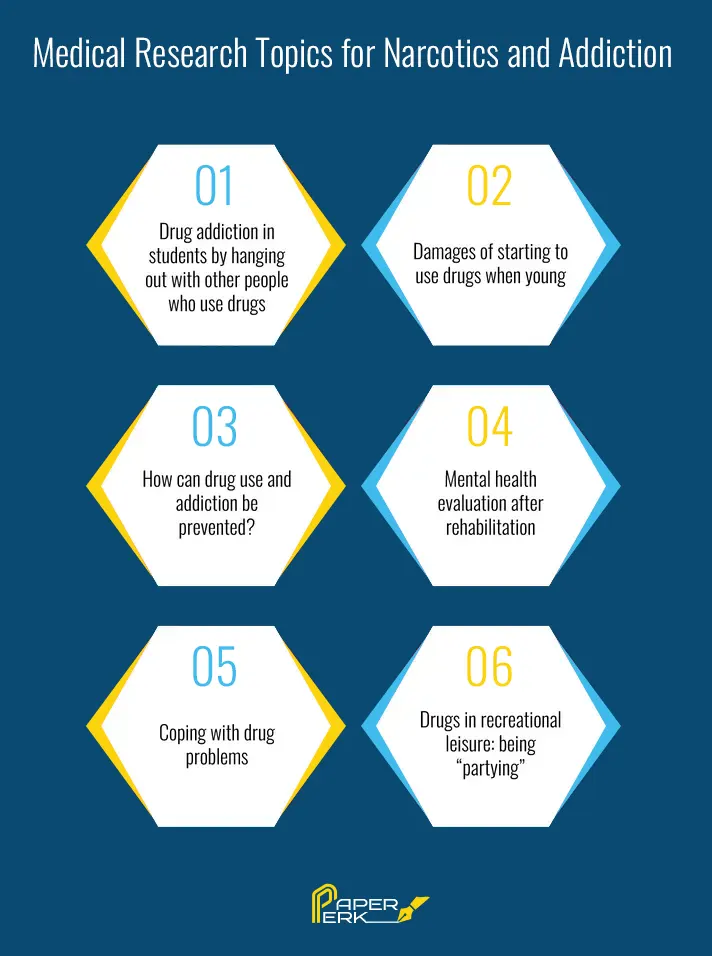
- Drug addiction in students by hanging out with other people who use drugs
- Damages of starting to use drugs when young
- What are the treatments for drug addiction?
- Learning to deal with your problems so you don’t use drugs again
- Medicines that help with drugs withdrawal symptoms
- Drug addiction among mentally struggling individuals
- Treatment and rehabilitation facilities for drug addicts with mental problems
- Drug addiction and poor condition of rehabilitation facilities in developing countries
- How can drug use and addiction be prevented?
- Mental health evaluation after rehabilitation
- Coping with drug problems
- Driving under the influence of drugs: Law and Penalties
- Overdose and poisoning with heroin
- First aid in cases of drug addiction
- Drug and Alcohol Abuse Treatment
- Approach to the magnitude of the abuse/dependency problem based on the demand for care and treatment
- Identifying the attended and unattended demand related to drug use
- Drugs Addiction: Myths and Facts
- Useful in the comparison of socio-demographic profiles, consumption patterns, and types of substances among the users
- Support networks in relation to drug use
- Drugs in everyday environments
- Drugs in recreational leisure: being “partying”
- Adolescents and drugs: their relationship with delinquency
- Drug tests and approaches to improve them
- Use of drugs in minors and juveniles
Satisfied with these medical topics for research papers? If not, check out the next section where you can get new medical research topics related to cancer.
Read More: Accounting Research Topics
Medical Research Topics About Cancer
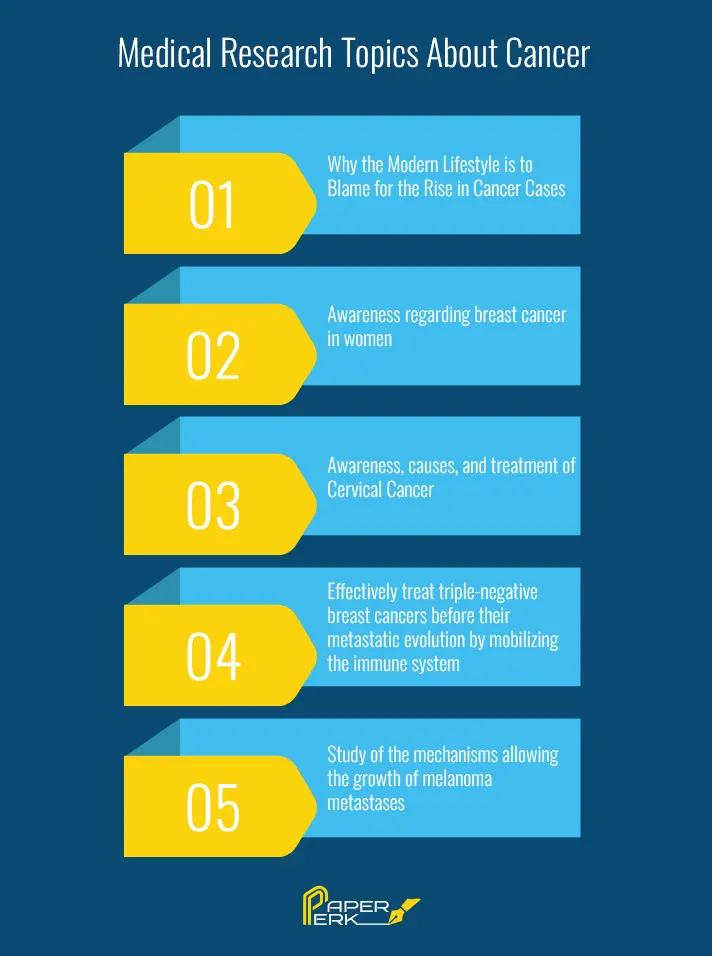
- Why the Modern Lifestyle is to Blame for the Rise in Cancer Cases
- Awareness regarding breast cancer in women
- Awareness, causes, and treatment of Cervical Cancer
- Research proposal about ovarian cancer
- Early-stage breast cancer treatment
- Role of chlorofluorocarbons in the rising number of cancer patients
- Is it possible that electromagnetic radiation or electromagnetic waves from phones can cause cancer?
- Understanding the role of fibroblasts in improving the response to immunotherapies in lung cancer
- Study of the surface of some of the medulloblastomas
- Comorbidities and co-medications in ovarian and endometrial cancer
- Describe the behavior of anti-tumor lymphocytes to improve immunotherapies in lung cancer
- Important advances in the development of new tests for the early detection of cancer
- Putting lung cancers on a chip to test their response to immunotherapies
- Evaluating sulfasalazine for acute myeloid leukemia in elderly patients
- Predicting the response to chemotherapy in pancreatic cancers
- Fight against fibroblasts associated with resistance to immunotherapies
- Designing a new therapeutic approach to HER2+ breast cancer
- Effectively treat triple-negative breast cancers before their metastatic evolution by mobilizing the immune system
- Validate a new therapeutic target against secondary lymphedema
- Study macrophage migration in tumors
- Role of the biological clock in the progression of hepatocellular carcinoma
- Predicting the efficacy of immunotherapy in non-small cell lung cancer
- Predicting the response to the combination of radiotherapy and immunotherapy
- Targeting the cell skeleton to block tumor proliferation
- Study of the mechanisms allowing the growth of melanoma metastases
- Targeting cancer stem cells to counter radiotherapy resistance in breast cancers
- Study of tumor heterogeneity in breast cancers
- Evaluation of Tumor Heterogeneity in Parametric Imaging
- Molecular characterization of rare breast tumors
- Prevent fibrosis induced by radiotherapy
Our team’s effort in providing you with medical term paper topics is praiseworthy. You can choose any one from the list and write mesmerising details on these subjects.
Read More: Legal Research Paper Topics
Medical History Research Topics
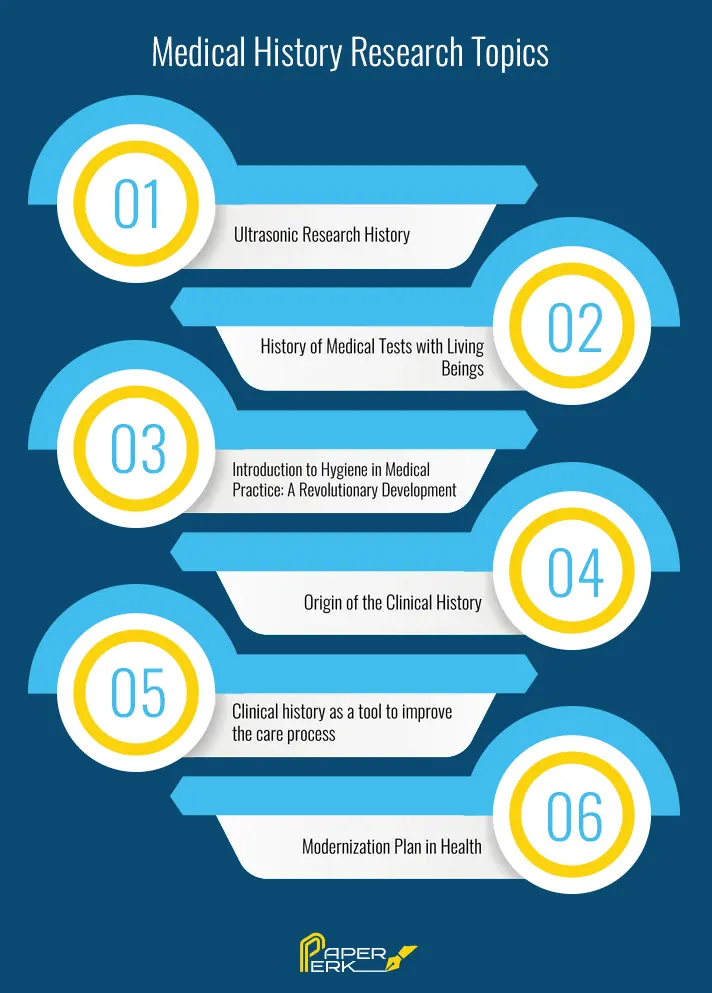
- Ultrasonic Research History
- History of Medical Tests with Living Beings
- History of the Development of Modern Psychiatry
- History of the Development of Osteopathic Medicine
- Medical history: content, property, and access
- From medical records to electronic health records: The course of medical history
- History of X-Ray Photography and its Efficacy in the Diagnosis of Pulmonary Disease
- Introduction to Hygiene in Medical Practice: A Revolutionary Development
- Application of Drugs of Frequent Abuse in Medical Practice
- Origin of the Clinical History
- Theory of ICT inclusion in the Public Health Administration
- Electronic Medical Records
- Psychological and social aspects of clinical history
- Evolution of the Clinical History
- Clinical history as a tool to improve the care process
- Modernization Plan in Health
- Physicians in Totalitarian Regimes, Service Assassins, or Victims of the System?
Read More: History Research topics
Genetics Research Topics
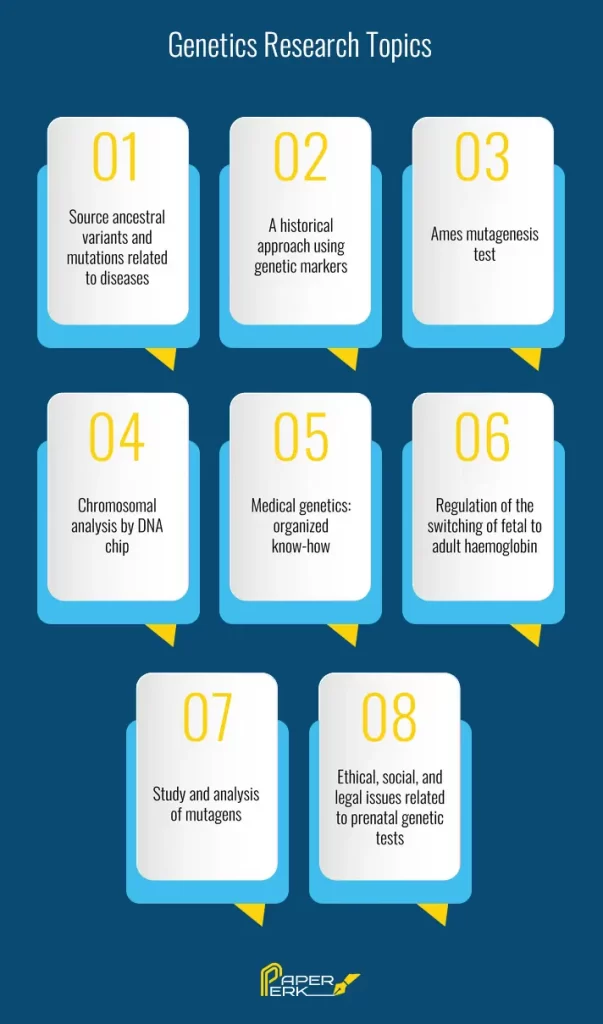
- Source ancestral variants and mutations related to diseases
- Origin, migrations, and phylogenetic relationship of original populations, component
- Genetic Ancestry
- Nutrigenomics: identification of markers associated with nutritional problems such as obesity, malnutrition, food intolerance
- Process and origin of ames mutagenesis
- Genetic basis of adverse reactions with Pharmacovigilance Center
- Chromosomal aberrations
- Tests to determine damage to genetic material
- A historical approach using genetic markers
- Ames mutagenesis test
- Immunogenetics: Human genomic variants associated with infectious diseases and
- immune response
- Genetic anomalies and autoimmune diseases
- Genetic Response to Xenobiotics
- Chromosomal analysis
- Pharmacogenomics: variation in the metabolism of xenobiotics, including drugs
- Personalized medicine according to tumor mutation
- Genetic Analysis of COVID-19 Specimen
- Genetic components in chronic diseases
- Rare or Orphan Genetic Diseases
- Unusual aspects of hereditary transmission
- Multifactorial (complex) inheritance
- Factors affecting gene expression
- Monogenic abnormalities
- General Review of Genetics
- New generations of sequencers
- The development of pharmacogenetic tests
- Chromosomal analysis by DNA chip
- Medical genetics: organized know-how
- Essentials of Genetics
- Regulation of the switching of fetal to adult hemoglobin
- Study of a new factor involved in the biosynthesis of the bacterial wall
- Genetic screening and functional characterization of mutations
- Physiological and genetic characterization of epilepsies: Comparison of humans and in animal models
- Communication of genetic research results: a reflection of parents with autistic children
- Characterization of biodiversity using genetic analysis
- Biotechnology and patents: the case of pharmacogenomics
- Study and analysis of mutagens
- Ethical, social, and legal issues related to prenatal genetic tests
Read More: Music Research Topics
Clinical Research Topics
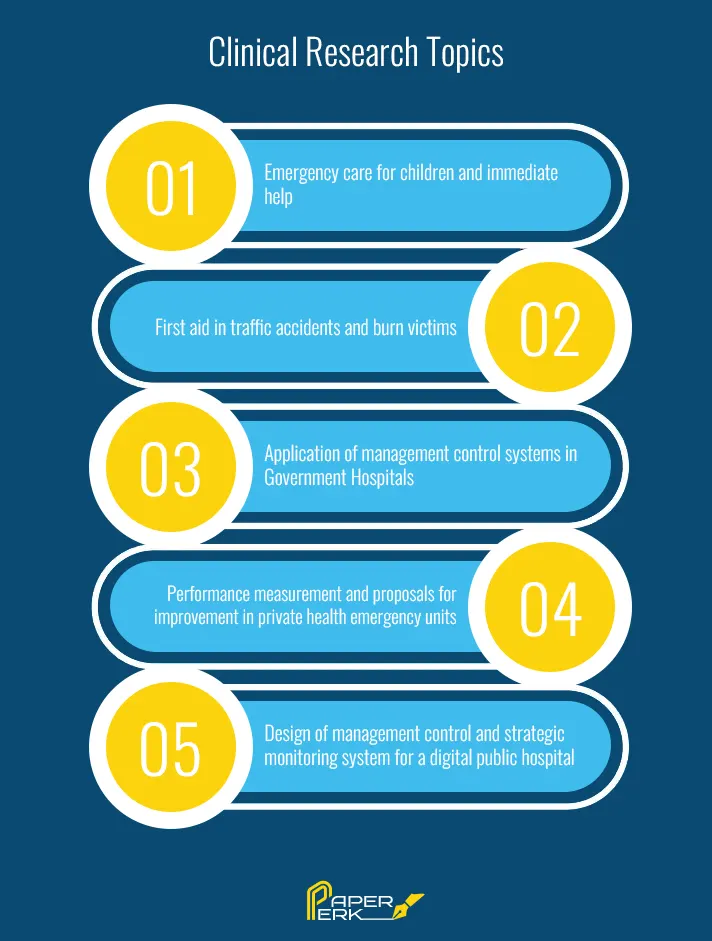
- Medical Education
- Cooperation with patients and the public and experiential knowledge
- Subtle health approaches for people who use drugs
- Front-line clinical and organizational practices
- Prevention and management of chronic diseases
- Critical care and first-line care
- Emergency care for children and immediate help
- First aid in traffic accidents and burn victims
- Fostering community consultation and research collaboration
- Results of choosing to do an arthritis research project
- How to deal with patients from different religious and cultural backgrounds
- Clinical case and literature reviews
- Evaluation of user interfaces in mobile health applications
- Evaluation of the manufacturing process of antimicrobial removable dental prostheses
- Evaluation of the acquisition of clinical reasoning
- Chemistry and Pharmacy Career In The United States
- Pharmacogenetics in the clinical laboratories
- Clinical supervision and coordination
- Model to estimate the demand and manage the inventory of standardized antibiotics
- Indicators for evaluating the management of special mental health care units
- Application of management control systems in Government Hospitals
- Performance measurement and proposals for improvement in private health emergency units
- Review and analysis of the requirements to register pharmaceutical products in the United States of America
- From traditional pharmaceutical marketing to digital pharmaceutical marketing in direct sales of pharmaceutical products
- Situational analysis of Herceptin Subcutaneous
- Malignant Hyperthermia
- Description of clinical records of dogs and cats with urinary tract infections
- Bone metabolism markers in gingival crevicular fluid as a potential diagnostic tool for chronic inflammatory diseases
- Review and regularization of technical documentation of health registration of pharmaceutical products in the area of regulatory affairs
- Design of a strategy to incorporate an electronic medical record system in an oncology clinic
- Characterization of the implementation of professionalism in the form of nursing students
- Implementation of a diagnostic method for avian botulism and its application
- Behavior against leaks post sleeve gastrectomy
- Optimization of packaging processes in a pharmaceutical laboratory
- Design of management control and strategic monitoring system for a digital public hospital with concession operations
Read More: Nursing Research Topics
Controversial Medical Research Topics
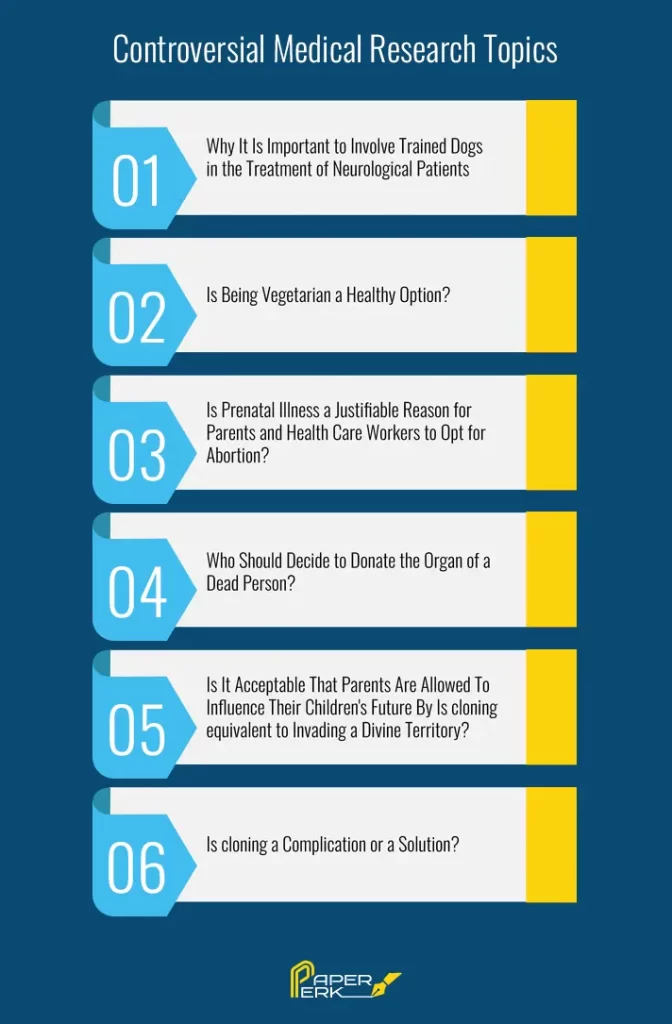
- Is It Critical to Shift Scientific Research Toward Adult Stem Cells Instead of Embryonic Stem Cells?
- Should the world Open an Organ Market?
- Should Society Turn to Alternative Medicine?
- Should Eating Disorders be considered Medical Illnesses?
- What is the New Problem Created by Electronic Cigarettes?
- How Does Stress Affect Health Development?
- What is the Role of Physical Exercises in the Prevention of Heart-Related Diseases?
- How is Formula Feeding Related to Early Childhood Obesity?
- What is the Role of the Family in the Treatment of Sleep Disorders?
- Social Factors Affecting the Development of Schizophrenia and Final Progression
- Why It’s Important to Raise Public Awareness of Bipolar Disorder
- How Breastfeeding Affects a Child’s Future Development
- Is an Anti-Tobacco Campaign Effective from a Medical Point of View?
- Why It Is Important to Involve Trained Dogs in the Treatment of Neurological Patients
- Is Being Vegetarian a Healthy Option?
- Is Prenatal Illness a Justifiable Reason for Parents and Health Care Workers to Opt for Abortion?
- Who Should Decide to Donate the Organ of a Dead Person?
- Is It Acceptable That Parents Are Allowed To Influence Their Children’s Future By Predetermining Their Hair Color Or Gender?
- Can a person be forced to donate organs under any condition?
- Where is the Line Drawn Between Social Security and the Right to Privacy?
- Can the Death Penalty be Executed Humanely?
- Is there room for Medical Errors when it comes to Euthanasia?
- Is cloning equivalent to Invading a Divine Territory?
- Is cloning a Complication or a Solution?
Read More: Political Science Research Topics
Medical Research Topics about Diabetes
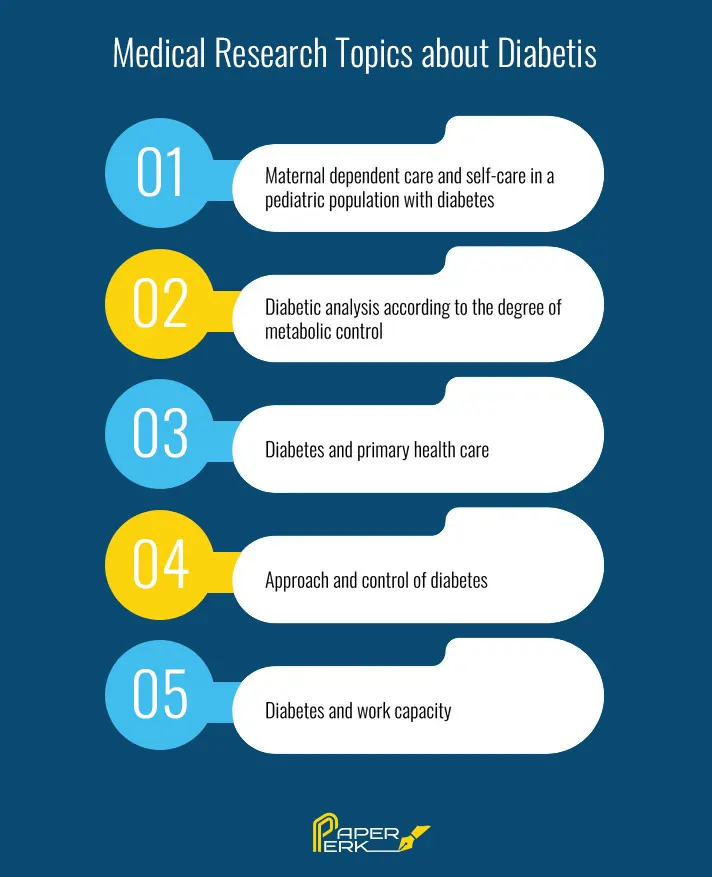
- The Growing Concern About the Increase in Cases of Insulin Resistance
- Relationship between metabolic control of patients with diabetes and work absenteeism
- Resistance in adolescents with secondary education
- Peripheral neuropathy in lower limbs in people with type 2 diabetes
- Risk factors in first-degree relatives of adults with diabetes
- The pattern of alcohol consumption in the population with diabetes
- The participation of the family in the control of the patient with diabetes
- Research to identify how anxiety and depression affect glucose levels in some patients
- Personal factors, perceived barriers, and consultation attendance of people with type 2 diabetes
- Personal factors, social support, and lifestyle of the diabetic patient
- Muscular endurance exercise in adults with diabetes
- Maternal dependent care and self-care in a pediatric population with diabetes
- Health-promoting behaviors in adults with diabetic patients
- Dental caries and non-insulin-dependent diabetes mellitus
- Characteristics of diabetes
- Diabetic analysis according to the degree of metabolic control
- Characteristics of episodes of temporary disability in the diabetic population
- Limitations and strengths of the studies related to diabetes
- Disability episodes according to the degree of metabolic control
- Characteristics of the population of diabetic and non-diabetic women
- Diabetes and primary health care
- Approach and control of diabetes
- Diabetes and work capacity
- Glycemic control and presence of complications
- Regulation of diet for people with diabetes
Read More: Psychology Research Paper Topics
Medical Research Topics: Infectious Diseases
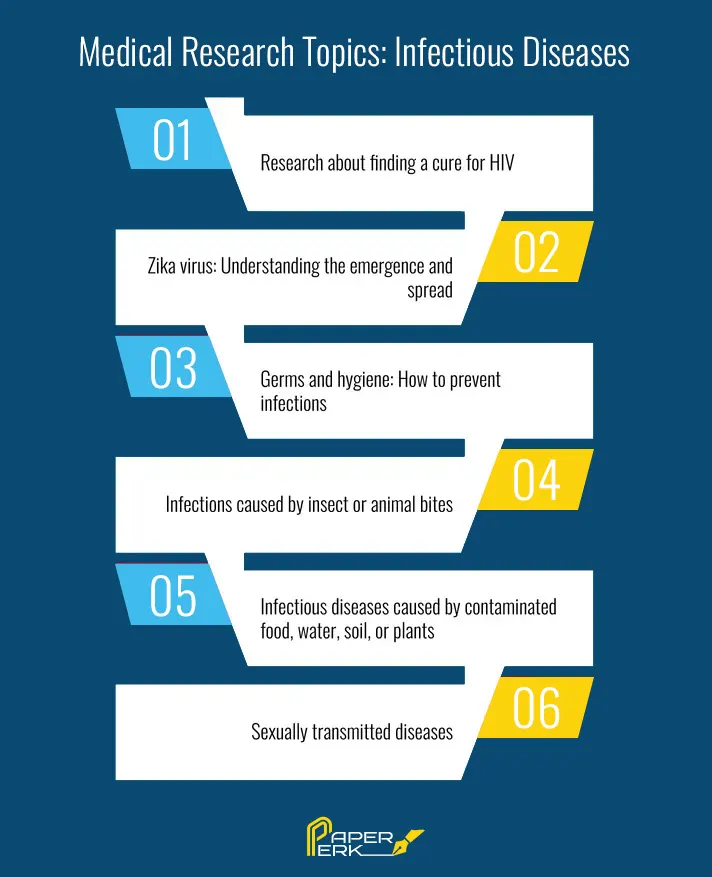
- Is attention focused on death from HIV/AIDS?
- Effects of Pandemic Diseases on Human Society and the Development of Medicine
- Recurrent infections in children
- Chronic Infectious diseases
- Information and research on infectious diseases : Past and Present
- Future of research and remedies for infectious diseases
- Research about finding a cure for HIV
- Zika virus: Understanding the emergence and spread
- Antibiotic resistance
- People with cancer suffering from infectious diseases
- Difference between viral and bacterial infections
- Difference between infectious and contagious
- Coping with stress and anxiety caused by a diseases outbreak
- Importance of hygiene in avoiding infections
- Germs and hygiene: How to prevent infections
- Understanding germs to protect yourself from infections caused by bacteria and viruses
- Dangers of sharing items like toothbrushes, combs, and straws
- Most frequent symptoms of infectious diseases
- Difference between the virus and bacteria: A genetic analysis
- Single-celled germs that multiply rapidly
- Infection caused through direct contact with a person who is sick
- Infections caused by insect or animal bites
- Infectious diseases caused by contaminated food, water, soil, or plants
- Sexually transmitted diseases
Read More: Research Paper Topics
Medical Research During COVID-19 Pandemic
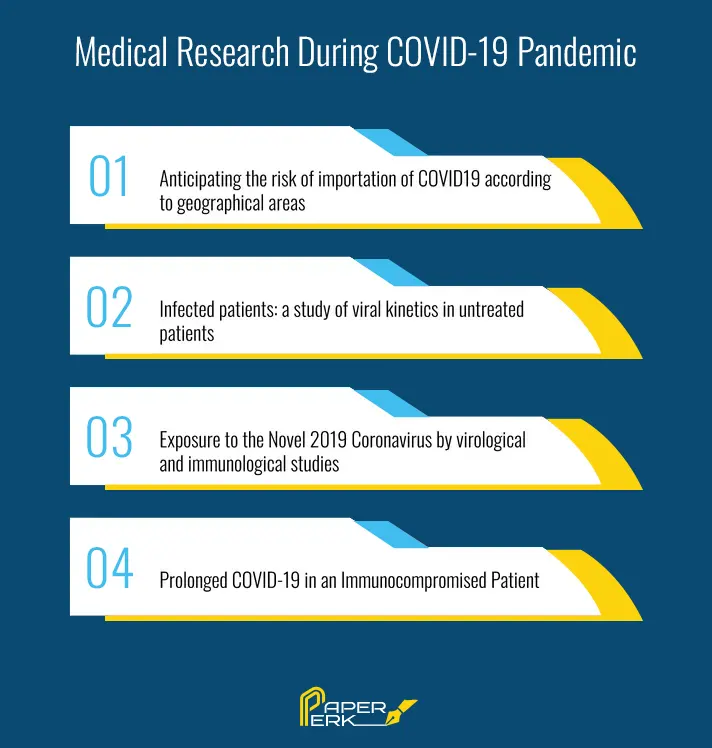
- Anticipating the risk of importation of COVID19 according to geographical areas
- Infected patients: a study of viral kinetics in untreated patients
- Utilizing social sciences to raise awareness among the public and prepare SOPs for the threat of Coronavirus
- Exposure to the Novel 2019 Coronavirus by virological and immunological studies
- Replicating Coronavirus for the purpose of virology research
- Global joint efforts to aware the public cooperate and contribute development the vaccine
- Which vaccine is better? A research analysis of every COVID-19 Vaccine available on the market
- Molecular Virology and Immunology Unit working on Coronavirus
- Establishment of the antibody profile in convalescent patients and development of serological tests
- Coronavirus spread risk in live animal markets and endangered wildlife
- Role of fruits in the maturation of the Spike protein of SARS-CoV-2
- Adaptive multicentre study of the efficacy and safety of treatments for a hospitalized patient with a COVID 2019 infection
- Prolonged COVID-19 in an Immunocompromised Patient
Read More: Social Work Research Topics
Mental Health Research Topics
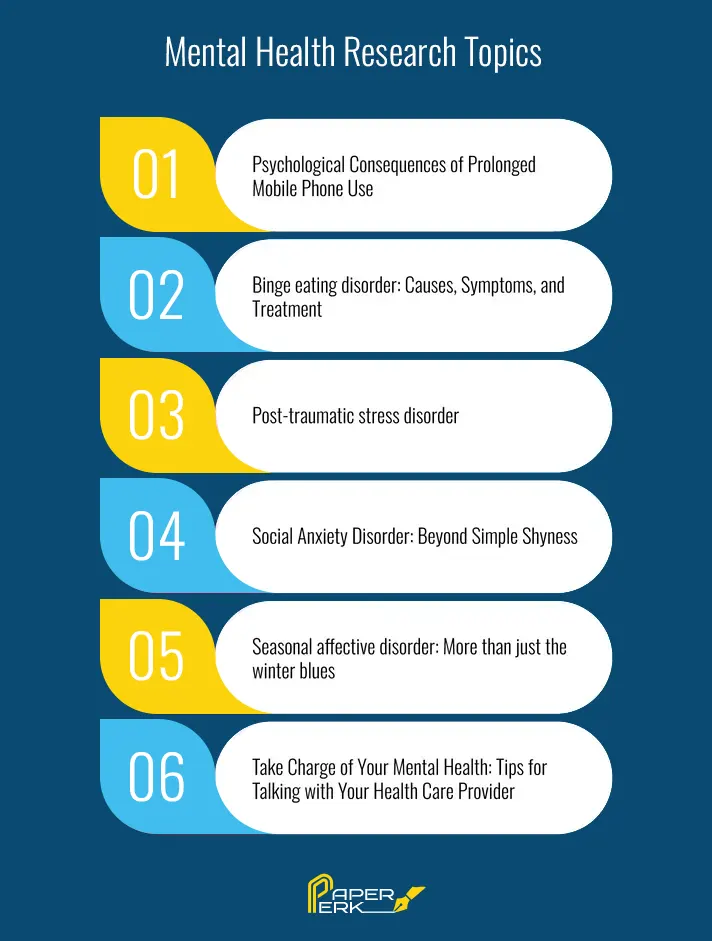
- Psychological Consequences of Prolonged Mobile Phone Use
- Binge eating disorder: Causes, Symptoms, and Treatment
- Autism spectrum disorders
- Borderline personality disorder
- Post-traumatic stress disorder
- Obsessive-compulsive disorder: When unwanted thoughts or repetitive behaviors take over
- Disruptive Mood Dysregulation Disorder: The Basics
- Panic disorder: When fear overwhelms
- Social Anxiety Disorder: Beyond Simple Shyness
- Generalized Anxiety Disorder: When You Can’t Control Worry
- Bipolar disorder in adolescents and young adults
- Bipolar disorder
- Seasonal affective disorder: More than just the winter blues
- Take Charge of Your Mental Health: Tips for Talking with Your Health Care Provider
- Frequently asked questions about suicide: How to deal and prevent suicidal behavior
- Do genes affect our mental health? What Can They Tell Me About our Mental Health?
- Eating disorders: A problem that goes beyond food
Read More: US History Research Topics
Topics for Women’s Health in Medical Research
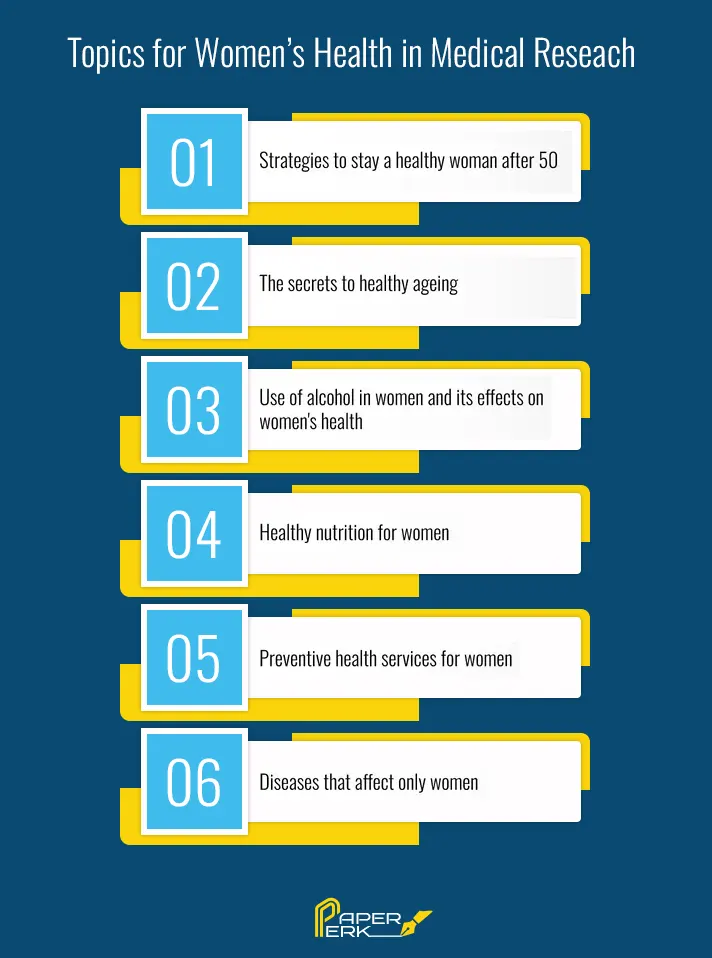
- Strategies to stay a healthy woman after 50
- The secrets to healthy aging
- Can being male or female have any effects on your health? How and why?
- Use of alcohol in women and its effects on women’s health
- Awareness regarding gynecologic cancer in women
- Healthy nutrition for women
- Women’s body image: Keys to perfect fitness
- Preventive health services for women
- Women’s health in developing countries
- What health threats or diseases affect women differently than men?
- What health threats are specific for women only?
- What women can do to maintain your health
- Stay healthy at any age: Keys to growing fit for women.
- Women’s mental health
- Diseases that affect only women
You might become a doctor or a nurse. Either way, it means that one day you will have to save lives. With that critical matter, you have to be extra careful to choose what you study. Whatever topic you choose, must be the one that moves your heart. It will tire you and affect your progress if it doesn’t inspire you enough. In that case, these medical topics for research will provide you with the surety of what goes perfect for you.
If you still feel any confusion, got any questions, you can reach out to our experts on our contact page. If you need the help of an expert writer to write your research paper, place your order and hire our paper writing services at Paper Perk.
Order Original Papers & Essays
Your First Custom Paper Sample is on Us!
Timely Deliveries
No Plagiarism & AI
100% Refund
Try Our Free Paper Writing Service
Related blogs.

Connections with Writers and support
Privacy and Confidentiality Guarantee
Average Quality Score
55 research questions about mental health
Last updated
11 March 2024
Reviewed by
Brittany Ferri, PhD, OTR/L
Research in the mental health space helps fill knowledge gaps and create a fuller picture for patients, healthcare professionals, and policymakers. Over time, these efforts result in better quality care and more accessible treatment options for those who need them.
Use this list of mental health research questions to kickstart your next project or assignment and give yourself the best chance of producing successful and fulfilling research.
- Why does mental health research matter?
Mental health research is an essential area of study. It includes any research that focuses on topics related to people’s mental and emotional well-being.
As a complex health topic that, despite the prevalence of mental health conditions, still has an unending number of unanswered questions, the need for thorough research into causes, triggers, and treatment options is clear.
Research into this heavily stigmatized and often misunderstood topic is needed to find better ways to support people struggling with mental health conditions. Understanding what causes them is another crucial area of study, as it enables individuals, companies, and policymakers to make well-informed choices that can help prevent illnesses like anxiety and depression.
- How to choose a strong mental health research topic
As one of the most important parts of beginning a new research project, picking a topic that is intriguing, unique, and in demand is a great way to get the best results from your efforts.
Mental health is a blanket term with many niches and specific areas to explore. But, no matter which direction you choose, follow the tips below to ensure you pick the right topic.
Prioritize your interests and skills
While a big part of research is exploring a new and exciting topic, this exploration is best done within a topic or niche in which you are interested and experienced.
Research is tough, even at the best of times. To combat fatigue and increase your chances of pushing through to the finish line, we recommend choosing a topic that aligns with your personal interests, training, or skill set.
Consider emerging trends
Topical and current research questions are hot commodities because they offer solutions and insights into culturally and socially relevant problems.
Depending on the scope and level of freedom you have with your upcoming research project, choosing a topic that’s trending in your area of study is one way to get support and funding (if you need it).
Not every study can be based on a cutting-edge topic, but this can be a great way to explore a new space and create baseline research data for future studies.
Assess your resources and timeline
Before choosing a super ambitious and exciting research topic, consider your project restrictions.
You’ll need to think about things like your research timeline, access to resources and funding, and expected project scope when deciding how broad your research topic will be. In most cases, it’s better to start small and focus on a specific area of study.
Broad research projects are expensive and labor and resource-intensive. They can take years or even decades to complete. Before biting off more than you can chew, consider your scope and find a research question that fits within it.
Read up on the latest research
Finally, once you have narrowed in on a specific topic, you need to read up on the latest studies and published research. A thorough research assessment is a great way to gain some background context on your chosen topic and stops you from repeating a study design. Using the existing work as your guide, you can explore more specific and niche questions to provide highly beneficial answers and insights.
- Trending research questions for post-secondary students
As a post-secondary student, finding interesting research questions that fit within the scope of your classes or resources can be challenging. But, with a little bit of effort and pre-planning, you can find unique mental health research topics that will meet your class or project requirements.
Examples of research topics for post-secondary students include the following:
How does school-related stress impact a person’s mental health?
To what extent does burnout impact mental health in medical students?
How does chronic school stress impact a student’s physical health?
How does exam season affect the severity of mental health symptoms?
Is mental health counseling effective for students in an acute mental crisis?
- Research questions about anxiety and depression
Anxiety and depression are two of the most commonly spoken about mental health conditions. You might assume that research about these conditions has already been exhausted or that it’s no longer in demand. That’s not the case at all.
According to a 2022 survey by Centers for Disease Control and Prevention (CDC), 12.5% of American adults struggle with regular feelings of worry, nervousness, and anxiety, and 5% struggle with regular feelings of depression. These percentages amount to millions of lives affected, meaning new research into these conditions is essential.
If either of these topics interests you, here are a few trending research questions you could consider:
Does gender play a role in the early diagnosis of anxiety?
How does untreated anxiety impact quality of life?
What are the most common symptoms of anxiety in working professionals aged 20–29?
To what extent do treatment delays impact quality of life in patients with undiagnosed anxiety?
To what extent does stigma affect the quality of care received by people with anxiety?
Here are some examples of research questions about depression:
Does diet play a role in the severity of depression symptoms?
Can people have a genetic predisposition to developing depression?
How common is depression in work-from-home employees?
Does mood journaling help manage depression symptoms?
What role does exercise play in the management of depression symptoms?
- Research questions about personality disorders
Personality disorders are complex mental health conditions tied to a person’s behaviors, sense of self, and how they interact with the world around them. Without a diagnosis and treatment, people with personality disorders are more likely to develop negative coping strategies during periods of stress and adversity, which can impact their quality of life and relationships.
There’s no shortage of specific research questions in this category. Here are some examples of research questions about personality disorders that you could explore:
What environments are more likely to trigger the development of a personality disorder?
What barriers impact access to care for people with personality disorders?
To what extent does undiagnosed borderline personality disorder impact a person’s ability to build relationships?
How does group therapy impact symptom severity in people with schizotypal personality disorder?
What is the treatment compliance rate of people with paranoid personality disorder?
- Research questions about substance use disorders
“Substance use disorders” is a blanket term for treatable behaviors and patterns within a person’s brain that lead them to become dependent on illicit drugs, alcohol, or prescription medications. It’s one of the most stigmatized mental health categories.
The severity of a person’s symptoms and how they impact their ability to participate in their regular daily life can vary significantly from person to person. But, even in less severe cases, people with a substance use disorder display some level of loss of control due to their need to use the substance they are dependent on.
This is an ever-evolving topic where research is in hot demand. Here are some example research questions:
To what extent do meditation practices help with craving management?
How effective are detox centers in treating acute substance use disorder?
Are there genetic factors that increase a person’s chances of developing a substance use disorder?
How prevalent are substance use disorders in immigrant populations?
To what extent do prescription medications play a role in developing substance use disorders?
- Research questions about mental health treatments
Treatments for mental health, pharmaceutical therapies in particular, are a common topic for research and exploration in this space.
Besides the clinical trials required for a drug to receive FDA approval, studies into the efficacy, risks, and patient experiences are essential to better understand mental health therapies.
These types of studies can easily become large in scope, but it’s possible to conduct small cohort research on mental health therapies that can provide helpful insights into the actual experiences of the people receiving these treatments.
Here are some questions you might consider:
What are the long-term effects of electroconvulsive therapy (ECT) for patients with severe depression?
How common is insomnia as a side effect of oral mental health medications?
What are the most common causes of non-compliance for mental health treatments?
How long does it take for patients to report noticeable changes in symptom severity after starting injectable mental health medications?
What issues are most common when weaning a patient off of an anxiety medication?
- Controversial mental health research questions
If you’re interested in exploring more cutting-edge research topics, you might consider one that’s “controversial.”
Depending on your own personal values, you might not think many of these topics are controversial. In the context of the research environment, this depends on the perspectives of your project lead and the desires of your sponsors. These topics may not align with the preferred subject matter.
That being said, that doesn’t make them any less worth exploring. In many cases, it makes them more worthwhile, as they encourage people to ask questions and think critically.
Here are just a few examples of “controversial” mental health research questions:
To what extent do financial crises impact mental health in young adults?
How have climate concerns impacted anxiety levels in young adults?
To what extent do psychotropic drugs help patients struggling with anxiety and depression?
To what extent does political reform impact the mental health of LGBTQ+ people?
What mental health supports should be available for the families of people who opt for medically assisted dying?
- Research questions about socioeconomic factors & mental health
Socioeconomic factors—like where a person grew up, their annual income, the communities they are exposed to, and the amount, type, and quality of mental health resources they have access to—significantly impact overall health.
This is a complex and multifaceted issue. Choosing a research question that addresses these topics can help researchers, experts, and policymakers provide more equitable and accessible care over time.
Examples of questions that tackle socioeconomic factors and mental health include the following:
How does sliding scale pricing for therapy increase retention rates?
What is the average cost to access acute mental health crisis care in [a specific region]?
To what extent does a person’s environment impact their risk of developing a mental health condition?
How does mental health stigma impact early detection of mental health conditions?
To what extent does discrimination affect the mental health of LGBTQ+ people?
- Research questions about the benefits of therapy
Therapy, whether that’s in groups or one-to-one sessions, is one of the most commonly utilized resources for managing mental health conditions. It can help support long-term healing and the development of coping mechanisms.
Yet, despite its popularity, more research is needed to properly understand its benefits and limitations.
Here are some therapy-based questions you could consider to inspire your own research:
In what instances does group therapy benefit people more than solo sessions?
How effective is cognitive behavioral therapy for patients with severe anxiety?
After how many therapy sessions do people report feeling a better sense of self?
Does including meditation reminders during therapy improve patient outcomes?
To what extent has virtual therapy improved access to mental health resources in rural areas?
- Research questions about mental health trends in teens
Adolescents are a particularly interesting group for mental health research due to the prevalence of early-onset mental health symptoms in this age group.
As a time of self-discovery and change, puberty brings plenty of stress, anxiety, and hardships, all of which can contribute to worsening mental health symptoms.
If you’re looking to learn more about how to support this age group with mental health, here are some examples of questions you could explore:
Does parenting style impact anxiety rates in teens?
How early should teenagers receive mental health treatment?
To what extent does cyberbullying impact adolescent mental health?
What are the most common harmful coping mechanisms explored by teens?
How have smartphones affected teenagers’ self-worth and sense of self?
- Research questions about social media and mental health
Social media platforms like TikTok, Instagram, YouTube, Facebook, and X (formerly Twitter) have significantly impacted day-to-day communication. However, despite their numerous benefits and uses, they have also become a significant source of stress, anxiety, and self-worth issues for those who use them.
These platforms have been around for a while now, but research on their impact is still in its infancy. Are you interested in building knowledge about this ever-changing topic? Here are some examples of social media research questions you could consider:
To what extent does TikTok’s mental health content impact people’s perception of their health?
How much non-professional mental health content is created on social media platforms?
How has social media content increased the likelihood of a teen self-identifying themselves with ADHD or autism?
To what extent do social media photoshopped images impact body image and self-worth?
Has social media access increased feelings of anxiety and dread in young adults?
- Mental health research is incredibly important
As you have seen, there are so many unique mental health research questions worth exploring. Which options are piquing your interest?
Whether you are a university student considering your next paper topic or a professional looking to explore a new area of study, mental health is an exciting and ever-changing area of research to get involved with.
Your research will be valuable, no matter how big or small. As a niche area of healthcare still shrouded in stigma, any insights you gain into new ways to support, treat, or identify mental health triggers and trends are a net positive for millions of people worldwide.
Get started today
Go from raw data to valuable insights with a flexible research platform
Editor’s picks
Last updated: 21 December 2023
Last updated: 16 December 2023
Last updated: 6 October 2023
Last updated: 5 March 2024
Last updated: 25 November 2023
Last updated: 15 February 2024
Last updated: 11 March 2024
Last updated: 12 December 2023
Last updated: 6 March 2024
Last updated: 10 April 2023
Last updated: 20 December 2023
Latest articles
Related topics, log in or sign up.
Get started for free

Choose Your Test
Sat / act prep online guides and tips, 113 great research paper topics.
General Education

One of the hardest parts of writing a research paper can be just finding a good topic to write about. Fortunately we've done the hard work for you and have compiled a list of 113 interesting research paper topics. They've been organized into ten categories and cover a wide range of subjects so you can easily find the best topic for you.
In addition to the list of good research topics, we've included advice on what makes a good research paper topic and how you can use your topic to start writing a great paper.
What Makes a Good Research Paper Topic?
Not all research paper topics are created equal, and you want to make sure you choose a great topic before you start writing. Below are the three most important factors to consider to make sure you choose the best research paper topics.
#1: It's Something You're Interested In
A paper is always easier to write if you're interested in the topic, and you'll be more motivated to do in-depth research and write a paper that really covers the entire subject. Even if a certain research paper topic is getting a lot of buzz right now or other people seem interested in writing about it, don't feel tempted to make it your topic unless you genuinely have some sort of interest in it as well.
#2: There's Enough Information to Write a Paper
Even if you come up with the absolute best research paper topic and you're so excited to write about it, you won't be able to produce a good paper if there isn't enough research about the topic. This can happen for very specific or specialized topics, as well as topics that are too new to have enough research done on them at the moment. Easy research paper topics will always be topics with enough information to write a full-length paper.
Trying to write a research paper on a topic that doesn't have much research on it is incredibly hard, so before you decide on a topic, do a bit of preliminary searching and make sure you'll have all the information you need to write your paper.
#3: It Fits Your Teacher's Guidelines
Don't get so carried away looking at lists of research paper topics that you forget any requirements or restrictions your teacher may have put on research topic ideas. If you're writing a research paper on a health-related topic, deciding to write about the impact of rap on the music scene probably won't be allowed, but there may be some sort of leeway. For example, if you're really interested in current events but your teacher wants you to write a research paper on a history topic, you may be able to choose a topic that fits both categories, like exploring the relationship between the US and North Korea. No matter what, always get your research paper topic approved by your teacher first before you begin writing.
113 Good Research Paper Topics
Below are 113 good research topics to help you get you started on your paper. We've organized them into ten categories to make it easier to find the type of research paper topics you're looking for.
Arts/Culture
- Discuss the main differences in art from the Italian Renaissance and the Northern Renaissance .
- Analyze the impact a famous artist had on the world.
- How is sexism portrayed in different types of media (music, film, video games, etc.)? Has the amount/type of sexism changed over the years?
- How has the music of slaves brought over from Africa shaped modern American music?
- How has rap music evolved in the past decade?
- How has the portrayal of minorities in the media changed?

Current Events
- What have been the impacts of China's one child policy?
- How have the goals of feminists changed over the decades?
- How has the Trump presidency changed international relations?
- Analyze the history of the relationship between the United States and North Korea.
- What factors contributed to the current decline in the rate of unemployment?
- What have been the impacts of states which have increased their minimum wage?
- How do US immigration laws compare to immigration laws of other countries?
- How have the US's immigration laws changed in the past few years/decades?
- How has the Black Lives Matter movement affected discussions and view about racism in the US?
- What impact has the Affordable Care Act had on healthcare in the US?
- What factors contributed to the UK deciding to leave the EU (Brexit)?
- What factors contributed to China becoming an economic power?
- Discuss the history of Bitcoin or other cryptocurrencies (some of which tokenize the S&P 500 Index on the blockchain) .
- Do students in schools that eliminate grades do better in college and their careers?
- Do students from wealthier backgrounds score higher on standardized tests?
- Do students who receive free meals at school get higher grades compared to when they weren't receiving a free meal?
- Do students who attend charter schools score higher on standardized tests than students in public schools?
- Do students learn better in same-sex classrooms?
- How does giving each student access to an iPad or laptop affect their studies?
- What are the benefits and drawbacks of the Montessori Method ?
- Do children who attend preschool do better in school later on?
- What was the impact of the No Child Left Behind act?
- How does the US education system compare to education systems in other countries?
- What impact does mandatory physical education classes have on students' health?
- Which methods are most effective at reducing bullying in schools?
- Do homeschoolers who attend college do as well as students who attended traditional schools?
- Does offering tenure increase or decrease quality of teaching?
- How does college debt affect future life choices of students?
- Should graduate students be able to form unions?

- What are different ways to lower gun-related deaths in the US?
- How and why have divorce rates changed over time?
- Is affirmative action still necessary in education and/or the workplace?
- Should physician-assisted suicide be legal?
- How has stem cell research impacted the medical field?
- How can human trafficking be reduced in the United States/world?
- Should people be able to donate organs in exchange for money?
- Which types of juvenile punishment have proven most effective at preventing future crimes?
- Has the increase in US airport security made passengers safer?
- Analyze the immigration policies of certain countries and how they are similar and different from one another.
- Several states have legalized recreational marijuana. What positive and negative impacts have they experienced as a result?
- Do tariffs increase the number of domestic jobs?
- Which prison reforms have proven most effective?
- Should governments be able to censor certain information on the internet?
- Which methods/programs have been most effective at reducing teen pregnancy?
- What are the benefits and drawbacks of the Keto diet?
- How effective are different exercise regimes for losing weight and maintaining weight loss?
- How do the healthcare plans of various countries differ from each other?
- What are the most effective ways to treat depression ?
- What are the pros and cons of genetically modified foods?
- Which methods are most effective for improving memory?
- What can be done to lower healthcare costs in the US?
- What factors contributed to the current opioid crisis?
- Analyze the history and impact of the HIV/AIDS epidemic .
- Are low-carbohydrate or low-fat diets more effective for weight loss?
- How much exercise should the average adult be getting each week?
- Which methods are most effective to get parents to vaccinate their children?
- What are the pros and cons of clean needle programs?
- How does stress affect the body?
- Discuss the history of the conflict between Israel and the Palestinians.
- What were the causes and effects of the Salem Witch Trials?
- Who was responsible for the Iran-Contra situation?
- How has New Orleans and the government's response to natural disasters changed since Hurricane Katrina?
- What events led to the fall of the Roman Empire?
- What were the impacts of British rule in India ?
- Was the atomic bombing of Hiroshima and Nagasaki necessary?
- What were the successes and failures of the women's suffrage movement in the United States?
- What were the causes of the Civil War?
- How did Abraham Lincoln's assassination impact the country and reconstruction after the Civil War?
- Which factors contributed to the colonies winning the American Revolution?
- What caused Hitler's rise to power?
- Discuss how a specific invention impacted history.
- What led to Cleopatra's fall as ruler of Egypt?
- How has Japan changed and evolved over the centuries?
- What were the causes of the Rwandan genocide ?

- Why did Martin Luther decide to split with the Catholic Church?
- Analyze the history and impact of a well-known cult (Jonestown, Manson family, etc.)
- How did the sexual abuse scandal impact how people view the Catholic Church?
- How has the Catholic church's power changed over the past decades/centuries?
- What are the causes behind the rise in atheism/ agnosticism in the United States?
- What were the influences in Siddhartha's life resulted in him becoming the Buddha?
- How has media portrayal of Islam/Muslims changed since September 11th?
Science/Environment
- How has the earth's climate changed in the past few decades?
- How has the use and elimination of DDT affected bird populations in the US?
- Analyze how the number and severity of natural disasters have increased in the past few decades.
- Analyze deforestation rates in a certain area or globally over a period of time.
- How have past oil spills changed regulations and cleanup methods?
- How has the Flint water crisis changed water regulation safety?
- What are the pros and cons of fracking?
- What impact has the Paris Climate Agreement had so far?
- What have NASA's biggest successes and failures been?
- How can we improve access to clean water around the world?
- Does ecotourism actually have a positive impact on the environment?
- Should the US rely on nuclear energy more?
- What can be done to save amphibian species currently at risk of extinction?
- What impact has climate change had on coral reefs?
- How are black holes created?
- Are teens who spend more time on social media more likely to suffer anxiety and/or depression?
- How will the loss of net neutrality affect internet users?
- Analyze the history and progress of self-driving vehicles.
- How has the use of drones changed surveillance and warfare methods?
- Has social media made people more or less connected?
- What progress has currently been made with artificial intelligence ?
- Do smartphones increase or decrease workplace productivity?
- What are the most effective ways to use technology in the classroom?
- How is Google search affecting our intelligence?
- When is the best age for a child to begin owning a smartphone?
- Has frequent texting reduced teen literacy rates?

How to Write a Great Research Paper
Even great research paper topics won't give you a great research paper if you don't hone your topic before and during the writing process. Follow these three tips to turn good research paper topics into great papers.
#1: Figure Out Your Thesis Early
Before you start writing a single word of your paper, you first need to know what your thesis will be. Your thesis is a statement that explains what you intend to prove/show in your paper. Every sentence in your research paper will relate back to your thesis, so you don't want to start writing without it!
As some examples, if you're writing a research paper on if students learn better in same-sex classrooms, your thesis might be "Research has shown that elementary-age students in same-sex classrooms score higher on standardized tests and report feeling more comfortable in the classroom."
If you're writing a paper on the causes of the Civil War, your thesis might be "While the dispute between the North and South over slavery is the most well-known cause of the Civil War, other key causes include differences in the economies of the North and South, states' rights, and territorial expansion."
#2: Back Every Statement Up With Research
Remember, this is a research paper you're writing, so you'll need to use lots of research to make your points. Every statement you give must be backed up with research, properly cited the way your teacher requested. You're allowed to include opinions of your own, but they must also be supported by the research you give.
#3: Do Your Research Before You Begin Writing
You don't want to start writing your research paper and then learn that there isn't enough research to back up the points you're making, or, even worse, that the research contradicts the points you're trying to make!
Get most of your research on your good research topics done before you begin writing. Then use the research you've collected to create a rough outline of what your paper will cover and the key points you're going to make. This will help keep your paper clear and organized, and it'll ensure you have enough research to produce a strong paper.
What's Next?
Are you also learning about dynamic equilibrium in your science class? We break this sometimes tricky concept down so it's easy to understand in our complete guide to dynamic equilibrium .
Thinking about becoming a nurse practitioner? Nurse practitioners have one of the fastest growing careers in the country, and we have all the information you need to know about what to expect from nurse practitioner school .
Want to know the fastest and easiest ways to convert between Fahrenheit and Celsius? We've got you covered! Check out our guide to the best ways to convert Celsius to Fahrenheit (or vice versa).
These recommendations are based solely on our knowledge and experience. If you purchase an item through one of our links, PrepScholar may receive a commission.

Christine graduated from Michigan State University with degrees in Environmental Biology and Geography and received her Master's from Duke University. In high school she scored in the 99th percentile on the SAT and was named a National Merit Finalist. She has taught English and biology in several countries.
Student and Parent Forum
Our new student and parent forum, at ExpertHub.PrepScholar.com , allow you to interact with your peers and the PrepScholar staff. See how other students and parents are navigating high school, college, and the college admissions process. Ask questions; get answers.

Ask a Question Below
Have any questions about this article or other topics? Ask below and we'll reply!
Improve With Our Famous Guides
- For All Students
The 5 Strategies You Must Be Using to Improve 160+ SAT Points
How to Get a Perfect 1600, by a Perfect Scorer
Series: How to Get 800 on Each SAT Section:
Score 800 on SAT Math
Score 800 on SAT Reading
Score 800 on SAT Writing
Series: How to Get to 600 on Each SAT Section:
Score 600 on SAT Math
Score 600 on SAT Reading
Score 600 on SAT Writing
Free Complete Official SAT Practice Tests
What SAT Target Score Should You Be Aiming For?
15 Strategies to Improve Your SAT Essay
The 5 Strategies You Must Be Using to Improve 4+ ACT Points
How to Get a Perfect 36 ACT, by a Perfect Scorer
Series: How to Get 36 on Each ACT Section:
36 on ACT English
36 on ACT Math
36 on ACT Reading
36 on ACT Science
Series: How to Get to 24 on Each ACT Section:
24 on ACT English
24 on ACT Math
24 on ACT Reading
24 on ACT Science
What ACT target score should you be aiming for?
ACT Vocabulary You Must Know
ACT Writing: 15 Tips to Raise Your Essay Score
How to Get Into Harvard and the Ivy League
How to Get a Perfect 4.0 GPA
How to Write an Amazing College Essay
What Exactly Are Colleges Looking For?
Is the ACT easier than the SAT? A Comprehensive Guide
Should you retake your SAT or ACT?
When should you take the SAT or ACT?
Stay Informed
Get the latest articles and test prep tips!
Looking for Graduate School Test Prep?
Check out our top-rated graduate blogs here:
GRE Online Prep Blog
GMAT Online Prep Blog
TOEFL Online Prep Blog
Holly R. "I am absolutely overjoyed and cannot thank you enough for helping me!”
- COVID-19 and your mental health
Worries and anxiety about COVID-19 can be overwhelming. Learn ways to cope as COVID-19 spreads.
At the start of the COVID-19 pandemic, life for many people changed very quickly. Worry and concern were natural partners of all that change — getting used to new routines, loneliness and financial pressure, among other issues. Information overload, rumor and misinformation didn't help.
Worldwide surveys done in 2020 and 2021 found higher than typical levels of stress, insomnia, anxiety and depression. By 2022, levels had lowered but were still higher than before 2020.
Though feelings of distress about COVID-19 may come and go, they are still an issue for many people. You aren't alone if you feel distress due to COVID-19. And you're not alone if you've coped with the stress in less than healthy ways, such as substance use.
But healthier self-care choices can help you cope with COVID-19 or any other challenge you may face.
And knowing when to get help can be the most essential self-care action of all.
Recognize what's typical and what's not
Stress and worry are common during a crisis. But something like the COVID-19 pandemic can push people beyond their ability to cope.
In surveys, the most common symptoms reported were trouble sleeping and feeling anxiety or nervous. The number of people noting those symptoms went up and down in surveys given over time. Depression and loneliness were less common than nervousness or sleep problems, but more consistent across surveys given over time. Among adults, use of drugs, alcohol and other intoxicating substances has increased over time as well.
The first step is to notice how often you feel helpless, sad, angry, irritable, hopeless, anxious or afraid. Some people may feel numb.
Keep track of how often you have trouble focusing on daily tasks or doing routine chores. Are there things that you used to enjoy doing that you stopped doing because of how you feel? Note any big changes in appetite, any substance use, body aches and pains, and problems with sleep.
These feelings may come and go over time. But if these feelings don't go away or make it hard to do your daily tasks, it's time to ask for help.
Get help when you need it
If you're feeling suicidal or thinking of hurting yourself, seek help.
- Contact your healthcare professional or a mental health professional.
- Contact a suicide hotline. In the U.S., call or text 988 to reach the 988 Suicide & Crisis Lifeline , available 24 hours a day, seven days a week. Or use the Lifeline Chat . Services are free and confidential.
If you are worried about yourself or someone else, contact your healthcare professional or mental health professional. Some may be able to see you in person or talk over the phone or online.
You also can reach out to a friend or loved one. Someone in your faith community also could help.
And you may be able to get counseling or a mental health appointment through an employer's employee assistance program.
Another option is information and treatment options from groups such as:
- National Alliance on Mental Illness (NAMI).
- Substance Abuse and Mental Health Services Administration (SAMHSA).
- Anxiety and Depression Association of America.
Self-care tips
Some people may use unhealthy ways to cope with anxiety around COVID-19. These unhealthy choices may include things such as misuse of medicines or legal drugs and use of illegal drugs. Unhealthy coping choices also can be things such as sleeping too much or too little, or overeating. It also can include avoiding other people and focusing on only one soothing thing, such as work, television or gaming.
Unhealthy coping methods can worsen mental and physical health. And that is particularly true if you're trying to manage or recover from COVID-19.
Self-care actions can help you restore a healthy balance in your life. They can lessen everyday stress or significant anxiety linked to events such as the COVID-19 pandemic. Self-care actions give your body and mind a chance to heal from the problems long-term stress can cause.
Take care of your body
Healthy self-care tips start with the basics. Give your body what it needs and avoid what it doesn't need. Some tips are:
- Get the right amount of sleep for you. A regular sleep schedule, when you go to bed and get up at similar times each day, can help avoid sleep problems.
- Move your body. Regular physical activity and exercise can help reduce anxiety and improve mood. Any activity you can do regularly is a good choice. That may be a scheduled workout, a walk or even dancing to your favorite music.
- Choose healthy food and drinks. Foods that are high in nutrients, such as protein, vitamins and minerals are healthy choices. Avoid food or drink with added sugar, fat or salt.
- Avoid tobacco, alcohol and drugs. If you smoke tobacco or if you vape, you're already at higher risk of lung disease. Because COVID-19 affects the lungs, your risk increases even more. Using alcohol to manage how you feel can make matters worse and reduce your coping skills. Avoid taking illegal drugs or misusing prescriptions to manage your feelings.
Take care of your mind
Healthy coping actions for your brain start with deciding how much news and social media is right for you. Staying informed, especially during a pandemic, helps you make the best choices but do it carefully.
Set aside a specific amount of time to find information in the news or on social media, stay limited to that time, and choose reliable sources. For example, give yourself up to 20 or 30 minutes a day of news and social media. That amount keeps people informed but not overwhelmed.
For COVID-19, consider reliable health sources. Examples are the U.S. Centers for Disease Control and Prevention (CDC) and the World Health Organization (WHO).
Other healthy self-care tips are:
- Relax and recharge. Many people benefit from relaxation exercises such as mindfulness, deep breathing, meditation and yoga. Find an activity that helps you relax and try to do it every day at least for a short time. Fitting time in for hobbies or activities you enjoy can help manage feelings of stress too.
- Stick to your health routine. If you see a healthcare professional for mental health services, keep up with your appointments. And stay up to date with all your wellness tests and screenings.
- Stay in touch and connect with others. Family, friends and your community are part of a healthy mental outlook. Together, you form a healthy support network for concerns or challenges. Social interactions, over time, are linked to a healthier and longer life.
Avoid stigma and discrimination
Stigma can make people feel isolated and even abandoned. They may feel sad, hurt and angry when people in their community avoid them for fear of getting COVID-19. People who have experienced stigma related to COVID-19 include people of Asian descent, health care workers and people with COVID-19.
Treating people differently because of their medical condition, called medical discrimination, isn't new to the COVID-19 pandemic. Stigma has long been a problem for people with various conditions such as Hansen's disease (leprosy), HIV, diabetes and many mental illnesses.
People who experience stigma may be left out or shunned, treated differently, or denied job and school options. They also may be targets of verbal, emotional and physical abuse.
Communication can help end stigma or discrimination. You can address stigma when you:
- Get to know people as more than just an illness. Using respectful language can go a long way toward making people comfortable talking about a health issue.
- Get the facts about COVID-19 or other medical issues from reputable sources such as the CDC and WHO.
- Speak up if you hear or see myths about an illness or people with an illness.
COVID-19 and health
The virus that causes COVID-19 is still a concern for many people. By recognizing when to get help and taking time for your health, life challenges such as COVID-19 can be managed.
- Mental health during the COVID-19 pandemic. National Institutes of Health. https://covid19.nih.gov/covid-19-topics/mental-health. Accessed March 12, 2024.
- Mental Health and COVID-19: Early evidence of the pandemic's impact: Scientific brief, 2 March 2022. World Health Organization. https://www.who.int/publications/i/item/WHO-2019-nCoV-Sci_Brief-Mental_health-2022.1. Accessed March 12, 2024.
- Mental health and the pandemic: What U.S. surveys have found. Pew Research Center. https://www.pewresearch.org/short-reads/2023/03/02/mental-health-and-the-pandemic-what-u-s-surveys-have-found/. Accessed March 12, 2024.
- Taking care of your emotional health. Centers for Disease Control and Prevention. https://emergency.cdc.gov/coping/selfcare.asp. Accessed March 12, 2024.
- #HealthyAtHome—Mental health. World Health Organization. www.who.int/campaigns/connecting-the-world-to-combat-coronavirus/healthyathome/healthyathome---mental-health. Accessed March 12, 2024.
- Coping with stress. Centers for Disease Control and Prevention. www.cdc.gov/mentalhealth/stress-coping/cope-with-stress/. Accessed March 12, 2024.
- Manage stress. U.S. Department of Health and Human Services. https://health.gov/myhealthfinder/topics/health-conditions/heart-health/manage-stress. Accessed March 20, 2020.
- COVID-19 and substance abuse. National Institute on Drug Abuse. https://nida.nih.gov/research-topics/covid-19-substance-use#health-outcomes. Accessed March 12, 2024.
- COVID-19 resource and information guide. National Alliance on Mental Illness. https://www.nami.org/Support-Education/NAMI-HelpLine/COVID-19-Information-and-Resources/COVID-19-Resource-and-Information-Guide. Accessed March 15, 2024.
- Negative coping and PTSD. U.S. Department of Veterans Affairs. https://www.ptsd.va.gov/gethelp/negative_coping.asp. Accessed March 15, 2024.
- Health effects of cigarette smoking. Centers for Disease Control and Prevention. https://www.cdc.gov/tobacco/data_statistics/fact_sheets/health_effects/effects_cig_smoking/index.htm#respiratory. Accessed March 15, 2024.
- People with certain medical conditions. Centers for Disease Control and Prevention. https://www.cdc.gov/coronavirus/2019-ncov/need-extra-precautions/people-with-medical-conditions.html. Accessed March 15, 2024.
- Your healthiest self: Emotional wellness toolkit. National Institutes of Health. https://www.nih.gov/health-information/emotional-wellness-toolkit. Accessed March 15, 2024.
- World leprosy day: Bust the myths, learn the facts. Centers for Disease Control and Prevention. https://www.cdc.gov/leprosy/world-leprosy-day/. Accessed March 15, 2024.
- HIV stigma and discrimination. Centers for Disease Control and Prevention. https://www.cdc.gov/hiv/basics/hiv-stigma/. Accessed March 15, 2024.
- Diabetes stigma: Learn about it, recognize it, reduce it. Centers for Disease Control and Prevention. https://www.cdc.gov/diabetes/library/features/diabetes_stigma.html. Accessed March 15, 2024.
- Phelan SM, et al. Patient and health care professional perspectives on stigma in integrated behavioral health: Barriers and recommendations. Annals of Family Medicine. 2023; doi:10.1370/afm.2924.
- Stigma reduction. Centers for Disease Control and Prevention. https://www.cdc.gov/drugoverdose/od2a/case-studies/stigma-reduction.html. Accessed March 15, 2024.
- Nyblade L, et al. Stigma in health facilities: Why it matters and how we can change it. BMC Medicine. 2019; doi:10.1186/s12916-019-1256-2.
- Combating bias and stigma related to COVID-19. American Psychological Association. https://www.apa.org/topics/covid-19-bias. Accessed March 15, 2024.
- Yashadhana A, et al. Pandemic-related racial discrimination and its health impact among non-Indigenous racially minoritized peoples in high-income contexts: A systematic review. Health Promotion International. 2021; doi:10.1093/heapro/daab144.
- Sawchuk CN (expert opinion). Mayo Clinic. March 25, 2024.
Products and Services
- A Book: Endemic - A Post-Pandemic Playbook
- Begin Exploring Women's Health Solutions at Mayo Clinic Store
- A Book: Future Care
- Antibiotics: Are you misusing them?
- COVID-19 and vitamin D
- Convalescent plasma therapy
- Coronavirus disease 2019 (COVID-19)
- COVID-19: How can I protect myself?
- Herd immunity and coronavirus
- COVID-19 and pets
- COVID-19 antibody testing
- COVID-19, cold, allergies and the flu
- COVID-19 drugs: Are there any that work?
- Long-term effects of COVID-19
- COVID-19 tests
- COVID-19 in babies and children
- Coronavirus infection by race
- COVID-19 travel advice
- COVID-19 vaccine: Should I reschedule my mammogram?
- COVID-19 vaccines for kids: What you need to know
- COVID-19 vaccines
- COVID-19 variant
- COVID-19 vs. flu: Similarities and differences
- COVID-19: Who's at higher risk of serious symptoms?
- Debunking coronavirus myths
- Different COVID-19 vaccines
- Extracorporeal membrane oxygenation (ECMO)
- Fever: First aid
- Fever treatment: Quick guide to treating a fever
- Fight coronavirus (COVID-19) transmission at home
- Honey: An effective cough remedy?
- How do COVID-19 antibody tests differ from diagnostic tests?
- How to take your pulse
- How to measure your respiratory rate
- How to take your temperature
- How well do face masks protect against COVID-19?
- Is hydroxychloroquine a treatment for COVID-19?
- Loss of smell
- Mayo Clinic Minute: You're washing your hands all wrong
- Mayo Clinic Minute: How dirty are common surfaces?
- Multisystem inflammatory syndrome in children (MIS-C)
- Nausea and vomiting
- Pregnancy and COVID-19
- Safe outdoor activities during the COVID-19 pandemic
- Safety tips for attending school during COVID-19
- Sex and COVID-19
- Shortness of breath
- Thermometers: Understand the options
- Treating COVID-19 at home
- Unusual symptoms of coronavirus
- Vaccine guidance from Mayo Clinic
- Watery eyes
Related information
- Mental health: What's normal, what's not - Related information Mental health: What's normal, what's not
- Mental illness - Related information Mental illness
Your gift holds great power – donate today!
Make your tax-deductible gift and be a part of the cutting-edge research and care that's changing medicine.
This paper is in the following e-collection/theme issue:
Published on 9.4.2024 in Vol 26 (2024)
Moderating Effect of Coping Strategies on the Association Between the Infodemic-Driven Overuse of Health Care Services and Cyberchondria and Anxiety: Partial Least Squares Structural Equation Modeling Study
Authors of this article:

Original Paper
- Richard Huan Xu 1 , PhD ;
- Caiyun Chen 2 , PhD
1 Department of Rehabilitation Sciences, Faculty of Health and Social Sciences, Hong Kong Polytechnic University, Hung Hom, China (Hong Kong)
2 Nanjing Academy of Administration, Nanjing, China
Corresponding Author:
Richard Huan Xu, PhD
Department of Rehabilitation Sciences
Faculty of Health and Social Sciences
Hong Kong Polytechnic University
11 Yuk Choi Rd
China (Hong Kong)
Phone: 852 27664199
Email: [email protected]
Background: The COVID-19 pandemic has led to a substantial increase in health information, which has, in turn, caused a significant rise in cyberchondria and anxiety among individuals who search for web-based medical information. To cope with this information overload and safeguard their mental well-being, individuals may adopt various strategies. However, the effectiveness of these strategies in mitigating the negative effects of information overload and promoting overall well-being remains uncertain.
Objective: This study aimed to investigate the moderating effect of coping strategies on the relationship between the infodemic-driven misuse of health care and depression and cyberchondria. The findings could add a new dimension to our understanding of the psychological impacts of the infodemic, especially in the context of a global health crisis, and the moderating effect of different coping strategies on the relationship between the overuse of health care and cyberchondria and anxiety.
Methods: The data used in this study were obtained from a cross-sectional web-based survey. A professional survey company was contracted to collect the data using its web-based panel. The survey was completed by Chinese individuals aged 18 years or older without cognitive problems. Model parameters of the relationships between infodemic-driven overuse of health care, cyberchondria, and anxiety were analyzed using bootstrapped partial least squares structural equation modeling. Additionally, the moderating effects of coping strategies on the aforementioned relationships were also examined.
Results: A total of 986 respondents completed the web-based survey. The mean scores of the Generalized Anxiety Disorder-7 and Cyberchondria Severity Scale-12 were 8.4 (SD 3.8) and 39.7 (SD 7.5), respectively. The mean score of problem-focused coping was higher than those of emotion- and avoidant-focused coping. There was a significantly positive relationship between a high level of infodemic and increased overuse of health care (bootstrapped mean 0.21, SD 0.03; 95% CI 0.1581-0.271). The overuse of health care resulted in more severe cyberchondria (bootstrapped mean 0.107, SD 0.032) and higher anxiety levels (bootstrapped mean 0.282, SD 0.032) in all the models. Emotion (bootstrapped mean 0.02, SD 0.008 and 0.037, SD 0.015)- and avoidant (bootstrapped mean 0.026, SD 0.009 and 0.049, SD 0.016)-focused coping strategies significantly moderated the relationship between the overuse of health care and cyberchondria and that between the overuse of health care and anxiety, respectively. Regarding the problem-based model, the moderating effect was significant for the relationship between the overuse of health care and anxiety (bootstrapped mean 0.007, SD 0.011; 95% CI 0.005-0.027).
Conclusions: This study provides empirical evidence about the impact of coping strategies on the relationship between infodemic-related overuse of health care services and cyberchondria and anxiety. Future research can build on the findings of this study to further explore these relationships and develop and test interventions aimed at mitigating the negative impact of the infodemic on mental health.
Introduction
Covid-19–related mental health problems.
In today’s technologically advancing society, widespread and rapid digitization has led to a substantial increase in the use of social media and the internet. This, in turn, has facilitated the rapid dissemination of all types of information. Although this can be beneficial in filling information gaps quickly, it has its drawbacks. A prominent drawback is the amplification of harmful messages, which can have negative effects on individuals [ 1 , 2 ]. The World Health Organization (WHO) acknowledged the presence of an infodemic during the COVID-19 pandemic and subsequent responses. WHO defines an infodemic as an excessive amount of information, including both accurate and inaccurate content [ 3 ]. This abundance of information makes it difficult for individuals to distinguish reliable sources from unreliable sources and to find trustworthy guidance when they need it.
Excessive use of health care services can have adverse effects on individuals and the overall sustainability of health care systems. Although challenges associated with the overuse of health care services were evident before the COVID-19 pandemic [ 4 , 5 ], the urgent need for sustainable health care systems was exacerbated by the pandemic. Because large portions of the population were instructed to self-isolate at home and had limited access to health care professionals during the pandemic, the internet became the primary source of information for numerous individuals seeking answers to health-related questions. However, the abundance of web-based information, including both true and false content, can leave individuals feeling overwhelmed and struggling to make informed choices. This information overload can lead to depression because individuals bombarded with conflicting messages may feel unsure of what to believe [ 6 - 10 ].
Besides depression, cyberchondria has also emerged as a significant public health challenge since the onset of the COVID-19 pandemic. This refers to the repeated and excessive search for health-related information on the internet, leading to a significant increase in distress or anxiety [ 11 ]. Although the global emergency caused by the COVID-19 pandemic is over, telehealth remains a growing trend. An increasing number of studies have indicated that telehealth can improve health care access, outcomes, and affordability by offering a bridge to care and an opportunity to reinvent web-based care models [ 12 ]. However, increasing internet exposure increases the risk of cyberchondria, especially under conditions of uncertainty and increased risk, due to the large volume of information it contains. Thus, it is crucial to understand how to provide support and guidance to help people adopt appropriate strategies for using web-based resources safely in the context of an infodemic.
Current Research on the COVID-19–Related Infodemic
The harms of infodemic are well documented. An Italian study suggested developing early warning signals for an infodemic, which can provide important cues for implementing effective communication strategies to mitigate misinformation [ 13 ]. Other studies have shown that successful use of coping strategies can help individuals manage stressful events and reduce negative emotions during a pandemic. For example, Yang [ 14 ] found a positive correlation between emotion-focused coping and cyberbullying and depression during the COVID-19 pandemic. A large-scale UK study indicated that supportive coping was associated with a faster decrease in depression and anxiety symptoms [ 15 ]. Shigeto et al [ 16 ] emphasized the importance of training young adults to develop resilience, flexibility, and specific coping skills to offset the psychological effects of significant lifestyle changes resulting from pandemics or other health crises in the future. A recent study used machine learning technology to enhance the accuracy and efficiency of automated fact-checking and infodemic risk management at a strategic level [ 17 ]. However, the impact of coping strategies on the relationship among the infodemic, cyberchondria, and anxiety at an individual level during the COVID-19 pandemic is still unknown.
Importance of Coping Strategies
The ability of individuals to discern and adopt appropriate coping strategies can have a profound impact on their mental health, particularly in relation to conditions such as depression and anxiety. The ability to select and implement coping strategies is not uniform across all individuals, and these differences can significantly influence the trajectory of their mental health outcomes. For some, the ability to effectively choose and implement coping strategies can serve as a protective factor, mitigating the severity of the symptoms of depression or anxiety and promoting overall health and well-being. Conversely, for others, inability or difficulty in selecting and implementing effective coping strategies can exacerbate mental health conditions, leading to increased severity of depression and anxiety. This, in turn, can have detrimental effects on individuals’ overall health and well-being. Therefore, understanding the factors that influence individuals’ ability to select and implement effective coping strategies is of paramount importance in the field of mental health research and intervention [ 18 ].
Research has demonstrated the importance of appropriate coping mechanisms in managing mental health problems. Coping strategies, which are essential for dealing with stress or challenging situations, can be categorized into 3 primary types: emotion focused, problem focused, and avoidant focused [ 19 ]. Emotion-focused strategies are centered around managing and regulating emotions. They serve as a means to cope with stress or difficult situations. These strategies might involve seeking emotional support from others, using relaxation techniques, or practicing mindfulness. In contrast, problem-focused strategies actively address the problem or stressor. These strategies might encompass problem-solving, devising a plan of action, or seeking information and resources to effectively tackle the situation. Avoidant-focused strategies involve evading or distancing oneself from the stressor or problem. These strategies might include denial, distraction, or engaging in activities to escape or avoid contemplating the issue [ 18 ]. The effectiveness of different coping strategies can vary depending on the situation. Individuals often use different or a combination of strategies, tailoring their approach to their circumstances.
Coping Strategies in the COVID-19–Related Infodemic
From a social perspective, this study underscores the importance of mental health in the context of public health emergencies such as the COVID-19 pandemic. It highlights the need for society to recognize and address the mental health burden that such emergencies can place on individuals, particularly in relation to the phenomenon of cyberchondria, which is the unfounded escalation of concerns about common symptoms based on reviews of web-based literature and resources.
Practically, this study provides valuable insights for policy makers and practitioners. It emphasizes the need for the development of effective coping strategies and programs to manage the negative impact of an overload of misinformation and disinformation on mental health. This is particularly relevant in the digital age, where individuals have access to a plethora of information, not all of which is accurate or reliable. Policy makers and practitioners can use the findings of this study to design interventions that not only provide accurate information but also equip individuals with the skills to distinguish reliable sources from unreliable sources and to cope with the anxiety that misinformation can cause. From a research standpoint, this study fills a gap in the literature by assessing the impact of the infodemic on cyberchondria and the moderating effect of coping strategies in this relationship. It opens up new avenues of research into the complex interplay among public health emergencies, infodemic, cyberchondria, and coping strategies. Future research could build on the findings of this study to further explore these relationships and develop and test interventions aimed at mitigating the negative impact of infodemic on mental health.
Objective of the Study
Currently, the association between the overuse of health care services and mental health problems in the context of an infodemic remains unclear, as is the moderating effect of different coping strategies on this association. Thus, this study investigated the moderating effect of coping strategies on the relationship between the infodemic-driven misuse of health care and depression and cyberchondria.
Hypotheses of the Study
The study used a hypothesis-driven format. Specifically, there are five hypotheses: (1) a positive relationship exists between infodemic and the misuse of health care, (2) a positive relationship exists between the misuse of health care and depressive disorders, (3) a positive relationship exists between the misuse of health care and cyberchondria, (4) coping strategies mitigate the negative effect of the misuse of health care on depression, and (5) coping strategies mitigate the negative effect of the misuse of health care on cyberchondria. Hypotheses 2-5 are separately evaluated for the three types of coping strategies: problem focused (H2.1), emotion focused (H2.2), and avoidant focused (H2.3).
Study Design and Sample Size
The data used in this study were obtained from a cross-sectional and web-based survey conducted between April and May 2023 in China.
There is no gold standard for sample estimation in partial least squares structural equation modeling (PLS-SEM). Following Hair et al [ 20 ], we set the significance level at 5% and the minimum path coefficients to between 0.05 and 0.1. Based on these criteria, a minimum sample size of 619 was determined.
Data Source and Collection
A professional surveying company, WenJuanXing, was invited to collect the data through its web-based panel. The panel of WenJuanXing consists of 2.6 million members, with an average of over 1 million questionnaire respondents daily. At the beginning of the project, a survey manager collaborated with the research team to screen and recruit participants using the company’s internal social network platform. All of the eligible panel members received a survey invitation, and a voluntary response sampling method was used. The survey manager checked the data quality using WenJuanXing’s artificial intelligence data quality control system to ensure that respondents met our inclusion criteria and provided valid responses, thus ensuring a high level of data accuracy and integrity. The inclusion criteria were (1) aged older than 18 years, (2) able to understand and read Chinese, and (3) agreed to provide informed consent. All eligible respondents were invited to participate in a web-based survey. The first section of the survey was the informed consent, which the participants were required to read and agree to before proceeding. All the participants who agreed to participate in the survey were asked to complete six questionnaires covering (1) demographics and socioeconomic status, (2) COVID-19 information–related questions, (3) a cyberchondria questionnaire, (4) an eHealth literacy questionnaire, (5) an anxiety questionnaire, and (6) a coping strategy questionnaire. The English translations of the questionnaires are presented in Multimedia Appendix 1 . To ensure data quality, we collaborated with the survey company and implemented various indicators. We monitored completion time, excluding responses that took less than 6 minutes. We also tracked ID addresses, ensuring that each ID address could only complete the questionnaire once. To minimize random errors, we used an artificial intelligence formula developed by the survey company to identify and filter any response patterns that appeared to be generated in parallel.
Ethical Considerations
The study protocol and informed consent process were approved by the institutional review board of the Hong Kong Polytechnic University (HSEARS20230502006). Informed consent was collected from all participants. The survey was conducted anonymously, and no personally identifiable information was collected. No compensation was provided by the research team.
Instruments
Cyberchondria severity scale-12.
The Cyberchondria Severity Scale-12 (CSS-12), derived from the 33-item CSS, was used to measure the severity of cyberchondria. The CSS-12 exhibited equally good psychometric properties as the original version and has been validated in Chinese populations [ 21 ]. The CSS-12 items are scored on a Likert-type scale ranging from 1=“never” to 5=“always,” giving total scores ranging from 12 to 60. A higher score indicates a higher severity of suspected cyberchondria. The psychometric properties of the Chinese version of the CSS-12 were reported by Peng et al [ 22 ].
Generalized Anxiety Disorder Assessment
The Generalized Anxiety Disorder Assessment-7 (GAD-7) was used to screen for generalized anxiety disorder and related anxiety disorders [ 23 ]. This scale consists of 7 items designed to assess the frequency of anxiety symptoms during the 2 weeks preceding the survey. The GAD-7 score is calculated by assigning scores of 0, 1, 2, and 3 to the response categories of “not at all,” “several days,” “more than half the days,” and “nearly every day,” respectively. The scores of the 7 questions are then summed, giving a total ranging from 0 to 21, with higher scores indicating a higher severity of anxiety disorders. Many studies have reported the psychometric properties of the GAD-7 in Chinese populations, such as that conducted by Sun et al [ 24 ].
Coping Orientation to Problems Experienced Inventory
The Coping Orientation to Problems Experienced Inventory (Brief-COPE) is a 28-item self-report questionnaire used to measure effective and ineffective strategies for coping with a stressful life event [ 25 ]. The Brief-COPE assesses how a person deals with stressors in their daily life. The questionnaire measures 3 coping strategy dimensions: problem focused, emotion focused, and avoidant focused [ 26 ]. Each item is rated on a 4-point scale. The scores for the 3 overarching coping styles are calculated as average scores. This is done by dividing the sum of the item scores by the number of items. These average scores indicate the extent to which the respondent engages in each coping style. A higher score indicates that the respondent does not have many coping skills. The Chinese version of the Brief-COPE and its psychometric properties in Chinese populations were reported by Wang et al [ 27 ].
Infodemic- and Misinformation-Driven Overuse of Health Care Services
The COVID-19–related infodemic and misinformation-driven medical misbehavior were assessed using 2 self-developed items. The first item was “Do you believe there is an excessive amount of information regarding the COVID virus and vaccine on a daily basis?” The second item was “Has misinformation or disinformation about COVID-19 led you to engage in the overuse of health care services (eg, frequently visiting the doctor/psychiatrist or buying unnecessary medicine)?” The respondents were required to indicate their response to these 2 questions by selecting 1 of 2 options presented dichotomously: yes or no.
Statistical Analysis
Descriptive statistics were used to describe the participants’ background characteristics. Continuous variables (eg, age) were calculated as means and SDs. Categorical variables (eg, sex) were calculated as frequencies and proportions. The Pearson correlation coefficient ( r ) was used to examine the association between measures, where r ≥0.3 and r ≥0.5 indicated moderate and large effects, respectively [ 28 , 29 ].
In this study, we used PLS-SEM to estimate the research model parameters, as it works efficiently with small samples and complex models. Compared with covariance-based structural equation modeling, PLS-SEM has several advantages, such as the ability to handle non-normal data and small samples [ 30 ]. Unlike covariance-based structural equation modeling, which focuses on confirming theories, PLS-SEM is a causal-predictive approach that explains variance in the model’s dependent variables [ 31 ]. To improve the model fit, we used the bootstrapping method with 10,000 replications to obtain the estimates of the mean coefficients and 95% CIs [ 32 ]. Composite reliability rho_a (>0.7), composite reliability rho_c (>0.7), and average variance extracted (>0.5) were used to examine the model performance.
PLS-SEM encompasses measurement models that define the relationship between constructs (instruments) and indicator variables and a structural model. The structural model used in this study is presented in Figure 1 . We hypothesized that the infodemic significantly affects misinformation-driven medical misbehavior, resulting in cyberchondria and high anxiety levels. Furthermore, we speculated that coping strategies significantly modify this relationship. To test these hypotheses, we used 3 models that used the full sample to separately investigate the moderating effect of the 3 types of coping strategies (problem focused, emotion focused, and avoidant focused). We analyzed the data and estimated the PLS-SEM parameters using the “SEMinR” package in R (R Foundation for Statistical Computing). A P value of ≤.05 was considered statistically significant.

Background Characteristics of Participants
A total of 986 respondents completed the web-based survey and provided valid responses, resulting in a response rate of 84%. Among the participants, 51.7% (n=510) were female, approximately 95% (n=933) had completed tertiary education or above, and 71.2% (n=702) resided in urban areas. The participants’ background characteristics are listed in Table 1 .
a A currency exchange rate of 7.23 CNY=US $1 applies.
Mean Scores and Frequency of Responses
The mean score of the GAD-7 was 8.4 (SD 3.8), while the mean score of the CSS-12 was 39.7 (SD 7.5). Problem-focused coping had a higher mean score than emotion- and avoidant-focused coping. Respondents with active employment reported statistically significantly higher mean scores on the GAD and avoidant-focused coping subscale compared to those with nonactive employment. A higher proportion of respondents with chronic diseases experienced an infodemic and exhibited the overuse of health care services relative to those without chronic diseases ( Table 2 ). The correlations between all of the measures are presented in Multimedia Appendix 2 .
a GAD-7: Generalized Anxiety Disorder Assessment-7.
b CSS-12: Cyberchondria Severity Scale-12.
c COPE: Coping Orientation to Problems Experienced Inventory.
g P <.001.
Measurement Models
Tables 3 - 5 present the performance of the measurement models for the 3 coping strategies. The values of rho_C and rho_A were above 0.7, indicating acceptable construct reliability. All 3 constructs had Cronbach α values exceeding the cutoff of 0.7, indicating adequate reliability. Table 2 presents the models’ convergent validity. All the bootstrapped item loadings exceeded 0.3 and were significant at <.05 for the problem- and avoidant-focused models. However, for cyberchondria and the Brief-COPE, none of the average variance extracted values were above 0.5, indicating unsatisfactory model convergent validity.
a AVE: average variance extracted.
b GAD-7: Generalized Anxiety Disorder-7.
d HC: health care.
b GAD-7: Generalized Anxiety Disorder.
Structural Models
The structural model analysis involved estimating path coefficients for the conceptual model. We performed PLS-SEM on the research model 3 times to estimate path coefficients for the models with different coping strategies. We found that H1 was supported. A significant and positive relationship was observed between a high level of infodemic exposure and increased overuse of health care services (coefficient=0.212, 95% CI 0.151-0.271). In addition, the overuse of health care services was correlated with more severe cyberchondria and higher anxiety levels in all the 3 models, supporting H2 and H3. The effect of the overuse of health care services on cyberchondria was larger than its effect on anxiety. All these relationships were statistically significant ( Tables 3 - 5 ).
Moderating Effects
In our moderation analyses ( Figure 2 and Tables 6 and 7 ), we found that emotion- and avoidant-focused coping strategies significantly moderated the relationship between the overuse of health care services and cyberchondria and that between the overuse of health care services and anxiety, respectively, supporting H5 and H6. For the problem-based model (H4), the moderating effect was not significant for the relationship between the overuse of health care services and cyberchondria (coefficient=0.002, 95% CI −0.011 to 0.006), indicating that H4.1 was not supported. Compared with the direct effects on the relationship between the overuse of health care services and cyberchondria or anxiety, a strong ability to cope with difficulties can effectively mitigate the negative effects of the infodemic-driven overuse of health care services on cyberchondria and anxiety.

a HC: health care.
b GAD: Generalized Anxiety Disorder Assessment.
b CS: coping strategy.
c GAD: Generalized Anxiety Disorder Assessment.
Principal Findings
We performed a series of PLS-SEM analyses to examine the relationships between the infodemic-driven overuse of health care services and cyberchondria and anxiety and determine the moderating effects of 3 types of coping strategies on these relationships. We observed that the individuals who were exposed to an overload of COVID-19–related information were more likely to seek and use extra and unnecessary health care services during the pandemic. Such behavior may lead to a considerable wastage of health resources that are particularly limited during a public health crisis. Although some studies have indicated that during the COVID-19 pandemic individuals with increasing mental health symptoms rarely used mental health services [ 33 - 35 ], we found that the overuse of health care services may contribute to higher levels of depression and cyberchondria during a pandemic. This finding has never been reported before. However, we did not differentiate between the types of health care services, either physical or mental, that the individuals overused during the pandemic. This limitation may affect the implications of our findings for policy making purposes.
Comparisons With Previous Studies
We observed that enhanced coping strategies can mitigate the adverse effects of overusing health care on depression and cyberchondria. Studies have confirmed the association between pandemics and depression, have identified several sources of depression [ 6 , 7 , 10 , 36 , 37 ], and have determined the relationship between depression and cyberchondria [ 38 ]. However, few studies have investigated the relationship between depression or cyberchondria and the infodemic-driven overuse of health care services. Our findings demonstrate that the adverse effects of the pandemic are diverse and require the investigation of individuals’ health from multiple perspectives (ie, infodemic in health communication, the use of health care in health service research, and depression in psychiatry). These effects might not be immediately apparent, but they are all linked to each other and collectively cause harm. Thus, policy makers should develop a comprehensive and cost-effective strategy to address the potential adverse effects of pandemics on people’s health and well-being and better prepare for the next public health crisis.
This study offers new insights into the role of coping strategies in mediating the relationship between health care overuse and depression or cyberchondria during the COVID-19 pandemic. Overall, individuals with strong coping abilities were more likely to report lower levels of depression or cyberchondria than those with weak coping abilities. However, the moderating effects of different coping strategies varied slightly. We discovered that problem-focused coping strategies resulted in lower levels of depression and cyberchondria than avoidant-focused coping strategies. Additionally, emotion-focused coping strategies led to lower levels of depression than the other 2 types of coping strategies. These findings partially align with previous studies. For instance, Li [ 39 ] demonstrated that using both problem-focused and emotion-focused coping strategies was beneficial for psychological well-being. However, previous studies have reported mixed findings. For example, AlHadi et al [ 40 ] indicated that emotion-focused coping strategies were associated with increased depression, anxiety, and sleep disorders in the Saudi Arabian population. Few studies have examined the effect of avoidant-focused coping strategies. In this study, we found that respondents who reported living with chronic diseases exhibited a higher ability to use avoidant-focused coping. This finding is partially consistent with a previous study that found a positive relationship between avoidance-focused coping strategies and mental health in women with heart disease [ 41 ]. Individuals with medical conditions are more likely to adopt avoidant coping strategies. Firouzbakht et al [ 42 ] explained that avoidance is an effective strategy for handling short-term stress and is more likely to be adopted by certain patient groups.
We found that individuals who favor emotion-focused coping strategies to overcome difficulties are able to effectively mitigate the adverse effects of excessive health care use on depression and cyberchondria relative to those who opt for the other 2 coping strategies. This finding is not entirely surprising or unexpected. It is, in fact, quite reasonable when one considers that scholars and researchers in the field have previously indicated that people have a tendency to adopt emotion-focused strategies, especially when they find themselves in situations that are uncontrollable or unpredictable, such as the ongoing global pandemic [ 43 ]. Some studies have found that age can have a significant impact on an individual’s coping strategy preferences. For instance, younger adults were more likely to use emotion-focused coping strategies during the acute phase of the SARS outbreak, whereas older adults used this particular strategy several months after the outbreak had initially occurred [ 44 ]. This suggests that the coping strategies adopted by individuals can vary greatly depending on their age and the stage of the crisis they are experiencing. However, in the context of this study, we did not observe any significant differences in the coping strategy preferences of the different age groups. This could be due to a variety of factors, but a possible explanation is that our model incorporated the COVID-19 infodemic. In this context, it is understandable that providing emotional support might be more important than providing real solutions. This is particularly true in the current digital age, where the internet offers unlimited information sources for people to explore, which can often lead to information overload and increased anxiety. Therefore, emotion-focused coping strategies could be more beneficial in helping individuals navigate the sea of information and manage their emotional responses effectively.
In this study, we used self-developed items to measure the infodemic and overuse of health care services. While this approach allowed us to collect data that were directly related to the research questions, it may have introduced some potential issues. First, self-developed items may have less validity and reliability than standardized questionnaires. This could affect the accuracy of measurements and the validity of findings. Second, using self-developed items may limit comparability with other studies that use standardized questionnaires. Standardized questionnaires allow for easy comparison across studies and populations. The lack of a common metric may make it challenging to compare the findings of this study to other studies or to aggregate them in future meta-analyses. Finally, self-developed items may be more susceptible to response bias. They may not have considered factors like social desirability bias or acquiescence bias as standardized questionnaires do. This could have skewed the responses and affected the accuracy of the findings. Despite these limitations, the study’s findings provide valuable insights and pave the way for future research in this area.
Main Contributions of This Study
The importance of preparedness, prevention, and emergency response to infodemiology is highly encouraged by the WHO [ 45 ]. This study makes a significant contribution by exploring and empirically evaluating the relationship between the infodemic, the overuse of health care services, cyberchondria, and anxiety in the context of the COVID-19 pandemic. It provides empirical evidence supporting the assertion that a high level of infodemic can lead to the increased overuse of health care services, resulting in more severe cyberchondria and heightened anxiety levels. This finding adds a new dimension to our understanding of the psychological impacts of the infodemic, especially in the context of a global public health crisis. Additionally, this study highlights that adopting appropriate coping strategies can potentially reduce the severity of cyberchondria and anxiety, even among people facing high levels of the infodemic and the overuse of health care services.
Future Research
The study’s findings emphasize the importance of coping strategies in reducing the negative effects of the infodemic and the excessive use of health care. Future research could focus on developing and testing interventions to improve coping skills, such as cognitive-behavioral, mindfulness-based, or psychoeducational approaches. Additionally, other factors like social support, personality traits, or health literacy may moderate the relationship between infodemic, health care overuse, cyberchondria, and anxiety. Future research could further explore these variables. This study’s findings may not apply to all populations, so future research could investigate these relationships in different groups, including those with pre-existing mental health conditions, health care professionals, or diverse cultural contexts. By pursuing these future directions, researchers could build on this study’s findings, thereby enhancing our understanding of the psychological impact of infodemic and developing effective interventions.
Limitations
This study has several limitations that need to be addressed. A primary limitation is that the data were cross-sectional and self-reporting, which can introduce several biases. Social desirability bias may occur when respondents provide answers they believe are socially acceptable rather than truthful. Recall bias may also be present, as the respondents were asked to recall experiences from months or even a year ago. The data are also prone to response bias, as respondents may agree or disagree with statements regardless of their content. These biases may have affected the accuracy of the findings. In the future, we will try to collect data at multiple time points to reduce the biases and identify changes over time. Second, the data used in this analysis were obtained from a web-based survey, which excluded individuals who are not familiar with web-based surveys or do not have access to the internet. This could have resulted in selection bias. Additionally, due to the nature of the web-based survey, the demographic information of our sample was highly skewed. The majority of the respondents were young and highly educated and were frequent internet users who may have experienced more infodemic effects than older and less educated individuals. This may have affected the reliability of our findings. A quota sampling method could be used in future studies to improve the representativeness of the sample. Third, the study was conducted in China; thus, it is important to consider the unique context of China when interpreting the results. It is necessary to conduct further research in different cultural and regional contexts to determine the generalizability of the results. Finally, the evaluation of health care service overuse and strength of the infodemic relied on 2 self-developed items, which may have affected the measurement properties and limited the reliability of our findings. The development of standardized questionnaires to measure the infodemic and the overuse of health care services during a pandemic would be a valuable contribution to future research in this field.
Conclusions
This study is the first to demonstrate a significant correlation between the infodemic-driven overuse of health care services and high levels of depression and cyberchondria in the Chinese population during the COVID-19 pandemic. We find that 3 types of coping strategies can effectively mitigate the adverse effects of infodemic-driven health care overuse on depression and cyberchondria. Among them, emotion-focused coping strategies have stronger moderating effects than the other 2 types of coping strategies. These findings provide empirical evidence that can guide policy makers in developing strategies to reduce cyberchondria, provide accurate information about public health crises, and promote adaptive coping strategies to effectively manage future public health crises.
Data Availability
The data sets generated and analyzed during this study are available from the corresponding author on reasonable request.
Authors' Contributions
RHX contributed to developing the study concept and design, data analysis and interpretation, software, writing the original draft, and review and editing. CC contributed to data collection, software, and review and editing. Both authors approved the submitted version.
Conflicts of Interest
None declared.
English-translated questionnaire.
Correlations between measures.
- Joseph AM, Fernandez V, Kritzman S, Eaddy I, Cook OM, Lambros S, et al. COVID-19 misinformation on social media: a scoping review. Cureus. 2022;14(4):e24601. [ FREE Full text ] [ CrossRef ] [ Medline ]
- Farsi D, Martinez-Menchaca HR, Ahmed M, Farsi N. Social media and health care (Part II): narrative review of social media use by patients. J Med Internet Res. 2022;24(1):e30379. [ FREE Full text ] [ CrossRef ] [ Medline ]
- Health topic - Infodemic. World Health Organization. 2023. URL: https://www.who.int/health-topics/infodemic#tab=tab_1 [accessed 2023-05-14]
- Gogol M, Siebenhofer A. [Choosing wisely—against overuse in healthcare systems—activities in Germany and Austria in geriatric medicine]. Wien Med Wochenschr. 2016;166(5-6):155-160. [ FREE Full text ] [ CrossRef ] [ Medline ]
- Morgan DJ, Leppin AL, Smith CD, Korenstein D. A practical framework for understanding and reducing medical overuse: conceptualizing overuse through the patient-clinician interaction. J Hosp Med. 2017;12(5):346-351. [ FREE Full text ] [ CrossRef ] [ Medline ]
- Alnazly E, Khraisat OM, Al-Bashaireh AM, Bryant CL. Anxiety, depression, stress, fear and social support during COVID-19 pandemic among Jordanian healthcare workers. PLoS One. 2021;16(3):e0247679. [ FREE Full text ] [ CrossRef ] [ Medline ]
- Choi EPH, Hui BPH, Wan EYF. Depression and anxiety in Hong Kong during COVID-19. Int J Environ Res Public Health. 2020;17(10):3740. [ FREE Full text ] [ CrossRef ] [ Medline ]
- Tomasoni D, Bai F, Castoldi R, Barbanotti D, Falcinella C, Mulè G, et al. Anxiety and depression symptoms after virological clearance of COVID-19: a cross-sectional study in Milan, Italy. J Med Virol. 2021;93(2):1175-1179. [ FREE Full text ] [ CrossRef ] [ Medline ]
- Tran HTT, Nguyen MH, Pham TTM, Kim GB, Nguyen HT, Nguyen NM, et al. Predictors of eHealth literacy and its associations with preventive behaviors, fear of COVID-19, anxiety, and depression among undergraduate nursing students: a cross-sectional survey. Int J Environ Res Public Health. 2022;19(7):3766. [ FREE Full text ] [ CrossRef ] [ Medline ]
- Bareeqa SB, Ahmed SI, Samar SS, Yasin W, Zehra S, Monese GM, et al. Prevalence of depression, anxiety and stress in China during COVID-19 pandemic: a systematic review with meta-analysis. Int J Psychiatry Med. 2021;56(4):210-227. [ FREE Full text ] [ CrossRef ] [ Medline ]
- Starcevic V, Berle D. Cyberchondria: towards a better understanding of excessive health-related internet use. Expert Rev Neurother. 2013;13(2):205-213. [ FREE Full text ] [ CrossRef ] [ Medline ]
- Smith AC, Thomas E, Snoswell CL, Haydon H, Mehrotra A, Clemensen J, et al. Telehealth for global emergencies: implications for coronavirus disease 2019 (COVID-19). J Telemed Telecare. 2020;26(5):309-313. [ FREE Full text ] [ CrossRef ] [ Medline ]
- Gallotti R, Valle F, Castaldo N, Sacco P, De Domenico M. Assessing the risks of 'infodemics' in response to COVID-19 epidemics. Nat Hum Behav. 2020;4(12):1285-1293. [ FREE Full text ] [ CrossRef ] [ Medline ]
- Yang F. Coping strategies, cyberbullying behaviors, and depression among Chinese netizens during the COVID-19 pandemic: a web-based nationwide survey. J Affect Disord. 2021;281:138-144. [ FREE Full text ] [ CrossRef ] [ Medline ]
- Fluharty M, Bu F, Steptoe A, Fancourt D. Coping strategies and mental health trajectories during the first 21 weeks of COVID-19 lockdown in the United Kingdom. Soc Sci Med. 2021;279:113958. [ FREE Full text ] [ CrossRef ] [ Medline ]
- Shigeto A, Laxman DJ, Landy JF, Scheier LM. Typologies of coping in young adults in the context of the COVID-19 pandemic. J Gen Psychol. 2021;148(3):272-304. [ FREE Full text ] [ CrossRef ] [ Medline ]
- Hang CN, Yu PD, Chen S, Tan CW, Chen G. MEGA: Machine Learning-Enhanced Graph Analytics for infodemic risk management. IEEE J Biomed Health Inform. 2023;27(12):6100-6111. [ FREE Full text ] [ CrossRef ] [ Medline ]
- Lazarus RS. Coping theory and research: past, present, and future. Psychosom Med. 1993;55(3):234-247. [ FREE Full text ] [ CrossRef ] [ Medline ]
- Wechsler B. Coping and coping strategies: a behavioural view. Appl Anim Behav Sci. 1995;43(2):123-134. [ FREE Full text ] [ CrossRef ]
- Hair JF, Hair J, Hult GTM, Ringle CM, Sarstedt M. A Primer on Partial Least Squares Structural Equation Modeling (PLS-SEM). Thousand Oaks, CA. SAGE; 2022.
- McElroy E, Kearney M, Touhey J, Evans J, Cooke Y, Shevlin M. The CSS-12: development and validation of a short-form version of the cyberchondria severity scale. Cyberpsychol Behav Soc Netw. 2019;22(5):330-335. [ FREE Full text ] [ CrossRef ] [ Medline ]
- Peng XQ, Chen Y, Zhang YC, Liu F, He HY, Luo T, et al. The status and influencing factors of cyberchondria during the COVID-19 epidemic. a cross-sectional study in Nanyang City of China. Front Psychol. 2021;12:712703. [ FREE Full text ] [ CrossRef ] [ Medline ]
- Spitzer RL, Kroenke K, Williams JBW, Löwe B. A brief measure for assessing generalized anxiety disorder: the GAD-7. Arch Intern Med. 2006;166(10):1092-1097. [ FREE Full text ] [ CrossRef ] [ Medline ]
- Sun J, Liang K, Chi X, Chen S. Psychometric properties of the Generalized Anxiety Disorder Scale-7 Item (GAD-7) in a large sample of Chinese Adolescents. Healthcare (Basel). 2021;9(12):1709. [ FREE Full text ] [ CrossRef ] [ Medline ]
- Carver CS. You want to measure coping but your protocol's too long: consider the brief COPE. Int J Behav Med. 1997;4(1):92-100. [ FREE Full text ] [ CrossRef ] [ Medline ]
- Poulus D, Coulter TJ, Trotter MG, Polman R. Stress and coping in Esports and the influence of mental toughness. Front Psychol. 2020;11:628. [ FREE Full text ] [ CrossRef ] [ Medline ]
- Wang AWT, Cheng CP, Chang CS, Chen DR, Chen ST, Shieh V, et al. Does the factor structure of the brief COPE fit different types of traumatic events? Eur J Psychol Assess. 2018;34(3):162-173. [ FREE Full text ] [ CrossRef ]
- Brown TA. Confirmatory Factor Analysis for Applied Research, Second Edition. New York, NY. Guilford Publications; 2015.
- Nunnally JC. Psychometric Theory, 3rd Edition. New York, NY. Tata McGraw-Hill Education; 1994.
- Hair JF, Sarstedt M, Pieper TM, Ringle CM. The use of partial least squares structural equation modeling in strategic management research: a review of past practices and recommendations for future applications. Long Range Plann. 2012;45(5-6):320-340. [ FREE Full text ] [ CrossRef ]
- Streukens S, Leroi-Werelds S. Bootstrapping and PLS-SEM: a step-by-step guide to get more out of your bootstrap results. Eur Manag J. 2016;34(6):618-632. [ FREE Full text ] [ CrossRef ]
- Hair JF, Hult GTM, Ringle CM, Sarstedt M, Danks NP, Ray S. Partial Least Squares Structural Equation Modeling (PLS-SEM) Using R: A Workbook. Cham, Switzerland. Springer International Publishing; 2021.
- Liberman JN, Bhattacharjee S, Rui P, Ruetsch C, Rothman B, Kulkarni A, et al. Impact of the COVID-19 pandemic on healthcare resource utilization in individuals with major depressive disorder. Health Serv Res Manag Epidemiol. 2022;9:23333928221111864. [ FREE Full text ] [ CrossRef ] [ Medline ]
- Saunders R, Buckman JEJ, Leibowitz J, Cape J, Pilling S. Trends in depression and anxiety symptom severity among mental health service attendees during the COVID-19 pandemic. J Affect Disord. 2021;289:105-109. [ FREE Full text ] [ CrossRef ] [ Medline ]
- Lee J, Jeong HJ, Kim S. Stress, anxiety, and depression among undergraduate students during the COVID-19 pandemic and their use of mental health services. Innov High Educ. 2021;46(5):519-538. [ FREE Full text ] [ CrossRef ] [ Medline ]
- Luceño-Moreno L, Talavera-Velasco B, García-Albuerne Y, Martín-García J. Symptoms of posttraumatic stress, anxiety, depression, levels of resilience and burnout in Spanish health personnel during the COVID-19 pandemic. Int J Environ Res Public Health. 2020;17(15):5514. [ FREE Full text ] [ CrossRef ] [ Medline ]
- Chen J, Liu X, Wang D, Jin Y, He M, Ma Y, et al. Risk factors for depression and anxiety in healthcare workers deployed during the COVID-19 outbreak in China. Soc Psychiatry Psychiatr Epidemiol. 2021;56(1):47-55. [ FREE Full text ] [ CrossRef ] [ Medline ]
- Jungmann SM, Witthöft M. Health anxiety, cyberchondria, and coping in the current COVID-19 pandemic: which factors are related to coronavirus anxiety? J Anxiety Disord. 2020;73:102239. [ FREE Full text ] [ CrossRef ] [ Medline ]
- Li Q. Psychosocial and coping responses toward 2019 coronavirus diseases (COVID-19): a cross-sectional study within the Chinese general population. QJM. 2020;113(10):731-738. [ FREE Full text ] [ CrossRef ] [ Medline ]
- AlHadi AN, Alarabi MA, AlMansoor KM. Mental health and its association with coping strategies and intolerance of uncertainty during the COVID-19 pandemic among the general population in Saudi Arabia: cross-sectional study. BMC Psychiatry. 2021;21(1):382. [ FREE Full text ] [ CrossRef ] [ Medline ]
- Sidhu A, Arora AK. A study of mental health and coping among women with coronary heart disease and women without coronary heart disease. Int J Adv Res Dev. 2017;2(6):1-3. [ FREE Full text ]
- Firouzbakht M, Rahmani N, Nia HS, Omidvar S. Coping strategies and depression during the COVID-19 pandemic in pregnant women: a cross sectional study. BMC Psychiatry. 2022;22(1):153. [ FREE Full text ] [ CrossRef ] [ Medline ]
- Chew QH, Wei KC, Vasoo S, Chua HC, Sim K. Narrative synthesis of psychological and coping responses towards emerging infectious disease outbreaks in the general population: practical considerations for the COVID-19 pandemic. Singapore Med J. 2020;61(7):350-356. [ FREE Full text ] [ CrossRef ] [ Medline ]
- Yeung DYL, Fung HH. Age differences in coping and emotional responses toward SARS: a longitudinal study of Hong Kong Chinese. Aging Ment Health. 2007;11(5):579-587. [ FREE Full text ] [ CrossRef ] [ Medline ]
- Wilhelm E, Ballalai I, Belanger ME, Benjamin P, Bertrand-Ferrandis C, Bezbaruah S, et al. Measuring the burden of infodemics: summary of the methods and results of the Fifth WHO Infodemic Management Conference. JMIR Infodemiology. 2023;3:e44207. [ FREE Full text ] [ CrossRef ] [ Medline ]
Abbreviations
Edited by G Eysenbach, T de Azevedo Cardoso; submitted 05.10.23; peer-reviewed by K Wang, J Chen, CN Hang, E Vashishtha, D Liu; comments to author 06.11.23; revised version received 14.11.23; accepted 22.03.24; published 09.04.24.
©Richard Huan Xu, Caiyun Chen. Originally published in the Journal of Medical Internet Research (https://www.jmir.org), 09.04.2024.
This is an open-access article distributed under the terms of the Creative Commons Attribution License (https://creativecommons.org/licenses/by/4.0/), which permits unrestricted use, distribution, and reproduction in any medium, provided the original work, first published in the Journal of Medical Internet Research, is properly cited. The complete bibliographic information, a link to the original publication on https://www.jmir.org/, as well as this copyright and license information must be included.
With the planet facing a 'polycrisis', biodiversity researchers uncover major knowledge gaps
Connecting the study of infectious disease spread, biodiversity loss and climate change could offer win-win-win solutions for planetary health.
A scientific review has found almost no research studying the interconnections across three major threats to planetary health, despite UN assessments suggesting one million species are at risk of extinction, a global pandemic that resulted in over six million excess deaths, and a record-breaking year of global temperatures.
"When we began to look into it, we had suspicions the number of studies would be low, but not that low," says Dr. Jonathan Davies, a researcher with University of British Columbia's Biodiversity Research Centre who led the study, published today in The Lancet Planetary Health .
"There are misperceptions in the research community that more work in this area has already been done -- but when you look for studies investigating the mechanisms linking the three crises, there isn't much there at all."
"I believe the majority of people would prefer to live in a more sustainable and biodiverse world, and empirical data show that people are healthier and have an increased feeling of well-being when closer to nature."
In a review of over 1.8 million research articles published over the last decade, Dr. Davies and his team uncovered only a minuscule number of studies -- 128 -- investigating inter-connected drivers across infectious disease spread, biodiversity loss and climate change.
Human malaria was cited as a prime example of an emerging poly-crisis being super charged by overlapping pressures -- climate change impacting mosquito distributions, development and vectors in ways that aren't straightforward to predict.
The paper analysed research studies investing either infectious disease spread, biodiversity loss or climate change. While roughly 40,000 studies considered two of the areas in conjunction, only 505 combined research on all three areas. And only 128 actually investigated the mechanistic links connecting all three threats. And in those cases, the studies are overly focused on just three areas: infectious disease in amphibians, forest health, and Lyme disease.
The research team outlines how scientists and policy makers can better study the links and feedbacks between the crises -- making it possible to identify pathways with win-win-win outcomes and also avoiding unintended consequences of only taking action in one area, and ignoring others.
"Greater effort needs to be made to search for solutions with cross-benefits," adds Dr. Alaina Pfenning-Butterworth, who conducted the study while at UBC Botany.
"For example, planting huge numbers of new trees in order to sequesters carbon can appear like a solution to climate change, but may lead to unanticipated consequences -- such as loses of native diversity and monoculture forests that are at increased risk of disease outbreaks."
The paper also argues that despite the best efforts of the research community and funding agencies, scientists from different disciplines need to work together more closely, including veterinary schools, medical schools, ecologists, conservation biologists, and computer scientists.
"I believe the majority of people would prefer to live in a more sustainable and biodiverse world, and empirical data show that people are healthier and have an increased feeling of well-being when closer to nature," says Dr. Davies.
"But there's broad scientific consensus that 'business as usual' is unsustainable, and we risk approaching a planetary tipping point beyond which reversing course will become exponentially more difficult. We have a valuable window of opportunity to decide how our future looks."
- Environmental Awareness
- Global Warming
- Environmental Issues
- Environmental Policies
- Public Health
- World Development
- Resource Shortage
- Global climate model
- Public health
- Climate change mitigation
- Global warming controversy
- Climate engineering
- Attribution of recent climate change
- Scientific opinion on climate change
- Temperature record of the past 1000 years
Story Source:
Materials provided by University of British Columbia . Note: Content may be edited for style and length.
Journal Reference :
- Alaina Pfenning-Butterworth, Lauren B Buckley, John M Drake, Johannah E Farner, Maxwell J Farrell, Alyssa-Lois M Gehman, Erin A Mordecai, Patrick R Stephens, John L Gittleman, T Jonathan Davies. Interconnecting global threats: climate change, biodiversity loss, and infectious diseases . The Lancet Planetary Health , 2024; 8 (4): e270 DOI: 10.1016/S2542-5196(24)00021-4
Cite This Page :
Explore More
- Big-Eyed Marine Worm: Secret Language?
- Unprecedented Behavior from Nearby Magnetar
- Soft, Flexible 'Skeletons' for 'Muscular' Robots
- Toothed Whale Echolocation and Jaw Muscles
- Friendly Pat On the Back: Free Throws
- How the Moon Turned Itself Inside Out
- A Welcome Hug Is Good for Your Health
- Climate Change Threatens Antarctic Meteorites
- Precise Measurement of Our Expanding Universe
- Little Research On 'Polycrisis' Humanity Faces
Trending Topics
Strange & offbeat.
- Alzheimer's disease & dementia
- Arthritis & Rheumatism
- Attention deficit disorders
- Autism spectrum disorders
- Biomedical technology
- Diseases, Conditions, Syndromes
- Endocrinology & Metabolism
- Gastroenterology
- Gerontology & Geriatrics
- Health informatics
- Inflammatory disorders
- Medical economics
- Medical research
- Medications
- Neuroscience
- Obstetrics & gynaecology
- Oncology & Cancer
- Ophthalmology
- Overweight & Obesity
- Parkinson's & Movement disorders
- Psychology & Psychiatry
- Radiology & Imaging
- Sleep disorders
- Sports medicine & Kinesiology
- Vaccination
- Breast cancer
- Cardiovascular disease
- Chronic obstructive pulmonary disease
- Colon cancer
- Coronary artery disease
- Heart attack
- Heart disease
- High blood pressure
- Kidney disease
- Lung cancer
- Multiple sclerosis
- Myocardial infarction
- Ovarian cancer
- Post traumatic stress disorder
- Rheumatoid arthritis
- Schizophrenia
- Skin cancer
- Type 2 diabetes
- Full List »
share this!
April 9, 2024
This article has been reviewed according to Science X's editorial process and policies . Editors have highlighted the following attributes while ensuring the content's credibility:
fact-checked
peer-reviewed publication
trusted source
Write it down, then throw it away: Research confirms a simple method for reducing anger
by Nagoya University

A research group in Japan has discovered that writing down one's reaction to a negative incident on a piece of paper and then shredding it or throwing it away reduces feelings of anger.
"We expected that our method would suppress anger to some extent," lead researcher Nobuyuki Kawai said. "However, we were amazed that anger was eliminated almost entirely."
This research is important because controlling anger at home and in the workplace can reduce negative consequences in our jobs and personal lives. Unfortunately, many anger management techniques proposed by specialists lack empirical research support. They can also be difficult to recall when angry.
The results of this study, published in Scientific Reports , are the culmination of years of previous research on the association between the written word and anger reduction. It builds on work showing how interactions with physical objects can control a person's mood.
For their project, Kawai and his graduate student Yuta Kanaya, both at the Graduate School of Informatics, Nagoya University, asked participants to write brief opinions about important social problems, such as whether smoking in public should be outlawed. They then told them that a doctoral student at Nagoya University would evaluate their writing.
However, the doctoral students doing the evaluation were plants. Regardless of what the participants wrote, the evaluators scored them low on intelligence, interest, friendliness, logic, and rationality. To really drive home the point, the doctoral students also wrote the same insulting comment: "I cannot believe an educated person would think like this. I hope this person learns something while at the university."
After handing out these negative comments , the researchers asked the participants to write their thoughts on the feedback, focusing on what triggered their emotions. Finally, one group of participants was told to either dispose of the paper they wrote in a trash can or keep it in a file on their desk. A second group was told to destroy the document in a shredder or put it in a plastic box.
The students were then asked to rate their anger after the insult and after either disposing of or keeping the paper. As expected, all participants reported a higher level of anger after receiving insulting comments. However, the anger levels of the individuals who discarded their paper in the trash can or shredded it returned to their initial state after disposing of the paper. Meanwhile, the participants who held on to a hard copy of the insult experienced only a small decrease in their overall anger.
Kawai imagines using his research to help businesspeople who find themselves in stressful situations. "This technique could be applied in the moment by writing down the source of anger as if taking a memo and then throwing it away when one feels angry in a business situation," he explained.
Along with its practical benefits, this discovery may shed light on the origins of the Japanese cultural tradition known as "hakidashisara" ("hakidashi" refers to the purging or spitting out of something, and "sara" refers to a dish or plate) at the Hiyoshi shrine in Kiyosu, Aichi Prefecture, just outside of Nagoya. Hakidashisara is an annual festival where people smash small disks representing things that make them angry. Their findings may explain the feeling of relief that participants report after leaving the festival.
Explore further
Feedback to editors

Novel mechanism supports antitumor response and T-cell survival
36 minutes ago

Study reveals mechanism linking heart disease to cancer development

Transdifferentiation with RNA sequencing aids diagnosis of genetic disorders

Researchers develop statistical method for genetic mapping of autoimmune diseases
2 hours ago

New atlas of mRNA variants captures inner workings of the brain
3 hours ago

Study suggests light physical activity as a child is key to reducing risk of type 2 diabetes

No link between acetaminophen use during pregnancy and cognitive risks, says large sibling study
4 hours ago

Nurses cite employer failures as their top reason for leaving

Researchers compile detailed catalog of bacteria living in cancer metastases

How childhood stress influences gene activity and increases the risk of mental illness
Related stories.

Want to achieve your goals? Get angry, say researchers
Oct 30, 2023

Breathe, don't vent: Turning down the heat is key to managing anger, study suggests
Mar 18, 2024

Expressing workplace anger: Not the way to get ahead, says study
Feb 20, 2024

The older people think a Black child is, the more likely they are to wrongly see the child as angry
Aug 5, 2021

Using virtual reality for anger control
May 9, 2022

Angry people might not be as smart as they think they are
Aug 13, 2018
Recommended for you

Heart disease and depression may be genetically linked by inflammation
22 hours ago

Exploring how oxytocin interacts with testosterone while humans play a game modeling intergroup conflict
Apr 8, 2024

Everyday social interactions predict language development in infants

New study highlights the benefit of touch on mental and physical health

Youths with mood disorders 30% less likely to acquire driver's license than peers, researchers find
Let us know if there is a problem with our content.
Use this form if you have come across a typo, inaccuracy or would like to send an edit request for the content on this page. For general inquiries, please use our contact form . For general feedback, use the public comments section below (please adhere to guidelines ).
Please select the most appropriate category to facilitate processing of your request
Thank you for taking time to provide your feedback to the editors.
Your feedback is important to us. However, we do not guarantee individual replies due to the high volume of messages.
E-mail the story
Your email address is used only to let the recipient know who sent the email. Neither your address nor the recipient's address will be used for any other purpose. The information you enter will appear in your e-mail message and is not retained by Medical Xpress in any form.
Newsletter sign up
Get weekly and/or daily updates delivered to your inbox. You can unsubscribe at any time and we'll never share your details to third parties.
More information Privacy policy
Donate and enjoy an ad-free experience
We keep our content available to everyone. Consider supporting Science X's mission by getting a premium account.
E-mail newsletter

IMAGES
VIDEO
COMMENTS
151+ Public Health Research Topics [Updated 2024] The important area of public health research is essential to forming laws, influencing medical procedures, and eventually enhancing community well-being. As we delve into the vast landscape of public health research topics, it's essential to understand the profound impact they have on society.
Climate change: an urgent priority for health policy and systems research. Power, control, communities and health inequalities I: theories, concepts and analytical frameworks. Research ethics in context: understanding the vulnerabilities, agency and resourcefulness of research participants living along the Thai-Myanmar border
Malnutrition is a worldwide problem that impacts every country, affecting one in three individuals, including Ghana. According to estimates from the Food and Agriculture Organization (FAO), 690 million people ... Michael Batame. BMC Public Health 2024 24 :985. Research Published on: 8 April 2024.
Global health financing has undergone a major shift over the years. Two years into the SDGs era, global spending on health has been observed to be on the rise. It was US$ 7.8 trillion in 2017, or about 10% of GDP and US$1,080 per capita—up from US$ 7.6 trillion in 2016. The health sector continues to expand faster than the economy.
The idea of a special journal collection on emerging global health issues was timely. At the beginning of 2019, the World Health Organization (WHO) released a list of 10 threats to global health for the year. 2 They include: (1) air pollution and climate change, (2) non-communicable diseases, (3) threat of a global influenza pandemic, (4 ...
These issues result in health disparities and injustices. Examples of research topics about health inequities include: The impact of social determinants of health in a set population. Early and late-stage cancer stage diagnosis in urban vs. rural populations. Affordability of life-saving medications.
Here, we'll explore a variety of healthcare-related research ideas and topic thought-starters across a range of healthcare fields, including allopathic and alternative medicine, dentistry, physical therapy, optometry, pharmacology and public health. NB - This is just the start….
Health research entails systematic collection or analysis of data with the intent to develop generalizable knowledge to understand health challenges and mount an improved response to them. The full spectrum of health research spans five generic areas of activity: measuring the health problem; understanding its cause(s); elaborating solutions; translating the solutions or evidence into policy ...
Here, the authors investigate the fluctuations of physiological indices along aging trajectories and observed a characteristic decrease in the organism state recovery rate. Timothy V. Pyrkov ...
Hot Researchable Topics In Public Health. The resurgence of measles in society: The best guidance for clinicians. Tackling the growing national drug problem. Bioterrorism preparedness for global disasters.
AI-Driven Healthcare Delivery, Ageism, and Implications for Older Adults: Emerging Trends and Challenges in Public Health. Gul Seckin, Ph.D. Susan Hughes, PhD. 363 views. The most cited cited journal in its field, which promotes discussion around inter-sectoral public health challenges spanning health promotion to climate change, transportation ...
The Fogarty International Center and its NIH partners invest in research on a variety of topics vital to global health. For each of these global health research topics, find an in-depth collection of news, resources and funding from Fogarty, the NIH, other U.S. government agencies, nongovernmental organizations and others. Bioethics.
This page offers a thorough list of 100 public health nursing research paper topics, categorized into ten distinct sections, each focusing on different facets of public health nursing. The spectrum of topics encompasses everything from communicable diseases and maternal and child health to global health and health policy and management.
Increasing demands on ecosystems, decreasing biodiversity, and climate change are among the most pressing environmental issues of our time. As changing weather conditions are leading to increased vector-borne diseases and heat- and flood-related deaths, it is entering collective consciousness: environmental issues are human health issues. In public health, the field addressing these issues is ...
The "bottom-up" approach of a wide dissemination of information to clinicians, together with practical incentives for stakeholders with competing interests to collaborate, promise to improve women's healthcare. Keywords: research quality, methodology, evidence-based medicine, systematic review. Go to: 1. Introduction.
100 Mental Health Research Paper Topics. Embarking on the exploration of mental health research paper topics presents an incredible opportunity to delve into diverse areas of study and reveal intriguing insights. From understanding the human psyche to unraveling the intricate workings of various mental disorders, this domain offers a wide array ...
Overview: Mental Health Topic Ideas. Mood disorders. Anxiety disorders. Psychotic disorders. Personality disorders. Obsessive-compulsive disorders. Post-traumatic stress disorder (PTSD) Neurodevelopmental disorders. Eating disorders.
— Emma Nichols, researcher on the BIRDS team and lead author of The Lancet Public Health paper on dementia forecasting . 11. Population aging "Adapting health systems to support older populations' needs should be front of mind in 2023. Globally, the proportion of the population that is above 65 is expected to increase in the coming years.
To second this mission, we have picked 7 Research Topics that tackle some of the world's toughest healthcare challenges. These topics cover ensuring everyone's access to healthcare, life-limiting illness as a public health challenge, and the ethical challenges in digital public health. All articles are openly available to view and download.
Public health research topics are areas of study within the larger field of public health. They cover diverse issues like community health, disease prevention, and health policies. These research topic ideas help us understand and improve global healthcare. They can explore various factors like environmental impacts on public overall wellbeing ...
Medical Research Topics: Cancer, Genetics, Women's Health, and more. Put your worries to an end as our writers have come up with a bunch of topics to help you on your quest for your medical research paper. Here are 264 medical research topics that you can choose or get your inspiration from:
Mental health and related conditions are a hot-button healthcare topic in 2024. With an estimated one in five Americans living with a mental health condition, ongoing research into the causes, treatment options, and possible triggers has never been more necessary.. Research in the mental health space helps fill knowledge gaps and create a fuller picture for patients, healthcare professionals ...
113 Great Research Paper Topics. One of the hardest parts of writing a research paper can be just finding a good topic to write about. Fortunately we've done the hard work for you and have compiled a list of 113 interesting research paper topics. They've been organized into ten categories and cover a wide range of subjects so you can easily ...
Worldwide surveys done in 2020 and 2021 found higher than typical levels of stress, insomnia, anxiety and depression. By 2022, levels had lowered but were still higher than before 2020. Though feelings of distress about COVID-19 may come and go, they are still an issue for many people. You aren't alone if you feel distress due to COVID-19.
Practitioners of digital health are familiar with disjointed data environments that often inhibit effective communication among different elements of the ecosystem. This fragmentation leads in turn to issues such as inconsistencies in services versus payments, wastage, and notably, care delivered being less than best-practice. Despite the long-standing recognition of interoperable data as a ...
Regarding the problem-based model, the moderating effect was significant for the relationship between the overuse of health care and anxiety (bootstrapped mean 0.007, SD 0.011; 95% CI 0.005-0.027). Conclusions: This study provides empirical evidence about the impact of coping strategies on the relationship between infodemic-related overuse of ...
The paper analysed research studies investing either infectious disease spread, biodiversity loss or climate change. While roughly 40,000 studies considered two of the areas in conjunction, only ...
41%. Percentage of teens with the highest social media use who rate their overall mental health as poor or very poor, compared with 23% of those with the lowest use. For example, 10% of the highest use group expressed suicidal intent or self-harm in the past 12 months compared with 5% of the lowest use group, and 17% of the highest users expressed poor body image compared with 6% of the lowest ...
Credit: Yuta Kanaya. A research group in Japan has discovered that writing down one's reaction to a negative incident on a piece of paper and then shredding it or throwing it away reduces feelings ...